

20 Useful Idioms For Essays With Their Meanings And In Sentences

Photo by Ryan Wallace
Idioms can be heard absolutely everywhere . Chances are, you’ve probably used an idiom before in a sentence, and you might not even know that you did! Every language has its own idioms; however, the meaning of each idiom doesn’t translate across languages.
Why? Well, an idiom is essentially a phrase that has its own meaning in a specific language. All that means is that an idiom doesn’t carry any meaning when you break the phrase down into its individual words. And, you should never take an idiom literally.
Idioms add colour to a language; you can use them when you speak and especially so in your essays. That’s why we’ve rounded up 20 of the most useful idioms for essays with their meanings and sentences – happy reading!
20 Idioms With Their Meanings And In Sentences To Add To Your Vocabulary
Idiom 1: add insult to injury .
Meaning : Make a bad situation worse
Sentence : The school bus broke down in the middle of nowhere. Then, to add insult to injury, it started to pour with rain!
Idiom 2: An arm and a leg
Meaning : Something very expensive/costs a lot of money
Sentence : Those dance lessons cost me an arm and a leg. Hopefully, they help me get into dance school.
Idiom 3: Beat around the bush
Meaning : Avoid getting to the point of a problem or issue
Sentence : She can handle the truth, however difficult it may be. Don’t beat around the bush!
Idiom 4: Best of both worlds
Meaning : To have the best parts of two different situations
Sentence : I only have to go into the office three days a week. I get to do what I love and look after my kids – really, I have the best of both worlds.

Photo by Andrea Piacquadio
Idiom 5: Cross (your/my) fingers
Meaning : A wish for good luck or that something happens the way you want it to
Sentence : My students have studied tirelessly for their exams. I can only cross my fingers and hope for the best for them!
Idiom 6: Cut corners
Meaning : To do something most easily or least expensively; a shortcut
Sentence : When the bookshelf came tumbling down, it was obvious that the carpenters had really cut corners in building it.
Idiom 7: Cut to the chase
Meaning : Get straight to the point of something while leaving out unnecessary details
Sentence: He didn’t have time to talk so he told me to just cut to the chase. That’s why the conversation ended so quickly!
Idiom 8: Face the music
Meaning : Accept responsibility for something you’ve done
Sentence : After weeks of pretending to attend tuition class, Alex’s parents found out and he had to face the music.
Idiom 9: Get up on the wrong side of the bed
Meaning : To be in a bad mood throughout the day
Sentence : My sister keeps getting angry at me today – she must’ve got up on the wrong side of the bed this morning.
Idiom 10: Go the extra mile
Meaning : To put in more effort than required or expected for the task at hand
Sentence : My teacher was extremely kind and would always go the extra mile to help her students.
Idiom 11: Hang in there
Meaning : Encouraging someone not to give up despite difficulties
Sentence : Our family is going through tough times but hang in there – things will get better soon.
Idiom 12: Head over heels
Meaning : Totally or completely, and often used to describe the feeling of being in love
Sentence : My parents have been head over heels in love since the day they first met.
Idiom 13: Hit the nail on the head
Meaning : To be exactly right or accurate
Example : Sarah hit the nail on the head by choosing that essay topic for his assignment – it was amazing!

Photo by Case Joel
Idiom 14: Hold your horses
Meaning : Wait or slow down
Sentence : This is a big decision, Ali! Hold your horses and really think about what you want to do next.
Idiom 15: Last straw
Meaning : The final event or situation that you’re willing to accept before you lose your patience
Sentence : Losing the marathon was bad enough, but Jennifer also had a knee injury. That was the last straw for her and she stopped running after.
Idiom 16: On the fence
Meaning : Not able to decide between two options
Sentence : Most people read online reviews if they’re on the fence about buying a product.
Idiom 17: Out of hand
Meaning : A person or situation that is not in control
Sentence : The protest got out of hand and they had to call the police.
Idiom 18: Piece of cake
Meaning : A task or activity that is easily achieved
Sentence : Those girls made moving heavy furniture look like a piece of cake.
Idiom 19: Pulling (your/my/their) leg
Meaning: Joke with someone playfully
Sentence : She was just pulling my leg when she told me we had a week-long holiday.
Idiom 20: Under the weather
Meaning: Feeling sick
Sentence : Fatin didn’t go to school today because she was slightly under the weather.
How To Use Idioms in Your Essay

Photo by cottonbro
1. Look for repetitive descriptions.
Go over your essay and look for language that feels dry or boring. For example, do you use the word ‘hardworking’ multiple times to describe people? This is an opportunity for you to replace the repetitive word with an idiom for a more colourful essay. In this instance, instead of saying ‘the hardworking student’, you could say ‘the student that always went the extra mile’.
2. Don’t overdo it.
Although idioms can make your writing richer, using too many idioms in your essay can confuse the reader; so always remember to use idioms sparingly!
All You Need To Know About Persuasive Essays (With Examples!)
Basic english phrases to use in your daily conversations to practice speaking.
Home — Essay Samples — Science — English Language — 50 Most Common English Idioms
50 Most Common English Idioms
- Categories: English Language Language Diversity
About this sample

Words: 1574 |
Published: Jan 21, 2020
Words: 1574 | Pages: 3 | 8 min read
What are idioms?
- Add fuel to the flames
- Answer nature’s call
- Accidentally on purposeIt refers to when somebody does something deliberately and then pretends that it was an accident.
- Badger someone
- Balancing act
- Be ones best bet
- Bare your soul
- Binge drinking
- Biting the hand that feeds youIf you are so harsh to someone who a lot to you and they are kind to you then they can say you are biting the hand that feeds you.
- Breathing down someone’s neck
- Clinch a deal
- A done deal
- In black and white
- Gentleman’s agreement
- No strings attached
- With one voice
- Like the back of one’s handWhenever you have a complete knowledge of something it means you know it like the back of your hand.
- Back into shape
- Back on your feet
- Up in armsWhenever somebody is up in arms, they are so angry over something.
- Get off my back
- Bite someone’s head off
- Be in a black mood
- Blow a fuse
- Bone to pick with someone
- Come down to someone like a ton of bricks
- Dressed to kill
- Down at heel
- Face like a bulldog chewing a wasp
- Mutton dressed as a lamb
- Big fish in a small pond
- Bring to heel
- Bulldoze someone into doing something
- Call the shots
- Too many chiefs, not enough Indians
- Crack the whip
- Dancing to someone’s tune
- Drawing a line in the sand
- Force someone’s hand
- At all costs
- Having a bee in your bonnet
- Blood, sweat and tears
- Having something on your brain
- Explore all avenues
- Embarrassment of riches
- on the fence
- Horns of a dilemma
- Come to a bad end
Works Cited
- Cambridge Dictionary. (n.d.). Idiom. https://dictionary.cambridge.org/dictionary/english/idiom
- Chiu, Y.-L. (2017). The Use of Idioms in English Language Teaching. Journal of Humanities and Social Science Research, 9(2), 49–54.
- Crystal, D. (2008). A dictionary of linguistics and phonetics. Wiley-Blackwell.
- Idiomsite. (n.d.). Idioms and Their Meanings. https://www.idiomsite.com/
- Merriam-Webster. (n.d.). Idiom. In Merriam-Webster.com Dictionary. https://www.merriam-webster.com/dictionary/idiom
- Phan, H. (2020). A survey on the use of idioms in English language teaching in Vietnam. Journal of Language and Linguistics Studies, 16(1), 1–13.
- Prithviraj, B. (2017). The role of idioms in enhancing language learners’ language proficiency. Journal of Applied Linguistics and Language Research, 4(2), 39–46.
- Seidl, J., & McMordie, W. (2010). English idioms exercises on phrasal verbs and idioms. Hueber.
- Tirkkonen-Condit, S., & Laukkanen, A.-M. (1996). Idioms in English: A corpus-based study of variation in current English usage. Walter de Gruyter.
- Wray, A. (2002). Formulaic language and the lexicon. Cambridge University Press.

Cite this Essay
Let us write you an essay from scratch
- 450+ experts on 30 subjects ready to help
- Custom essay delivered in as few as 3 hours
Get high-quality help

Verified writer
- Expert in: Science

+ 120 experts online
By clicking “Check Writers’ Offers”, you agree to our terms of service and privacy policy . We’ll occasionally send you promo and account related email
No need to pay just yet!
Related Essays
3 pages / 1168 words
1 pages / 611 words
3 pages / 1509 words
1 pages / 567 words
Remember! This is just a sample.
You can get your custom paper by one of our expert writers.
121 writers online
Still can’t find what you need?
Browse our vast selection of original essay samples, each expertly formatted and styled
Related Essays on English Language
Khaled Hosseini's novel, The Kite Runner, is a powerful and emotionally charged story that explores the complexities of friendship, betrayal, redemption, and the impact of the past on the present. Through the use of various [...]
English is a global language that has become essential in various aspects of life, from education and career opportunities to communication and cultural exchange. As a lingua franca of the modern world, the importance of [...]
Throughout my college journey, I have had the pleasure of taking various classes that have enriched my academic experience. However, one class, in particular, stands out from the rest - my English class. This course has not only [...]
What i learned in english class? I’ve learned many things through the course of this class: how to write a good essay, how to get batter at some essays I’ve already written in the past. I’ve learned how to locate my resources to [...]
English is a wonderful rainbow of parts of speech as shown in the picture, including nouns, pronouns, verbs, adjectives and so on. English is based on the panoply of nouns and verbs to communicate all types of messages. A noun [...]
Poetry is one of the most important and powerful forms of writing because it takes the English language, a language we believe we know, and transforms it. Suddenly the words do not sound the same or mean the same. The pattern of [...]
Related Topics
By clicking “Send”, you agree to our Terms of service and Privacy statement . We will occasionally send you account related emails.
Where do you want us to send this sample?
By clicking “Continue”, you agree to our terms of service and privacy policy.
Be careful. This essay is not unique
This essay was donated by a student and is likely to have been used and submitted before
Download this Sample
Free samples may contain mistakes and not unique parts
Sorry, we could not paraphrase this essay. Our professional writers can rewrite it and get you a unique paper.
Please check your inbox.
We can write you a custom essay that will follow your exact instructions and meet the deadlines. Let's fix your grades together!
Get Your Personalized Essay in 3 Hours or Less!
We use cookies to personalyze your web-site experience. By continuing we’ll assume you board with our cookie policy .
- Instructions Followed To The Letter
- Deadlines Met At Every Stage
- Unique And Plagiarism Free
You are using an outdated browser. Please upgrade your browser or activate Google Chrome Frame to improve your experience.
144 English Idioms
We use idioms in our native language all the time, without even realizing it.
Idioms are phrases that have a meaning beyond their individual words.
They tell a story, or paint a picture, rather than just saying what they mean.
For example, if someone says, “time to hit the hay!” they’re actually saying it’s time to go to bed.
But nothing about hitting hay is relevant to bedtime. At least not in 2024—I don’t think anyone has slept on hay for a long, long time.
For someone who’s learning the English language, this can be a real challenge.
There’s no way to figure out what they mean when you’re in the middle of a conversation. You just have to know them.
For our friends who are new to the English language, we’ve created this list of 144 extremely common English idioms.
And if you’re a native English speaker who’s just curious about how many idioms you actually used in everyday life—prepare to be amazed at how much space these occupy in your brain.
English Idioms About Feelings
1. hit the hay, 2. bite the bullet, 3. cry over spilled milk, 4. jump on the bandwagon, 5. feel under the weather, 6. throw in the towel, 7. in the same boat, 8. on cloud nine, 9. burn the midnight oil, 10. get over something, 11. over the hill, 12. hit the books, 13. hit the sack, 14. through thick and thin, 15. off the chain, 16. on the ball, 17. face the music, 18. ring a bell, 19. blow off steam, 20. cut to the chase, english idioms about money, 21. pitch in, 22. cutting corners, 23. break the bank, 24. foot the bill, 25. cash cow, 26. out of pocket, 27. pinch pennies, 28. a drop in the bucket, 29. rolling in dough, 30. throw money down the drain, 31. look like a million bucks, 32. born with a silver spoon in one’s mouth, 33. to go from rags to riches, 34. pay an arm and a leg for something, 35. to have sticky fingers, 36. to give someone a run for their money, 37. to pony up, 38. to ante up, 39. to up the ante, 40. break even, 41. break the bank, 42. to be close-fisted, 43. to go dutch, 44. shell out money, 45. midas touch, 46. receive a kickback, 47. living hand to mouth, 48. to be loaded, 49. make ends meet, 50. as genuine as a three-dollar bill, 51. in the red, 52. in the black, english idioms with body parts, 53. cost an arm and a leg, 54. all ears, 55. heart of gold, 56. keep an eye on, 57. head in the clouds, 58. kick the bucket, 59. under one’s thumb, 60. put one’s foot in one’s mouth, 61. twist someone’s arm, 62. stab someone in the back, 63. lose your touch, 64. sit tight, 65. eyeball it, 66. rule of thumb, 67. keep your chin up, 68. find your feet, 69. play it by ear, 70. knuckle down, english idioms about food, 71. spice things up, 72. a piece of cake, 73. cool as a cucumber, 74. a couch potato, 75. bring home the bacon, 76. in hot water, 77. compare apples and oranges, 78. not one’s cup of tea, 79. eat like a bird, 80. eat like a horse, 81. go cold turkey, 82. butter someone up, 83. food for thought, 84. a smart cookie, 85. packed like sardines, 86. spill the beans, 87. a bad apple, 88. bread and butter, 89. buy a lemon, 90. a hard nut to crack, 91. have a sweet tooth, 92. full of beans, 93. in a nutshell, 94. bring home the bacon, 95. the icing on the cake, 96. sell like hotcakes, 97. out of the frying pan into the fire, english idioms about weather, 98. under the weather, 99. a storm is brewing, 100. calm before the storm, 101. weather a storm, 102. when it rains, it pours, 103. chasing rainbows, 104. rain or shine, 105. under the sun, 106. every cloud has a silver lining, 107. a rising tide lifts all boats, 108. raining cats and dogs, 109. come rain or shine, 110. snowed under, 111. break the ice, 112. throw caution to the wind, 113. in the eye of the storm, english idioms about nature, 114. get into deep water, 115. up in the air, 116. pour oil on troubled waters, 117. make waves, 118. go with the flow, 119. lost at sea, 120. sail close to the wind, 121. make a mountain out of a molehill, 122. gain ground, 123. walking on air, 124. once in a blue moon, 125. many moons ago, 126. castle in the sky, 127. down to earth, 128. salt of the earth, 129. the tip of the iceberg, 130. bury your head in the sand, 131. let the dust settle, 132. clear as mud, 133. as cold as stone, 134. between a rock and a hard place, 135. nip something in the bud, 136. to hold out an olive branch, 137. beat around the bush, 138. out of the woods, 139. can’t see the forest for the trees, 140. barking up the wrong tree, 141. branch out, 142. turn over a new leaf, 143. the grass is always greener on the other side, 144. bear fruit, how to practice english idioms, and one more thing....
Download: This blog post is available as a convenient and portable PDF that you can take anywhere. Click here to get a copy. (Download)

If someone says they’re going to hit the hay, it means they are going to bed. It reflects a need for rest, possibly due to emotional exhaustion or weariness.
After a long day at work, I can’t wait to hit the hay and get some good sleep.
To bite the bullet is to endure a painful or difficult situation with courage and resilience, often involving facing uncomfortable emotions or challenges.
I had to bite the bullet and apologize even though I didn’t think I was wrong.
Crying over spilled milk means to dwell on past mistakes or misfortunes, often implying that it’s unproductive to worry about things that cannot be changed.
There’s no use crying over spilled milk ; let’s focus on finding a solution.
When someone jumps on the bandwagon, they adopt a popular trend or activity, often influenced by the emotions or opinions of others.
Many people are jumping on the fitness bandwagon this year, inspired by their friends’ healthy lifestyles.
Feeling under the weather means to be unwell or not in good health, expressing a physical condition that can influence one’s emotional state.
I won’t be able to make it to the party tonight; I’m feeling a bit under the weather .
If someone throws in the towel, they give up or surrender, often due to emotional exhaustion or the feeling that the effort is no longer worth it.
After hours of trying to fix the computer, I finally threw in the towel and called for professional help.
Being in the same boat means sharing a similar situation or predicament with others, usually involving common emotions or challenges.
We’re all in the same boat , dealing with the stress of upcoming exams.
Being on cloud nine indicates a state of extreme happiness or euphoria, often resulting from positive emotions or experiences.
Winning the championship had me on cloud nine for weeks.
Burning the midnight oil means working late into the night, often due to strong determination or intense emotions related to a project or goal.
I had to burn the midnight oil to meet the deadline for my presentation.
Imagine something happens that upsets you, but as time goes on, you stop feeling as strongly about it. This means that you’ve gotten over it : you no longer worry about it and it no longer affects you in a negative way.
It took a while, but I finally got over breaking up with Chandler.
If you’re getting older (especially over 50) and can’t be as physically or socially active as you used to be, you might say you’re over the hill . Be careful with this idiom, though, since it’s rude to say it about someone else.
I had to slow down after my knee surgery, but I don’t think I’m over the hill just yet.
Literally, hit the books means to physically hit your reading books, but this phrase is actually used to say that you’re going to study.
Sorry, but I can’t watch the game with you tonight. I have to hit the books .
The literal meaning of this would be physically hitting or beating a sack (a large bag), but idiomatically, it means you’re going to bed. You can also say hit the hay.
It’s time for me to hit the sack . I’m so tired.
When you’re loyal to someone, you support them no matter what happens, good or bad. This is an idiom you can use to say so.
Roger and Sally made it to their 50th anniversary because they stood by each other through thick and thin .
If you watch “America’s Got Talent,” you may have heard host Mel B exclaim that an act was “ off the chain! ” That means it was especially exciting or impressive—usually in a good way, though the expression can also mean “out of control.”
The Spice Girls concert was off the chain!
If you’re on the ball , it means that you’re very quick to understand things or react quickly (and correctly) to a situation.
Wow, you’ve already finished your assignments? They aren’t due until next week. You’re really on the ball .
If someone tells you to face the music , they want you to deal with the reality of a situation and accept all the consequences.
You need to face the music . You failed because you didn’t study, so you need to take the class again next semester.
When someone says something that you may have heard before, but don’t remember entirely, you can use this phrase to let them know it’s familiar but you may need a reminder.
That name rings a bell , but I can’t quite remember where I know her from.
If you’re experiencing some strong feelings and need to calm down, you can blow off steam by doing something to get rid of the stress.
If my mom gets mad, she’ll usually go on a run to blow off some steam .
When somebody tells you to cut to the chase , it means that you’ve been talking too long and you need to get to the point. Be careful how you use this idiom; it could be rude or disrespectful if used with someone like a boss or teacher.
Hi, guys. We don’t have much time here, so I’m going to cut to the chase .
Here’s a great video that teaches you 10 must know English idioms in six short minutes:

This phrase may once have had a literal meaning to do with farm work (think pitchfork), but it isn’t used that way now. Figuratively speaking, it means to contribute (give) or to join in.
Let’s all pitch in a few dollars so we can buy Sally a really good present for her birthday.
Cutting corners refers to trying to save money by finding cheaper or quicker ways of doing something, often with the risk of sacrificing quality.
We need to finish this project on time, but let’s be careful not to cut corners and compromise its quality.
If something breaks the bank, it means it is extremely expensive or costs more than one can afford.
I’d love to go on a luxury cruise, but the prices for those trips would break the bank .
To foot the bill is to pay for something, usually a substantial expense.
Since it was my idea to eat at the expensive restaurant, I’ll gladly foot the bill .
A cash cow is a business or investment that generates a steady and significant income.
Investing in real estate has proven to be a cash cow for many entrepreneurs.
If someone is out of pocket, it means they have spent their own money, usually for work-related expenses.
I had to cover the travel expenses out of pocket, but I’ll be reimbursed later.
Pinching pennies involves being frugal or saving money by cutting unnecessary expenses.
While in college, I had to pinch pennies to make ends meet on a tight budget.
If something is a drop in the bucket, it is a very small amount compared to what is needed or expected.
Donating a few dollars to charity is good, but it’s just a drop in the bucket compared to the overall need.
Rolling in dough means having a lot of money or being wealthy.
Ever since he started his own business, he’s been rolling in dough .
To throw money down the drain is to waste money on something that is not worthwhile or doesn’t bring any value.
Buying that expensive gadget turned out to be throwing money down the drain ; I never use it.
Bucks here is a slang term for “dollars.” If someone tells you that you look like a million bucks , it means you look absolutely fabulous!
Wow, Mary, you look like a million bucks . I love your dress!
This refers to someone who comes from a wealthy and successful family.
John was born with a silver spoon in his mouth , so he doesn’t know what it’s like to work hard.
“Rags” here refers to old, tattered clothes. This means you’ve gone from being poor to having a lot of money.
Jim Carrey went from rags to riches . He was once living in a van, but eventually became one of the highest-paid comedians in the world.
Use this one when you have to pay a lot of money for something. You can also say that something “costs an arm and a leg.”
Nowadays, you have to pay an arm and a leg just for a tank of gas.
If you have sticky fingers , you probably steal a lot. This whimsical idiom suggests that other people’s valuables stick to you when you touch them.
The manager fired the cashier because he had sticky fingers . He stole more than $200 in a month.
If you are competing with someone and you feel like you really had to work hard to outdo them, you can say they gave you a run for your money:
Joe really gave me a run for my money in the chess tournament. He almost beat me!
This means you need to pay for something or settle a debt.
Pony up and give me the $5 you owe me.
Ante up comes from the game of poker, where players bet their money before the cards are dealt. Over time, the idiom has come to refer to any type of payment someone owes—not just in poker.
You’d better ante up and give me that $10 I loaned you last week.
A similar idiom to ante up is up the ante , which means “raise the stakes.” When people up the ante , they bet more money than the person before them. This is used similarly in everyday conversation, when someone raises a bet or agrees to do more.
I wanted to place a $10 bet on the soccer match, but Daniel upped the ante and raised the bet to $50.
This is the term you use when you’ve spent a certain amount of money, then earned roughly the same amount to balance it out.
The trip to the beach cost me $100, but I almost broke even after winning $90 in a contest.
This refers to something that is overly expensive—something that requires more money than you have.
Taking a week-long vacation would break the bank . There’s no way I could afford to do it.
To be close-fisted (or closefisted ) is to be reluctant to spend any money, almost like you’re physically gripping it in your fist. Other words for this could be stingy or cheap .
Carl is so close-fisted , he won’t even buy snacks for the Christmas party.
This is used when everyone pays for their own meal at a restaurant. (Note that this may be perceived as offensive to or by Dutch people.)
Usually we go Dutch when we eat out, but this time I paid for her food since it was her birthday.
This means you hand out money to pay for something. It uses “shell” in the sense of shelling peas from a pod.
I wish I hadn’t gotten that new car now that I’m shelling out $1,000 a month in payments.
This idiom comes from the story of King Midas, who turned everything he touched into gold. It’s used to say that someone is very successful in their business ventures and has an easy time making money.
Jane really has the Midas touch . Every business she starts becomes very successful.
If you receive a kickback , it means you are receiving money illegally, like a bribe.
The police chief was arrested after it was revealed that he was receiving kickbacks to ignore certain crimes.
This means you’re barely earning enough to survive: any money that comes into your hand is immediately spent on food to put in your mouth.
The family has been living hand to mouth ever since their father lost his job.
If someone is loaded, it means they have a lot of money.
Billy paid his Harvard Law School tuition with cash. His family is loaded .
This refers to making enough money to cover the necessities, like buying food and paying the bills.
I don’t make much from my job as a cashier, but I’m able to make ends meet .
This is an American idiom that is used to say something is fake. The U.S. never made three-dollar bills, so there’s no such thing as a genuine three-dollar bill.
Those supposed designer bags they sell on the street are as genuine as a three-dollar bill .
In a traditional ledger book, debits (losses) are noted in red ink. To be in the red is to lose more money than you make.
I’m in the red this month after paying that speeding ticket.
The opposite of being in the red is being in the black , which means that you’ve made more money than you spent.
After working a couple of small jobs over the weekend, I earned an extra $500 and am back in the black .

If something costs an arm and a leg, it means it is very expensive, potentially causing financial strain and emotional stress.
Going on that luxury vacation would be amazing, but it would cost an arm and a leg .
If someone is all ears, it means they are eagerly listening and paying full attention.
When the teacher mentioned a surprise, the students were all ears .
Having a heart of gold means being kind, generous and compassionate.
Despite facing hardships, she has a heart of gold and always helps those in need.
To keep an eye on someone or something means to monitor or watch attentively.
The security guard has to keep an eye on the surveillance cameras throughout the night.
Having your head in the clouds means being dreamy or not paying attention to reality.
Instead of focusing on the lecture, she often has her head in the clouds , daydreaming about her upcoming vacation.
To kick the bucket is a euphemism for dying or passing away.
He lived a long and fulfilling life before finally kicking the bucket at the age of 95.
If someone is under another person’s thumb, it means they are under that person’s control or influence.
Despite being the boss, he keeps his employees under his thumb , making all the decisions himself.
Putting one’s foot in one’s mouth means saying something unintentionally embarrassing or tactless.
I really put my foot in my mouth when I accidentally revealed the surprise party before it happened.
To twist someone’s arm would be rather painful if you took it literally, but it really means they’ve been convinced to do something they wouldn’t have done otherwise.
I wasn’t going to go to the party, but my friends twisted my arm and got me to go.
While it still hurts, the idiomatic meaning of this phrase is not nearly as painful as literally being stabbed. What this actually means is to hurt someone who trusted you by betraying them.
I can’t believe she would cheat and stab me in the back like this! I really trusted her.
No, this doesn’t mean you’ve lost your physical sense of touch. To lose your touch actually means to lose a skill you once had.
She used to be the best hairstylist in town, but she’s really losing her touch.
This does not mean you sit down and hold your body as tightly as you can. If a person tells you to sit tight , what they really want you to do is wait patiently.
Sit tight while I go see if Mr. Henkel is ready to see you.
Sometimes you don’t need an exact measurement: a rough estimate is good enough. When you estimate an amount of something based on how it looks, you can say you’re eyeballing it .
I’ve made this recipe often, so I didn’t bother to measure out a cup of rice; I just eyeballed it .
If you hear someone say as a rule of thumb , they mean that it’s a general, unwritten rule learned from experience, as opposed to exact guidelines.
As a rule of thumb , you should always pay for your date’s dinner.
If you’re having a hard time, a supportive friend might tell you to keep your chin up . This means they are encouraging you to stay positive and not let difficult circumstances get you down.
I know it’s hard having a sick family member, but keep your chin up .
If you find yourself in a new situation, like living in a new country and having to get used to a new college, you could say you need to find your feet . It means that you’re still adjusting and getting used to the new environment.
I only moved to France two months ago, so I’m still finding my feet .
If someone says they’re playing it by ear , it means they’re responding to circumstances as they develop without having a plan, like a musician jamming without a musical score.
Don’t ask me where I see myself in five years. I’m playing life by ear .
To knuckle down is to work hard or seriously at a task. If you tend to procrastinate, then you know when it’s time to do this.
My essay is due tomorrow morning! I have to knuckle down and get it done tonight.
If you want to learn a few more English idioms about the body, see this post:
Idioms about health are very common in English. If you don’t understand them or take them literally, you’ll end up extremely confused. Check out our list of 15 common…

To spice things up means to make them more interesting or exciting.
Instead of just buying Sam a birthday gift, let’s spice things up by taking him out for dinner.
A piece of cake refers to a task or job that’s easy to do, like eating a delicious piece of cake! If you don’t prefer cake, you can also say it’s easy as pie .
I expected the English test to be difficult, but it was a piece of cake .
Cucumbers have a refreshing taste and leave you with a cool, calm feeling. If you’re cool as a cucumber , you’re someone who’s very calm and relaxed.
My friend is nervous about taking his driving test, but I’m cool as a cucumber .
A couch potato refers to someone who spends a lot of time sitting on the couch, watching TV.
After my uncle retired from his job, he became a couch potato .
To bring home the bacon means to make an income or earn a living to support your family.
Ever since her father was injured, she’s been working two jobs to bring home the bacon .
When someone is in hot water , they’re in a bad situation or serious trouble.
Kevin is in hot water after committing tax fraud.
Apples are very different from oranges in both appearance and taste. This idiom is used to suggest that such different things are best considered for their own merits.
I’m not sure which I enjoy more—pottery or dancing. It’s like comparing apples and oranges .
If something is not your cup of tea , it’s an activity you have no interest in, don’t do very well or don’t enjoy.
Camping is really not my cup of tea , so I’m going to visit my friend in New York instead.
How much does a bird eat? Not very much, right? To eat like a bird is to eat very little.
Don’t trouble yourself cooking such a big meal. I eat like a bird .
Now, a horse is much bigger than a bird. You’d be right to guess that to eat like a horse is to eat a lot.
My mother has to cook a lot of food when my brother comes to visit. He eats like a horse .
To go cold turkey means to suddenly stop a (usually dangerous) behavior, such as drinking alcohol. A person who suddenly quits something addictive can suffer from pale skin and goosebumps, making them look like a cold, uncooked turkey.
I quit smoking cold turkey and never felt the need to go back.
To butter someone up is to flatter someone in order to win their favor.
I’m going to butter up my mom so she lets me hang out with my friends later.
Food for thought refers to something that’s worth thinking carefully about.
Your proposal gave us a lot of food for thought . We’ll get back to you with a decision in a few days.
Here’s an easy one. A smart cookie is an intelligent person.
It shouldn’t be hard for a smart cookie like you to learn Spanish.
Packed like sardines describes a place or situation that’s very crowded, such as a concert hall or sports event.
Were you at the football game last night? We were packed like sardines in the stadium.
To spill the beans is to accidentally or prematurely give out information that’s supposed to be kept secret.
Owen spilled the beans to Joyce about her surprise party, so she knows what’s happening.
If you have a basket of apples and one of them is rotten, the rot can spread quickly to the rest. Idiomatically, a bad apple is a person who creates problems or is a bad influence on the other people in a group.
John’s the bad apple : he gets his friends to do dangerous and illegal things.
Bread and butter are some of the most basic food items that one can live on. The idiom bread and butter refers to a job that makes the money you need to live and afford basic necessities like food, housing, etc.
Fishing is the bread and butter of the friendly people I met on the island last summer.
To buy a lemon means to buy something (usually a motor vehicle) that doesn’t work well and is therefore worthless.
The car looked so new and shiny. I had no way of knowing I was buying a lemon .
Is it easy to crack open a nut? Well, a hard nut to crack refers to a person who’s difficult to get to know or get information out of. (Also appears as a tough nut to crack.)
I want to know what secret she’s hiding, but she’s a hard nut to crack.
Do you like eating cakes, candy and other sweet-tasting food? If you do, then you can say you have a sweet tooth .
I definitely have a sweet tooth : I need dessert every night.
If someone is full of beans, they are energetic, lively and enthusiastic.
Despite the long journey, the kids were full of beans when they arrived at the amusement park.
To explain something in a nutshell means to describe it briefly and concisely.
In a nutshell , the new policy aims to streamline the decision-making process.
Bringing home the bacon means earning a living or providing financial support for one’s family.
As the sole breadwinner, he works hard to bring home the bacon for his family.
The icing on the cake refers to something additional that makes a good situation even better.
Winning the championship was great, but getting a scholarship was the icing on the cake .
If a product or item is selling like hotcakes, it means it is selling very quickly and in large quantities.
The new smartphone is selling like hotcakes , with people lining up to get their hands on it.
Moving from one difficult or challenging situation to an even worse one is described as going out of the frying pan into the fire.
Leaving my stressful job only to join a company in financial trouble felt like jumping out of the frying pan into the fire .

If you’re feeling under the weather , you’re not your usual self and could be feeling a little sick.
I was feeling under the weather , so I called my work and told them I wasn’t coming in.
This idiom is used in anticipation of trouble. Usually it means there’s been some kind of sign that this trouble is coming.
She decided to go ahead with their wedding, even though all they’ve been doing lately is arguing. I can sense a storm is brewing .
The air may be still before a storm actually hits. To say there is a calm before the storm is basically saying that things may be peaceful now, but it won’t last.
They had a bit of a honeymoon phase, but that was just the calm before the storm.
It’s not exactly enjoyable to sit through a storm, so it makes sense that this idiom refers to enduring something that is difficult.
They really had to weather the storm while they waited for more people to be hired to help.
Bad luck tends to come in batches. This idiom illustrates the phenomenon with the idea that any rain will become a downpour.
First he was laid off, then his wife got into a car accident. When it rains, it pours.
Have you ever tried to chase a rainbow? If you have, you know catching it is an impossible task. This is why someone pursuing a very difficult goal is said to be chasing rainbows .
He’s not very artistic, but he insists on being a professional painter. He’s always chasing rainbows .
If you are dedicated to getting something done no matter what, you are willing to do it rain or shine . This is one of the rare idioms that’s also often used literally, for outdoor events that will take place whether it rains or not.
We’re having our soccer tournament tomorrow, rain or shine .
This idiom refers to everything on Earth and is usually used as part of a superlative.
Gili Trawangan must be one of the most beautiful islands under the sun .
A silver lining is the little bit of good that can be found in every situation, like sunlight peeking from behind a cloud.
Sure, you took the wrong trail, but you got to see a beautiful waterfall. Every cloud has a silver lining!
Boats of all sizes float at the same level: if the water rises, all the boats rise with it. Usually this idiom refers to how a stable economy often benefits everyone.
When the economy showed the first signs of recovering, everyone started investing and spending more. A rising tide lifts all boats.
When it’s raining cats and dogs, it’s raining very heavily.
We had to postpone the outdoor event because it started raining cats and dogs .
No matter the weather conditions, if something happens come rain or shine, it means it will occur without fail.
We’ll have the picnic, come rain or shine ; I’ve been looking forward to it for weeks.
Being snowed under means being overwhelmed or inundated with a large amount of work or responsibilities.
I can’t go out this weekend; I’m completely snowed under with work.
To break the ice means to initiate a conversation or ease tension in a social situation.
Sharing a funny story helped break the ice at the awkward family reunion.
If someone throws caution to the wind, they take risks without worrying about the consequences.
Feeling adventurous, she decided to throw caution to the wind and take a spontaneous road trip.
Being in the eye of the storm means being in the center of a difficult or chaotic situation.
Despite the chaos around her, she remained calm in the eye of the storm .
For even more weather-related English idioms, check out these posts:
Adding English weather idioms to your conversations can make you sound more like a native English speaker and boost your speaking skills. Check out these 40 common idioms…
Learning winter sayings is the perfect way to face the winter! These English winter expressions add warmth and fun to conversations! This post has an array of winter…

This idiom is pretty close to the literal meaning: being in deep water means you’re in a tricky situation that is hard to escape.
He got into deep water when he borrowed a lot of money from a loan shark.
If someone tells you that things are up in the air , it means that a situation is uncertain or unsure. It’s as though a ball has been tossed upward, and no one knows exactly where it will land.
Our plans for this weekend are up in the air until Jen tells us when she gets off of work.
If you pour oil into the sea, it has a calming effect on the waves. You shouldn’t do that in reality, but you can use this idiom to say that you’re trying to soothe the tension following an argument.
She hated seeing her two best friends arguing, so she got them together and poured oil on troubled waters .
Much like dropping a stone into a pond to make ripples, to make waves is to cause trouble or change things in a dramatic way.
She likes to make waves with her creative marketing campaigns. They get a lot of attention from customers.
To go with the flow is to allow things to happen and accept them as they are, like a leaf floating along on the surface of a river.
Just go with the flow and see what happens!
Just as you’d be overwhelmed if you were stranded in the ocean, to be lost at sea is to feel unsure about what to do or that you don’t have any purpose or plan.
I feel lost at sea . I just don’t think this is the career path for me.
This means to act just within the limits of what’s legally or socially acceptable. You may try to push boundaries and could sometimes cross the line.
A lot of people don’t like him because he sails too close to the wind .
A molehill is very small, so if you act like it’s the size of a mountain, you are exaggerating the severity of the situation.
She shouted at him for being five minutes late. She really made a mountain out of a molehill .
If you’re gaining ground , you’re making good progress. This can mean physically crossing ground quickly, as in a race, or it can be figurative.
We’ve really gained a lot of ground in our group project, and I think we’ll finish on time.
Use this if you feel very excited or happy. “Over the moon,” “on cloud nine,” “in seventh heaven” and “in good spirits” are a few more expressions you can use to talk about happiness .
She’s been walking on air since she found out that she’s pregnant.
A blue moon comes every two to three years, so saying that something happens once in a blue moon is saying that it happens very rarely.
She only comes to visit once in a blue moon .
This is one of those English expressions that’s a little bit formal or dated. You’ll most likely hear it in stories, or when someone is trying to create a dramatic effect. It means that something happened a long time ago.
Many moons ago , we used to be two very close friends. Now we’ve gone separate ways and lost contact.
This one sounds a bit like something from a fairytale, which makes sense since it is a daydream or hope that’s not likely to come true. Building castles in the sky refers to fantasizing about an unrealistic future.
Seeing the world used to be a castle in the sky for most people, but globalization is helping people travel more easily.
To be down to earth is to be modest, practical, unassuming and unpretentious.
He’s my favorite professor; he’s so down to earth .
If you are the salt of the earth , you are a good and honest person.
My father is the salt of the earth . He works hard and always helps people who are in need.
The majority of an iceberg is below the surface of the water. If someone says something is the tip of the iceberg , it means that there’s a lot more going on than what’s immediately obvious.
Exceptionally long drought periods are just the tip of the iceberg when it comes to the global impact of climate change.
This one means that you’re trying to avoid a particular situation by pretending that it doesn’t exist. It refers to a popular myth that ostriches would stick their heads in the sand to “hide” when frightened.
Stop burying your head in the sand . You haven’t been happy with him for years, so why are you staying together?
This means you are allowing a situation to become calm after something exciting or unusual has happened.
You just received big news. Let the dust settle before you make any decisions.
Mud is not a transparent substance, so this means that something is actually not clear at all.
He’s a great scientist, but I find his explanations in class are as clear as mud .
Stones can be very cold. If you say that someone is just as cold, you’re saying that they are unemotional or not empathetic. Cold as ice has the same meaning.
She never smiles. She seems as cold as stone .
This means that you are faced with a choice between two equally unsatisfactory options.
I can understand why she couldn’t make up her mind about what to do. She’s really between a rock and a hard place .
This is to stop a bad situation from becoming worse by taking action at an early stage of its development.
Managers should know how to nip performance issues in the bud , or they’ll only get worse.
If you’re holding out an olive branch , you’re extending a hand of friendship and offering peace to a rival.
After years of rivalry with her cousin, she decided to hold out an olive branch and invite her to lunch.
This means you spend a long time getting to the main point of what you’re actually trying to say.
I don’t have much time, so stop beating around the bush and tell me what actually happened.
This means the worst part of a difficult situation is over, and the end goal is in sight.
The surgery went very well, so he’s officially out of the woods . He just needs to recover now.
This means someone is unable to see the whole situation clearly because they’re looking too closely at small details.
He’s worried about the flowers, but the rest of the wedding has been beautiful. He just can’t see the forest for the trees .
This means that efforts have been put into something that won’t produce the desired outcome. Picture a dog barking to scare a squirrel out of a tree…but the squirrel is hiding in a different tree.
If you think she’s going to lend you money, you’re barking up the wrong tree . She never lends anyone anything.
To branch out means to diversify or expand into new areas, much like the branches of a tree.
The company decided to branch out into international markets to reach a wider audience.
If someone turns over a new leaf, it means they make a positive change in their behavior or lifestyle.
After the difficult breakup, she decided to turn over a new leaf and focus on self-improvement.
This idiom implies that other people’s situations or circumstances often seem better than one’s own.
Don’t be fooled by appearances; the grass is not always greener on the other side .
If a plan or effort bears fruit, it means it becomes successful and produces positive results.
The conservation project has been ongoing for years, and now it’s starting to bear fruit with an increase in wildlife populations.
If you want to learn some more animal-related English idioms, read this post:
Animal idioms in English are useful to know for all learners. See why it’s so much fun to speak English using these 34 wild idioms and expressions that feature animals.…
To learn idioms efficiently, it’s important to be exposed to native-spoken English as much as possible, whether it’s in person or virtually. Take any chance you can to try out a new idiom in conversation.
The next time you watch an English movie or TV show, write down any strange and funny expressions you hear so you can look them up later.
You can also search the language learning program FluentU for an idiom or a phrase, and you’ll see any videos that contain it.
FluentU takes authentic videos—like music videos, movie trailers, news and inspiring talks—and turns them into personalized language learning lessons.
You can try FluentU for free for 2 weeks. Check out the website or download the iOS app or Android app.
P.S. Click here to take advantage of our current sale! (Expires at the end of this month.)

Try FluentU for FREE!
The more comfortable you get using English idioms, the closer you get to reaching full English fluency!
Looking for even more English idioms? You’re in luck! Here you go:
This post has 100 idioms and their meanings in English, along with their pronunciations! Go all out and memorize these English idioms to help you fit in, understand native…
If you like learning English through movies and online media, you should also check out FluentU. FluentU lets you learn English from popular talk shows, catchy music videos and funny commercials , as you can see here:

If you want to watch it, the FluentU app has probably got it.
The FluentU app and website makes it really easy to watch English videos. There are captions that are interactive. That means you can tap on any word to see an image, definition, and useful examples.

FluentU lets you learn engaging content with world famous celebrities.
For example, when you tap on the word "searching," you see this:

FluentU lets you tap to look up any word.
Learn all the vocabulary in any video with quizzes. Swipe left or right to see more examples for the word you’re learning.

FluentU helps you learn fast with useful questions and multiple examples. Learn more.
The best part? FluentU remembers the vocabulary that you’re learning. It gives you extra practice with difficult words—and reminds you when it’s time to review what you’ve learned. You have a truly personalized experience.
Start using the FluentU website on your computer or tablet or, better yet, download the FluentU app from the iTunes or Google Play store. Click here to take advantage of our current sale! (Expires at the end of this month.)
Enter your e-mail address to get your free PDF!
We hate SPAM and promise to keep your email address safe


Writing idioms: Inspiring phrases about writing and writers
Struggling with writer’s block? These writing idioms will get your mind flowing again.
In this list we cover English idioms about writing, writers, letters, and even paper. We have also included a few proverbs on these topics! All of these phrases include a definition and example sentences to help you learn how to use them.
So, pen at the ready, and let’s go!

Writing idioms
Get it in writing.
You’ll hear people use the expression get it in writing when they want to have physical proof of an agreement. They don’t just want to rely on a handshake or verbal agreement.
“Unless you get it in writing, I can’t proceed with the deal.”
Related to this, someone may ask you to put it in writing when you are forming an agreement.
Wet signature
Similar to the expression above, sometimes you are required to sign something with a wet signature (as opposed to an e-signature). This means that you must physically sign with a pen or other writing implement.
“That bank is so old-fashioned; they need a wet signature for me to open an account.”
Handwriting like chicken scratch
Hopefully, no one says you have handwriting like chicken scratch . It’s a way of describing someone’s writing as very messy – even illegible – like the dirt marks chickens make!
“My doctor has handwriting like chichen scratch and the pharmacist couldn’t understand it.”
Yes – doctors are notorious for their bad handwriting, but have you ever wondered why ?
Paper trail
You may hear this phrase in your favorite police drama show. A paper trail is a series of records and documents that can be used to track someone’s activities. When the police are looking for a criminal, they can follow phone records, financial reports, diary entries or even video footage to locate the person.
“We just followed the paper trail and found the missing money.”
Even though these records may be mainly electronic nowadays, we still refer to it as a ‘paper trail’.
Poison-pen letter
A poison-pen letter is not a very nice thing to write or receive. It’s a letter or note that is very mean-spirited, critical or even malicious. It isn’t usually signed by the sender.
“I can’t belive someone left a poison-pen letter on my car.”
To describe someone as an open book is to say that they are easy to get to know. They don’t withhold information or keep secrets, so you can learn a lot about them and their nature.
“Jo at reception is an open book. I find her really easy to get to know.”
We have more expressions about friendship and getting to know people on a separate page.
It’s not worth the paper it’s written/printed on
Sadly, some of these writing idioms are about deception and being tricked. When people describe an agreement, contract signing, guarantee or promise as not (being) worth the paper it’s written on , they are saying that the agreement is worthless.
“This contract isn’t worth the paper it’s written on. I’m afraid you’re going to lose your money.”
Not worth writing home about
When something is of little interest, rather dull or unremarkable, you could say that it’s not worth writing home about . In other words, there is no exciting news to report.
“My weekend wasn’t worth writing home about. What about you?”
Don’t forget to write
This is one of the more dated idioms about writing. Traditionally, when people went on holiday they would write postcards to friends and family back home. So, as a clichéd farewell, people will remind you, don’t forget to write . There are some more modern travel idioms you can use, too.
“Have a wonderful holiday and don’t forget to write.”
A word of warning: this expression can also be used in a sarcastic way when someone is happy you are leaving!
The oldest trick in the book
The oldest trick in the book is a form of deception or trickery, or a way of solving a problem, that has been done for a long time and still works well.
“Were you really expecting a new iPhone for that price from a guy on the street?! It’s the oldest trick in the book!” “I always go for a run whilst the family are still sleeping. It’s the oldest trick in the book to make sure I still get a run in.”
When this expression is used in reference to some kind of deception, there is also the suggestion that nobody should be naive enough to fall for the trick as it has been around for so long. So, if you do get tricked in this way, it’s your own fault for being gullible.
Don’t judge a book by its cover
This is such a popular phrase and a really great piece of advice. You should never judge a book by its cover as you are basing your opinions of someone or something purely on what you see on the outside.
“I was so shocked when my 92-year-old grandfather started breakdancing at the wedding. Guess you shouldn’t judge a book by its cover!”

Idioms about writing
Put pen to paper.
This idiom about writing could be losing relevance, since most writing nowadays is done electronically. Still, to instruct someone to put pen to paper is to tell them it’s time to start writing.
“Ok boys and girls, the exam has started to it’s time to put pen to paper. Good luck.” “Writing a novel may seem daunting but it just begins with putting pen to paper.”
The writing is on the wall
A lot of these idioms about writing are forms of warning or guidance, and this one is no exception! When there are strong indications that something bad is about to happen, people will warn that the writing is on the wall .
“Our sales are down and they’ve just transfered calls to another team. I guess the writing is on the wall and we’ll be fired soon.”
Did you know this is one of many idioms that come from the Bible ?
Paper over the cracks
In a literal form, to paper over cracks would be to cover defects in a wall by decorating over them. As an idiom, it tells us that someone is trying to hide or gloss over problems, issues, or disagreements.
“Listen, just paper over the cracks and we’ll sort it out after the presentation.”
Take a leaf out of someone’s book
When someone suggests that you take a leaf (or a page) out of someone’s book they are saying that you should do the same as them or follow their example.
“Why don’t you take a leaf out of your brother’s book? He’s just graduated from college.”
There are lots more idioms about books for you to discover here.
Pen pusher / Paper pusher
Writing idioms can be used in so many different ways. This one describes the type of job someone has. A pen pusher or paper pusher is someone who has a low-level administrative job that isn’t very interesting or significant.
It probably involves a lot of form-filling, filing or repetitive paperwork.
“Just ignore Micky, he’s only a paper pusher and has no real say in what happens.”
The pen is mightier than the sword
This is such an inspiring writer idiom, and perhaps an important idiom for kids to learn . The meaning behind the expression the pen is mightier than the sword is that writing is better than fighting.
Why so? Well, when you write something, people will read your words and you can influence or inspire them. Or it could be saying that communicating solves more problems than going to war. Basically, being intellectual is better than being physically aggressive, according to this saying.
“I wrote a letter to the President as I believe that the pen is mightier than the sword.”
Give someone their walking papers
Although there are a few positive idioms about writing, this one isn’t so good. To give someone their walking papers is to fire them from a job or ask them to leave a place or situation.
“Well, that’s that. I was given my walking papers on Friday.”
In British English, you may hear a similar phrase – to give someone their marching orders – which means the same thing.
The ink isn’t even dry yet / the ink’s still wet
You would use the saying the ink isn’t even dry yet or the ink is still wet to comment on something happening immediately after an agreement or legal document is signed.
A good example is someone getting re-married just after signing their divorce papers.
“The ink was still wet on the contract for the new car and he backed it into a wall!” “The ink isn’t even dry on your employment contract and you’re already thinking of leaving?!”
Even if nothing was physically signed, this phrase can be used figuratively.
Write a bum check (cheque)
Have you ever written a check to make a payment? Checks are being phased out in most places, but here is a full explanation of how they used to work.
To write a bum check (or ‘cheque’ in British English) is to issue a check to someone even though there isn’t enough money in the account to cover it. Since it takes a few days for a check to clear, there would be no way for the seller to know that you didn’t have the funds to make the payment. It’s no surprise that other payment methods are taking over!
“Just make sure you don’t write a bum check again.”
Discover some more idioms about money here.
Write someone up / Write someone a ticket
This writing expression is predominantly used with reference to police officers, although you may hear it in a work context too. When you write someone up you are reporting them for a wrong action they have done.
The similar idiom, write someone a ticket , would usually refer to a parking or speeding ticket resulting in a fine.
“Sue, you know you can’t enter here without a permit! I’m going to have to write you up.” “I begged the policeman not to write me a ticket, but he wouldn’t listen.”
Writer’s block
This is a perfect idiom about writing to end on! The reason for this is that when someone suffers from writer’s block they simply can’t think of anything else to write.
“I tried so hard to finish my essay last night but by 11pm I got writer’s block and had to stop.” “Do you have any tips for dealing with writer’s block?”
Hopefully, this list of writing idioms has helped you not only to understand them better but also to be a little more creative in your own writing.
Are there any others you have heard of that we could add to this list? Leave a comment to let us know.
Leave a Reply Cancel reply
Your email address will not be published. Required fields are marked *
Save my name, email, and site URL in my browser for next time I post a comment.
Sign me up for the newsletter!
- AI in action
- AI in the enterprise
- Humans of AI
Words at work
- Inside Writer
- Content strategy
- Inspiration
– 9 min read
35 Common idioms and their meanings

Masooma Memon
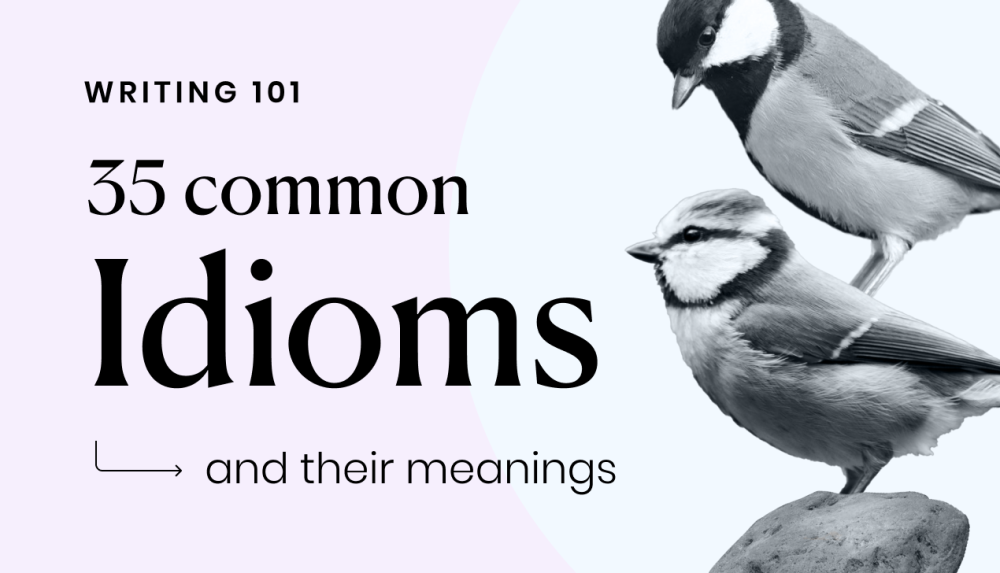
Before I shifted my house, I had a full list of idioms in English that I printed out and referred to whenever I put pen to paper. This was about a decade ago, around the time I finished college. Now, I frequently look up idioms online. If I like an idiomatic phrase in a movie or show, I quickly jot it down in my pocket-sized notebook or a sticky note.
You could say I’m obsessed with idioms. But, it’s a healthy obsession to be honest. Because idioms add life to your writing and help you succinctly explain things, there’s no reason not to use them.
Interested in coloring your writing with idioms? Let’s give a bookmark-worthy list of idioms alongside why you should be as obsessed with idioms.
What is an idiom?
Idioms are phrases or expressions that don’t literally mean what the individual words in the phrase stand for. Idioms emerge from an incident or past story. Overtime, however, they lose their meaning and become figurative.
For example : a piece of cake
The literal meaning of this is cake slice (lava cake, anybody?). But, when you use it as an idiom, you mean something that’s easy to do — that’s this phrase’s figurative meaning .
With the formal idioms definition out of the way, let’s look at some examples of idioms that you’ve probably already heard or used before:
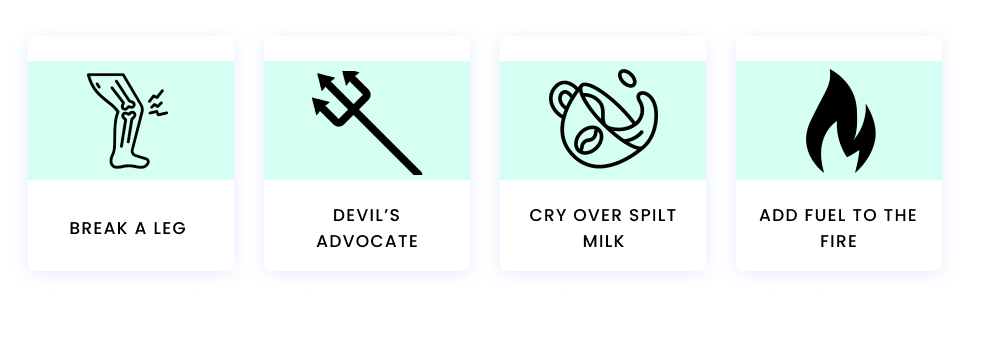
Fun fact: There are an estimated 25,000 idioms in English language. Talk about variety!
Why do we use idioms?
The short answer is: idioms add life to your writing. But exactly how do these groups of words polish your English ?
Here are five ways idiomatic expressions help you:
1. Idioms paint a visual picture for your readers
Even if it’s plain content that you’re working on – you can up your writing’s description game by using idioms.
Look at this example:

The idiom means having to choose from equally difficult paths. By using it, not only does the sentence sound better, but the particular idiom creates a visual picture in the readers’ mind. They can imagine Mara having to choose between sinking in the dark sea and the devil itself. Either way, Mara’s dead.
2. They add impact to your writing
In the example above, there’s a third favor that this idiom does to the sentence: it adds meaning.
Think of it like this: saying ‘choosing between equally unpleasant scenarios’ is dull and boring, even meh . And, it doesn’t leave much of an impact. But, when you, as a reader, imagine Mara standing between the ‘devil and the deep blue sea,’ you can tell things are gettin’ serious.
3. These expressions add humor to your writing
Besides adding flavor to otherwise dull writing, some idioms can help you brighten your readers’ mood.
Frankly, humor isn’t easy to work into your writing. Unless, you’re a master at cracking jokes. Most of us, however, aren’t good at that. So, instead of making a fool of ourselves, it’s better to pull out an idiom like the one below:

Literally, Sophie isn’t a chicken and, of course, she has her head intact. The idiom just means that like a panicked chicken, Sophie is running around in a haphazard manner. This is a funny, light-hearted way of explaining Sophie’s situation.
4. Idioms make you sound like native speakers
This is another good reason for slipping idioms into your writing. Every language has its own idioms that emerge from its culture. Or, they originate from stories specific to a region.
This means that if you want to impress a Brit English speaker , for example, you should use idioms of British origin. Some of these are:

Meaning: Asking someone to share their thoughts with you.

Meaning: A plan that didn’t work, requiring you to sketch it from the start.
If you’re into novel writing, you can draw on these region-specific idioms to write dialogue for a character from a particular region. So that’s another plus of using idioms.
5. They help you explain complex ideas simply and succinctly
Lastly, idioms can help you simplify ideas. Use an idiom instead of going into unnecessary details. In all the examples you’ve read so far, you’ll note that the idioms make it easy to explain something.
Take the idiom ‘back to the drawing board.’ Using it means you don’t need to rely on tons of words to explain that a plan went bust and now you’ve got to regroup and plan again. You can simply say, let’s go back to the drawing board.
Similarly, when you want someone to get to the point, you can simply say: stop beating about the bush.
Tips on using idioms
Convinced you need to work more idioms into your writing? Cool. We’ll give you a list of common English idioms in the next section to make things easy for you.
Plus, here are some things to keep in mind as you dabble into the use of idioms , an essential part of learning English :
Don’t overdo them
Some idioms are so over used they turn into clichés . Your writing is always better off without clichés as they’re unoriginal. So use idioms sparingly, where they help you summarize or deliver any of the benefits discussed above.
See if a specific detail would be better
For example, once in a blue moon is a good idiom. But, if you find that your readers can benefit from a detail like ‘someone visited on the third of every month,’ skip the idiom. Be specific instead.

Writer for Chrome
Clear, concise and error-free.
Install Writer for Chrome
Start your free 14-day trial
35 popular idioms and their meaning.
Ready to use idioms? Use this list:
- Beef up: To strengthen or increase something.
- Turn turtle: Turn turtle means to turn upside down or flip the side.
- Eager beaver: Someone who is all charged up or enthusiastic about a job is an eager beaver.
- Spill the beans: To tell something that was supposed to stay hidden or under wraps (yep, another idiom).
- Couch potato: Someone who binge watches Netflix, sitting on a couch all day – popcorn in hand.
- Hit the sack: This idiom is a fancy way of saying that someone’s tired and they’re going to sleep. You can also say hit the hay.
- Bite the bullet: To do something no matter how unpleasant it is.
- In the doldrums: When you’re sad or depressed, you’re in the doldrums. Once out of it, you can write: out of the doldrums.

- In fine fettle: In good health.
- A hot potato: A controversial topic that no one wants to discuss – same as no one wants to hold a hot potato.
- Go bananas: Go bananas is a fun way of saying someone’s excited or angry.
- An arm and a leg: When something’s overpriced, you can say it costs an arm and a leg. Alternatively, you can say: it costs a fortune or it costs a bomb.
- Under the weather: Slightly unwell or feeling low.
- Lose your touch: Literally, that’s losing your sense of touch. But the idiom doesn’t mean that, of course. It means you lose some skill or talent you previously had.
- Twist someone’s arm: To twist someone’s arm is to convince them to do something like a kid twisting their mum’s arm to get ice cream.
- Pie in the sky: Something that’s unlikely, therefore, wishful thinking.
- The ball in your court: Have two or more people or parties deciding on something and one side has made their move? Great, there’s only one party that’s to decide now and a good way to say that is: the ball in their court.
- Curiosity killed the cat: Sometimes prodding too much into a situation or question can get you into trouble. That’s what this idiom means.
- Bark up the wrong tree: Barking up the wrong tree is blaming the wrong person, following a wrong thought/plan, or looking in the wrong place.
- Hit the nail on the head: When you get something done perfectly, you hit the nail on the head. After all, it’s only when you hit the nail on the head that you can drill it in the right spot.
- The elephant in the room: The story behind this idiom is that a man walked into a museum and noticed every tiny thing there except for an elephant. Today, the phrase denotes a chief issue that everyone knows is present, but no one addresses it.
- Taste your own medicine: It’s when someone gets treated the way they’ve been treating others (good time to think of karma, no?).
- Steal someone’s thunder: Taking someone else’s credit or taking the spotlight when you don’t deserve it.
- Stab someone in the back: This one’s a snazzy way of saying you’re backbiting or planning against someone in their absence.
- Kill two birds with one stone: When you get two things done in one shot, you’re killing two birds with one stone. Example, I’m writing this piece and revising idioms too.
- Best thing since sliced bread: The idiom means hyped up enthusiasm in someone, something, or some idea.
- Bite more than you can chew: When you commit to more than you do/deliver, you’ve officially bitten more than you can chew.
- Every cloud has a silver lining: A good result after bad things.
- Look at the bright side: When you choose to see the positive in an overall bad situation (or may I say, shituation).
- You can’t judge a book by its cover: This means you can’t jump to conclusions only by looking at the cover or outward appearance.
- More holes than a Swiss cheese: Seeing holes in a story or plan? Congratulations, Sherlock! Now, voice your concern using this idiom.
- Don’t put all your eggs in one basket: It’s when you put all your resources or hopes (figuratively: eggs) in one source (basket).
- Get up on the wrong side of the bed: When you wake up in a bad mood.
- Everything but the kitchen skin: It means everything imaginable including the unnecessary stuff.
- Pick a bone with someone: To discuss something at length with someone.
--> “A wide screen just makes a bad film twice as bad.” -->
May Habib CEO, Writer.com
Here’s what else you should know about Ascending.
More resources

– 12 min read
Using editorial style guides with a remote team: interview with Alexandra Cote

Ashley Coolman

– 5 min read
Eliminating wordiness in writing helps your business
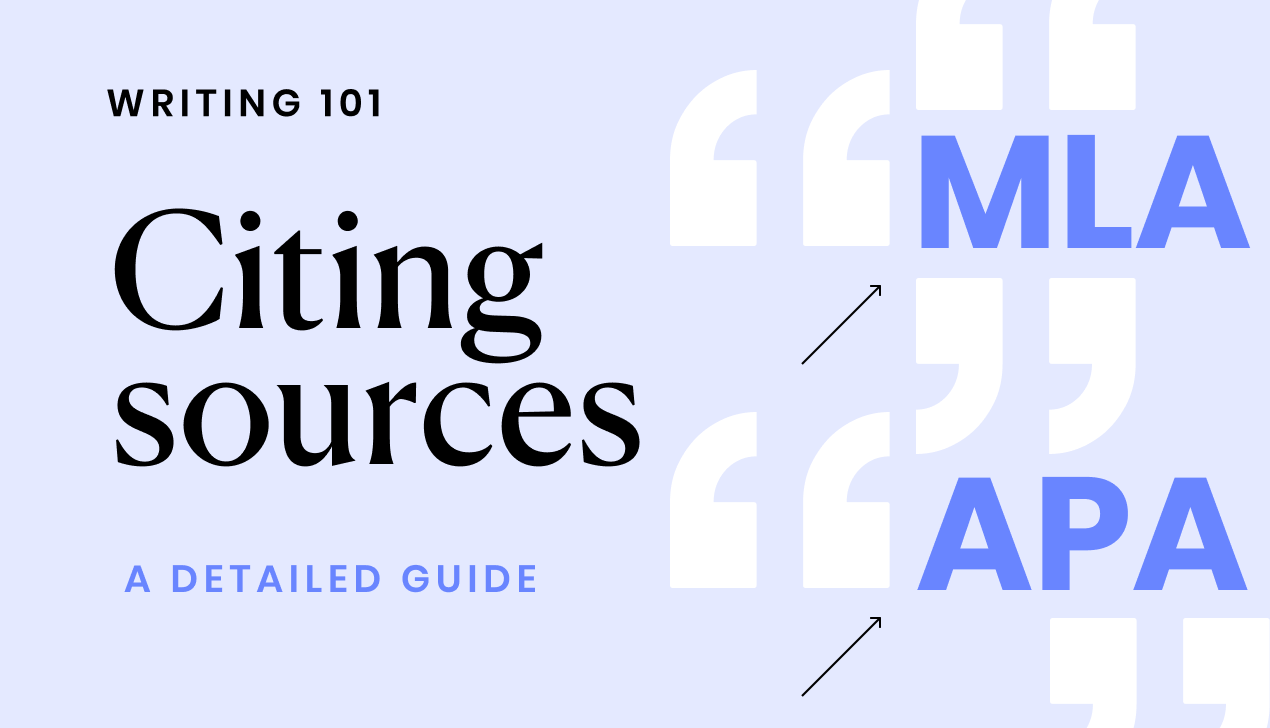
– 15 min read
A detailed guide to citing sources in MLA and APA

Jessica Malnik
What Is an Idiom? Definition and Examples

An idiom is a phrase that, when taken as a whole, has a meaning you wouldn’t be able to deduce from the meanings of the individual words. It’s essentially the verbal equivalent of using the wrong math formula but still getting the correct answer.
The phrase “kill two birds with one stone” is an example of an idiom. Fluent and native English speakers understand that this doesn’t refer to harming birds or using stones, but that someone is completing two tasks at once.
Our deep dive into this topic will define what an idiom is, go over the different types, help you understand how to use them in writing, and give you some examples.
Give your writing extra polish Grammarly helps you communicate confidently Write with Grammarly
Table of contents
What is an idiom?
4 types of idioms.
- Idiom vs. cliché
Idiom vs. proverb
- Idiom vs. euphemism
- How are idioms structured?
When are idioms used?
- Why are idioms challenging for language learners?
- Idiom examples
What is an idiom?
An idiom is a type of phrase or expression that has a meaning that can’t be deciphered by defining the individual words. Appropriately, the word “idiom” is derived from the ancient Greek word “idioma,” which means “peculiar phraseology.”
And that’s exactly what it is—a phrase that’s normal to fluent speakers (every language has its idioms) but strange to others.
People who struggle with idioms often can’t see the forest for the trees, which is itself an idiom used to describe someone who’s too involved with the details of a situation and can’t see the bigger picture at hand. It doesn’t involve any forests or trees.
To understand idioms is to see the forest for the trees, or to look at the phrase as a whole rather than focusing on the individual words.
Generally speaking, there are four types of idioms: pure idioms, binomial idioms, partial idioms, and prepositional idioms . Some people may consider clichés, proverbs, and euphemisms to be types of idioms as well, but we’ll explain why they are different from idioms.
1 Pure idiom
This is your typical idiom, the meaning of which can’t be deduced by its individual components. When someone says, “Spill the beans,” they’re asking someone to reveal a secret, not to pour out a can of beans. But you wouldn’t know that by looking at each word of that phrase.
2 Binomial idiom
This idiom is a phrase that contains two words joined by a conjunction or a preposition. Some examples include “by and large” (everything considered), “dos and don’ts” (guidelines on what to do and/or avoid in a certain situation), and “heart-to-heart” (a candid conversation between two people).
3 Partial idiom
This idiom is one that’s been shortened into one part, with the second part generally being understood by fluent speakers. People often use the partial idiom “when in Rome,” with the understanding that the other person knows the second part: “do as the Romans do.”
4 Prepositional idiom
This idiom is a phrase that combines a verb and a preposition to create a verb with a distinct meaning. The phrase “agree on” is a prepositional idiom that combines the verb “agree” with the preposition “on” and is used to express that you share an opinion with someone.
Idiom vs. cliché
A cliché can be an idiom, but an idiom is not always a cliché.
Clichés are expressions or phrases that are overused to the point where they lose their meaning and indicate a lack of original thought. For example, there are few people who feel better when they hear this after a breakup: “Don’t worry, there are plenty of fish in the sea.” That phrase has been used so often that it fails to have any impact.
A proverb is similar to an idiom in that its meaning can’t be deciphered by looking at the individual words, but it’s different because it’s used to give advice to someone else.
If someone says, “Don’t cry over spilled milk,” they’re telling the other person not to worry about something that has already happened. The phrase doesn’t mean someone is crying and has nothing to do with dairy.
So once again, a proverb can be an idiom, but an idiom is not always a proverb.
Idiom vs. euphemism
A euphemism is a type of idiom that’s used to discuss a sensitive or taboo topic in a polite or understated way. Even if you’re not personally made uncomfortable by a subject, there is still a chance you’re using euphemisms around it, simply because they’re common to the point of cliché . Topics like death, sex, and money have an abundance of euphemisms. For example, “he kicked the bucket” is a euphemism for “he died” (as well as an idiom).
How are idioms structured?
It’s difficult to define an idiom’s structure because it changes from language to language, and it even varies in different regions that speak the same language. Idioms have more to do with syntax —the specific order of words or phrases—than grammar. Remember that the ancient Greek word “idioma” means “peculiar phraseology,” so the rules for how to properly structure an idiom are unique to a specific region.
Most New Yorkers understand the phrase “it’s mad brick” to mean that it’s cold, but people elsewhere in the US may not understand what the phrase means because the combination of those words is unique to New York City.
Learning the structure of a particular region’s idioms takes time and is often achieved by speaking with people from that area.
When are idioms used?
A speaker or writer often uses idioms to convey a message to someone else in a more creative way. Think of them as a type of spice that prevents your conversation or writing from being too bland. So instead of saying “you’re correct” several times, you might throw in “you hit the nail on the head” or even “bingo” for a little variety.
When are idioms used in writing?
As mentioned above, idioms can be used to prevent your writing from appearing too dry or formal, but they can also be used to help the writer connect with the reader.
If you were writing for a Texan audience, and you wanted to describe something as large, you wouldn’t just say that. Instead, you would say it’s “bigger’n Dallas,” which means it’s very big. This shows the reader that you have a familiarity with the topic you’re writing about.
Other types of idiomatic usage
There is another type of idiomatic usage used by fluent English speakers, and it’s called collocations, or a combination of words that have a specific meaning.
In English, it’s common to describe a backup of cars on the highway as “heavy traffic.” It’s not common to describe it as “crowded traffic.” Although the phrases could reasonably be interpreted the same way, the collocation “heavy traffic” simply “sounds right” to English speakers.
Why are idioms challenging for language learners?
Idioms are challenging for language learners because their meanings can’t be deciphered from the meanings of the individual words. It’s like giving someone a jigsaw puzzle containing pieces that look like one thing, only for the finished product to be something else entirely.
But as we mentioned before, that’s also true of people from different parts of the same country who speak the same language.
Because there are no steadfast rules for idioms, the only way for language learners to become familiar with them is to speak with native speakers and have them explained.
Idiom examples
Here are some common idioms in the English language, along with their meaning.
Under the weather Meaning: Not feeling well
Break a leg Meaning: To wish someone good luck
Once in a blue moon Meaning: Rarely
The ball is in your court Meaning: A decision is up to you
You can say that again Meaning: That is true
Beat around the bush Meaning: To avoid saying something
Hit the sack Meaning: To go to bed
Kick the bucket Meaning: To die
By the skin of your teeth Meaning: Barely made it
An idiom is a figurative phrase that, when taken as a whole, has a meaning you wouldn’t be able to deduce from the meanings of the individual words.
How do idioms work?
Idioms work based on a language’s syntax—the particular order of words or phrases—and can vary depending on what region of a country you’re in.
Idioms are used by a writer to make their work seem more creative and casual and help show mastery of a particular language.
What’s the difference between an idiom and a cliché?
A cliché is a type of idiom that is so overused that its meaning loses any significance and often indicates a lack of original thought on the part of the writer.

Are you seeking one-on-one college counseling and/or essay support? Limited spots are now available. Click here to learn more.
50 Common English Idioms and their Meanings (with Examples)
July 5, 2023
I studied German as an undergrad. I memorized the cases and disorienting verb placement, and after four semesters, I felt pretty slick. But then I went to Germany and didn’t understand a thing. My theory is that my cluelessness had something to do with the prevalence of idioms in German. Before we look at common English idioms and 50 idom examples, I’d encourage you to hold your horses (which is also #24 below) and first read the definition of precisely what an idiom is.
What is an idiom?
Idioms are phrases that can’t be understood by looking at the meanings of the words individually. Idioms are therefore an example of figurative language . What were people talking about when they said, “Ich verstehe nur Bahnhof” (literally: I only understand train station ), or, “Ich hab Schwein gehabt” (literally: I had a pig )? I knew what the words meant, but the meanings of the sentences as whole units remained a mystery. Of course, Germans aren’t the only ones who use idioms to get their points across (hey—there’s an idiom!). English is chock full of them (there’s another). What follows is a list of common English idioms, their meanings, and their sometimes funky backstories.
50 Common English Idioms
1) A dime a dozen: If something is a dime a dozen, it’s common, easy to come by, or not of much value—you can get a dozen of them for just ten cents! Fitness YouTubers are a dime a dozen these days .
2) A slap on the wrist : A slap on the wrist is a mild or inconsequential punishment, especially when a more severe punishment is warranted. The company had to pay a fine after causing the oil spill—a slap on the wrist!
3) All Greek to me : I thought I was going to understand German after studying it for years, but once I was in Berlin, it was all Greek to me. I didn’t understand a word of it. When something is all Greek to you, you can’t understand what is being said.
4) A bird in the hand is worth two in the bush : This is one of the many common English idioms that are intuitive when you break it down. It typically stands alone, and means that it’s better to keep something you already have than it is to risk it by trying to get something better.
Examples of Idioms (Continued)
5) Achilles’ heel : An Achilles’ heel is a weakness or vulnerability that could lead to failure. For example: I’ve been trying to reduce the time I spend on my phone, but YouTube is my Achilles’ heel. The idiom comes from Greek mythology. Thetis, Achilles’ mom, grabbed her big boy by the heel and dipped him in the River Styx, which was said to confer the power of invincibility. But because she was holding his heel, that part of Achilles didn’t get wet. Fast forward to the Trojan War: Achilles takes an arrow to the you-know-what, and that was that.
6) At the drop of a hat : If something’s done at the drop of a hat, it means it was done quickly, without hesitation. My friend John, for example, will start singing at the drop of a hat . The phrase has its roots in the 19th century when the drop of a hat was used to signify the start of a fight or race .
7) Barking up the wrong tree : If you’re barking up the wrong tree, you’re wrong, or mistaken about something. When I ask a coworker if I can take Friday off, he might tell me that I’m barking up the wrong tree—he doesn’t have the authority to give me a day off; I’d need to ask my manager instead.
8) To beat around the bush : To beat around the bush is to avoid an important, or difficult, part of a conversation. When you implore someone not to beat around the bush, you’re asking them to be direct, to get to the issue. As far as historians know, the phrase was first used in a hunting context in the 1440s . Hunters would beat around a bush to lure out their prey in the bush.
9) To be behind the eight ball : If you’re behind the eight ball, you’re at a disadvantage, or in trouble. I’m really behind the eight ball; my project is due in two days and I haven’t even started it .
10) (To be stuck) between a rock and a hard place : When you’re between a rock and a hard place, you’re in the uncomfortable position of having to choose between two equally unappealing or difficult options. If, for example, you hate your job, but don’t want to quit because you’d lose your insurance, you’re stuck between a rock and a hard place.
11) Beyond the pale : When something is beyond the pale, it’s unacceptable or immoral. “Pale” has an obscure meaning —“a wooden stake, fence, or area within a certain jurisdiction.” This suggests that anything beyond the pale is uncivilized. His behavior has been beyond the pale lately.
Common English Idioms (Continued)
12) To bite the bullet : When you bite the bullet, you decide to do something unpleasant that you’ve been avoiding. I really don’t want to go to the DMV today, but I’ll bite the bullet and get it over with .
13) To break a leg : This is one of those common English idioms that’s super specific and, at first glance, completely nonsensical. It’s really only used to wish someone luck before they perform—a play, concert, etc. It’s thought that the theater community, being a bit superstitious, believed saying “good luck” was actually bad luck . Somehow, they landed on “break a leg” instead. Break a leg! I can’t wait to hear your new songs.
14) To break the ice : To break the ice is to ease the tension or awkwardness amongst people who’ve just met. Let’s play a game to break the ice .
Common English Idioms 50 Examples (Continued)
15) (To score) brownie points : Brownie points are imaginary, but they’re doled out when someone has done a good deed, or earned favor in the eyes of another. Personally, I earn my brownie points by offering to do the dishes whenever I’m a guest in someone’s home. The phrase is a common American idiom—it goes back to the youngest class of Girl Scouts, called Brownies.
16) By the skin of your teeth : I’m including this one because it’s one of those totally bizarre common English idioms. When you do something by the skin of your teeth, you’ve just barely managed to do it. The sitting senator won reelection by the skin of her teeth —she won by an extremely close margin. The idiom goes all the way back to the Book of Job in the Old Testament of the Bible.
17) Butterflies in my stomach : When you have butterflies in your stomach, you’re nervous. Nervy anticipation really does feel like butterflies flapping around in your belly. I always get butterflies in my stomach before I go on a long trip.
18) To bury the hatchet : When you make peace, settle a dispute or fight, or come to an agreement to end a conflict, you’ve buried the hatchet. The phrase has its roots in Native American custom : it was Iroquois tradition to bury their weapons—literally—in times of peace.
19) (To have) a chip on your shoulder : When someone has a chip on their shoulder, they’re angry or indignant because they believe they’ve been treated unfairly in the past. Gary’s had a chip on his shoulder ever since he was passed over for that promotion .
20) To get cold feet : If you get cold feet, you’ve lost the courage to do something. True story: I once convinced my dad to get a tattoo with me, but he got cold feet at the last moment and backed out.
21) (To quit something) cold turkey : To quit something cold turkey—or go cold turkey—is to stop doing something abruptly. It’s not quite known where the phrase comes from, but there are several compelling theories. One suggests that the withdrawal symptoms experienced when coming off certain drugs—goosebumps, chills— evoke images of a cold, raw turkey . I’m a bit of a coffee addict, and when I tried to quit cold turkey, I started to get nasty headaches.
22) Elephant in the room : The elephant in the room is a problem that everyone knows about but that no one wants to acknowledge. The fact that the politicians had flown on private jets to the conference on carbon emissions was the elephant in the room .
23) Grasping at straws : When someone grasps at straws, they’re attempting to do something that has a low probability of succeeding. I kept looking for the ring, but I was grasping at straws; deep down, I knew it was gone . The phrase comes from Thomas More , who wrote, “A drowning man will clutch at straws.” Here, “straws” probably refer to reeds growing in the water—not much use to that drowning man.
24) Hold your horses : This common English idiom means to be patient or wait. Hold your horses! I’m not ready to go yet.
25) Tongue in cheek : When you say something tongue in cheek, you’re being sarcastic, ironic, jokey, or otherwise unserious. The idiom’s roots are literal-ish: it’s thought that pushing one’s tongue into the cheek was a gesture used to indicate sly irony or humorous insincerity .
26) There are more ways than one to skin a cat : This common English idiom is brutal, but one that I find myself using often. It means that there is more than one way to accomplish something. For example: My doctor told me I need to lose some weight, but there are more ways than one to skin a cat. She said I could either change my diet, take up jogging, or begin lifting weights .
27) To think outside the box : When you think outside the box, you’re thinking in a creative, innovative, or unconventional way. The company prided itself on its ability to think outside the box, but in reality, it was just recycling a decades-old idea .
28) To strike while the iron is hot : It’s usually a good idea to strike when the iron is hot, which means to take advantage of an opportunity. Picture a blacksmith: they’ve got to shape the iron while it’s still hot, before it cools. We should strike while the iron is hot and make an offer before the price goes up.
29) To push the envelope : Pushing the envelope is approaching or going beyond the limits of what is possible. This common English idiom can have a positive connotation— The artist has been pushing the envelope in her recent work —or a negative— The unruly student was really pushing the envelope with his teacher .
30) Silver lining : A silver lining is a benefit or advantage that comes from a negative or difficult situation. Accidentally dropping my phone in the toilet had a silver lining: I stopped spending so much time on social media.
31) To move the goal posts : Moving the goal posts means changing the rules or expectations to advantage oneself. The administration said it was going to raise the minimum wage to $15/hour. But, now they’re saying that’s too high—they’re moving the goalposts!
Common English Idioms Examples (Continued)
32) To have skin in the game : If you have skin in the game, you’re personally invested (financially, emotionally, etc.) in its success. He kept telling me how I should be spending my money, but he has no skin in the game .
33) The ball is in (your, someone’s) court : When the ball is in someone’s court, it’s up to them to make the next move. The ball is in their court. I said my offer was final, so now they can either choose to accept or decline .
34) In the ballpark : When you’re in the ballpark, you’re approximately correct. As you can see, a number of common English idioms are sports-derived. My first guess wasn’t even in the ballpark—I was way off!
35) Like pulling teeth : When something is like pulling teeth, it’s extremely difficult to do because you—or someone else—doesn’t want to do it. Forcing myself to sit down and write is like pulling teeth sometimes .
36) To play it by ear : When you play something by ear, you’re doing it without plan; you’re improvising. The phrase comes from music: when musicians play something by ear, they’re playing without reading sheet music. When I travel to a new place, I don’t like to make an itinerary. I prefer to play it by ear .
37) (To jump, get, or be) on the bandwagon : When you jump on a bandwagon, you begin to participate in a popular activity or trend. This common American idiom has a bit of a negative aftertaste: it suggests doing something just because everyone else is. I urged my friends not to jump on the TikTok bandwagon .
38) Six of one, half dozen of the other : When two choices are six of one, half dozen of the other, they will both result in the same outcome. Whether we take an Uber or drive ourselves is six of one, half dozen of the other—we’re going to be sitting in traffic for a while.
39) To pass the buck : To pass the buck is to shift the responsibility or blame to someone else. It’s usually used in a pejorative way. For example: Don’t try to pass the buck; paying the electric bill was your responsibility, not mine .
40) To shoot the breeze : Shooting the breeze is chatting, making small talk, conversing aimlessly without a serious subject. The two old friends sat on the porch and shot the breeze .
41) To spill the beans : If you’ve spilled the beans, you’ve revealed a secret. One origin story goes back to ancient Greece , where votes were cast using white or black beans. If someone spilled the beans, onlookers could easily figure out who’d won the election. I was planning a surprise party for my brother, but my parents spilled the beans .
42) To be a piece of cake : When something is a piece of cake, it’s super easy. The homework assignment was a piece of cake .
What is an Idiom? (Continued)
43) To take a rain check : To take a rain check is to politely decline an invitation, with the implication that you might accept later. Can we take a rain check on that? I’m busy this week .
44) To get something off one’s chest : When you get something off your chest, you publicly admit to something that’d been worrying you or making you feel guilty. Wow, it feels great to get that off my chest .
45) (To feel) under the weather : When you feel under the weather, you’re sick, not feeling well. I can’t come in to work today; I’m feeling under the weather .
46) To not see the wood for the trees : If you don’t see the wood for the trees, you’re failing to assess the whole situation or problem because you’re too focused on minute details. He was so focused on the design of the wallpaper, but the entire house was about to crumble—he couldn’t see the wood for the trees .
47) Once in a blue moon : When something happens once in a blue moon, it happens rarely. This is a once-in-a-blue-moon opportunity!
48) To put your foot in your mouth : When you put your foot in your mouth, you say something embarrassing, inappropriate, or tactless. I shouldn’t have mentioned that—I really put my foot in my mouth .
49) Rule of thumb : A rule of thumb is a heuristic, or approximate guide for doing something. For example: my partner and I just adopted a kitten, and the vet told us, as a rule of thumb, to expect the kitten to start eating solid food by the age of 5 weeks. That might not always happen, but it’s a good general guideline.
50) To take (someone’s advice) with a grain of salt : This is one of those common English idioms that has a not-so-clear backstory . It means to be skeptical because the information one is getting could be faulty or dubious. She always exaggerates—take what she says with a grain of salt .
Common English Idioms 50 Examples – Additional Resources:
If you enjoyed our list of the 50 idioms high school students must know, you may also wish to check out the following College Transitions blogs:
- 250 SAT Vocab Words
- 130 GRE Words You Must Know
- 20 Rhetorical Devices High School Students Should Know
- 10 Ways to Improve Your Public Speaking Skills
- High School Success
Dane Gebauer
Dane Gebauer is a writer and teacher living in Miami, FL. He received his MFA in fiction from Columbia University, and his writing has appeared in Complex Magazine and Sinking City Review .
- 2-Year Colleges
- Application Strategies
- Best Colleges by Major
- Best Colleges by State
- Big Picture
- Career & Personality Assessment
- College Essay
- College Search/Knowledge
- College Success
- Costs & Financial Aid
- Data Visualizations
- Dental School Admissions
- Extracurricular Activities
- Graduate School Admissions
- High Schools
- Law School Admissions
- Medical School Admissions
- Navigating the Admissions Process
- Online Learning
- Private High School Spotlight
- Summer Program Spotlight
- Summer Programs
- Teacher Tools
- Test Prep Provider Spotlight
“Innovative and invaluable…use this book as your college lifeline.”
— Lynn O'Shaughnessy
Nationally Recognized College Expert
College Planning in Your Inbox
Join our information-packed monthly newsletter.
An Artificial Intelligent English Learning Platform
6 Best Idioms For Essay Writing
English Idioms for Essay Writing, expressions, and proverbs are an essential part of the English language, both spoken and written English are saturated with them.
For people learning English idioms are confusing to understand, the reason being Idioms don’t make objective sense.
To learn the meanings and usage of idioms for Essay Writing, ESL students must practice and familiarize themselves with their everyday usage.
The team at Lillypad understands the pain and difficulties English Learners run across comprehending the true meaning and suitable usage. This list of idioms for Essay Writing makes learning simple, with common Essay Writing idioms, definitions, and example sentences that make the meaning clear.
Learning to use common idioms and expressions will make your English sound more native, so it’s a good idea to master some of these expressions with daily practice, so bookmark this page or share it with your friends; now let us learn about idioms for Essay Writing together.
Idioms for Essay Writing with Meanings, Definitions & Example Sentences
1. to sugarcoat, definition and meaning: to sugarcoat.
The expression “to sugarcoat” means to make something more palatable or attractive by adding a layer of sweetness.
To Sugarcoat Example Sentences:
- She tried to sugarcoat the bad news, but it was still difficult to hear.
- He was trying to sugarcoat the truth, but I could tell he was lying.
- She was trying to sugarcoat the situation, but I could tell she was really upset.
- He was trying to sugarcoat the facts, but I could tell he was hiding something.
- She was trying to sugarcoat the reality of the situation, but it was still pretty grim.
2. The Pot Calling The Kettle Black
Definition and meaning: the pot calling the kettle black.
The expression “the pot calling the kettle black” is used to describe a situation where someone is criticizing another person for a fault or flaw that they have themselves.
The Pot Calling The Kettle Black Example Sentences:
- You’re telling me I’m too judgmental. That’s the pot calling the kettle black!
- You’re accusing me of being selfish. That’s the pot calling the kettle black!
- You’re saying I’m too critical. That’s the pot calling the kettle black!
- You’re telling me I’m too controlling. That’s the pot calling the kettle black!
- You’re saying I’m too nosy. That’s the pot calling the kettle black!
3. Stay The Course
Definition and meaning: stay the course.
This expression means to pursue or fulfill an objective until it’s finished despite its difficulty.
Stay The Course Example Sentences:
- I think if we stay the course, we’ll reap the benefits.
- Listen to me and just stay the course. You’re doing great.
- We’re here to stay the course, so don’t worry about us.
- This can get dicey, but I know if we stay the course, we will succeed.
- Can you imagine if we didn’t stay the course? We’d still be bankrupt.
4. Don’t Put All Your Eggs In One Basket
Definition and meaning: don’t put all your eggs in one basket.
This expression is often used to caution against putting all of one’s resources into a single venture.
Don’t Put All Your Eggs In One Basket Example Sentences:
- When investing, it’s important to diversify your portfolio so you don’t put all your eggs in one basket.
- When it comes to job hunting, don’t put all your eggs in one basket Apply to multiple companies to increase your chances of getting hired.
- Don’t put all your eggs in one basket when it comes to finding a new place to live Look at multiple options before making a decision.
- Don’t put all your eggs in one basket when it comes to finding a new car Shop around and compare prices to get the best deal.
- Don’t put all your eggs in one basket when it comes to finding a new business partner Meet with multiple potential partners before making a decision.
5. Don’t Judge A Book By Its Cover
Definition and meaning: don’t judge a book by its cover.
The expression means that you should not judge something based on its appearance.
Don’t Judge A Book By Its Cover Example Sentences:
- Just because someone looks unapproachable, doesn’t mean they don’t have a kind heart Don’t judge a book by its cover.
- Don’t be fooled by the flashy exterior of the car It may look nice, but it could be a lemon. Don’t judge a book by its cover.
- Don’t be so quick to judge the new employee She may not have the most impressive resume, but she could be a great asset to the team. Don’t judge a book by its cover.
- Don’t be so quick to dismiss the new restaurant in town It may not look like much from the outside, but the food could be amazing. Don’t judge a book by its cover.
- Don’t be so quick to judge the new student in your class He may not be the most outgoing person, but he could be a great friend. Don’t judge a book by its cover.
6. Where There’s A Will, There’s A Way
Definition and meaning: where there’s a will, there’s a way.
The expression “where there’s a will, there’s a way” means any obstacle or problem can be overcome with a strong will or determination.
Where There’s A Will, There’s A Way Example Sentences:
- Where there’s a will, there’s a way, so we’ll figure it out.
- No one was expecting him to solve the issue, but where there’s a will, there’s a way.
- The new system posed a serious problem. But where there’s a will, there’s a way.
- I believe that where there’s a will, there’s a way, so we’ll find a way through this.
- You know where there’s a will, there’s a way, right? So use your head.
Learn from History – Follow the Science – Listen to the Experts
What’s the one thing that makes LillyPad so special? Lilly! She is a personal English tutor, and has people talking all over the world! Lilly makes improving your English easy. With Lilly, you can read in four different ways, and you can read just about anything you love. And learning with Lilly, well that’s what you call liberating!
For learners of all ages striving to improve their English, LillyPad combines the most scientifically studied and recommended path to achieving English fluency and proficiency with today’s most brilliant technologies!
Additionally, the platform incorporates goal-setting capabilities, essential tracking & reporting, gamification, anywhere-anytime convenience, and significant cost savings compared to traditional tutoring methodologies.
At LillyPad , everything we do is focused on delivering a personalized journey that is meaningful and life-changing for our members. LillyPad isn’t just the next chapter in English learning…
…it’s a whole new story!
Do you want to improve your English? Visit www.lillypad.ai .
Follow us on Facebook or Instagram !
William Landry
William is a professional English and ESL teacher with over 15 years of experience. He has taught students of all ages, from children to business executives, and has worked with ESL learners from all over the globe. With a degree in English Education, William has developed curriculum for learners of all levels and interests. He is passionate about helping people learn English effectively and shares his knowledge with the LillyPad community. When he’s not teaching or writing, William enjoys spending time with his wife and two young children.
Related Articles
8 ways to improve your english by reading what you love with an ai tutor, how to read like a professional, what are the benefits of reading aloud, the world of online book clubs, improve your english faster with lilly an artificial intelligent tutor.
Latest Posts
Understanding YLTE: Importance of English Test for Young Learners
Top 10 errors in english proficiency tests & how to avoid them, challenges in english proficiency tests for language learners.
FLUOROSCOPE LANGUAGE CALCULATOR
How long will it take you to improve your English?
Design, write and practice your own phrases or learn 3,500+ premade English phrases with Lilly!
© 2023 LillyPad.Ai
What is an Idiom: A Comprehensive Guide to Unraveling Tricky Phrases

Did you know that many common idioms in English have intriguing origins deeply rooted in history? Take, for example, the phrase 'raining cats and dogs,' which we often use to describe a heavy rainstorm. Its origin is believed to trace back to the 17th century when houses had thatched roofs. During heavy rains, animals seeking shelter, such as cats and dogs, would fall from the roof, giving the impression that it was literally raining them. This peculiar image stuck in people's minds, and the phrase 'raining cats and dogs' became a colorful way to describe a torrential downpour. This fascinating connection between idioms and historical events adds a layer of intrigue to our language, making it not only a means of communication but also a gateway to unraveling the captivating tales behind everyday expressions.
What Is an Idiom: Short Description
In this article, our essay writers online will explore a long list of idioms and their meanings. We'll also take a close look at their different types. So, whether you have a passion for language or simply find yourself curious about how we communicate, we invite you to select your favorite example of an idiom as we uncover the fascinating array of expressions that never cease to amaze and inspire us.
What Is an Idiom: Insight into Figurative Language
The word 'idiom' originates from the Greek word 'idios,' which denotes 'one's own' or 'private.' It is like a hidden treasure chest of language, filled with colorful expressions that add spice and creativity to our everyday conversations. It's a phrase or a group of words that doesn't have a literal meaning but is instead used to convey a figurative or symbolic message. These expressions are unique cultural gems that reflect the rich tapestry of a language.

Imagine someone saying, 'It's raining cats and dogs!' instead of simply stating that it's raining heavily. This peculiar expression captures the intensity of the rain in a whimsical and memorable way. Another fascinating phrase is 'to kick the bucket,' which means to die. Although it might sound strange, this phrase dates back to medieval times when people would stand on buckets to hang themselves.
Fun fact: There are an estimated 25,000 examples of these expressions in the English language, showcasing the incredible variety and creativity that exists within our linguistic heritage. From 'a piece of cake' to 'raining cats and dogs,' idioms make our language more vivid, engaging, and downright fun!
Types of Idioms: An In-Depth Look at Different Categories
Idioms are fascinating examples of figurative language that add color and depth to our conversations and writing. They are expressions that have a figurative meaning that is different from their literal interpretation. In this section, our coursework writing service will explore different categories of idioms and provide examples for each type.

Pure idioms are expressions that have a figurative meaning that cannot be deduced from the individual words used. These idiomatic expressions are so deeply embedded in the language and culture that native speakers inherently understand their meaning.
For example:
- 'Break a leg' means 'good luck' in the performing arts industry.
- 'Bite the bullet' means to face a difficult or unpleasant situation with courage.
Binomial Idiom
They are idiomatic expressions that consist of two words or phrases linked by a conjunction such as 'and' or 'or.' These phrases are commonly used in day-to-day conversations to convey messages more vividly.
- 'Back and forth' means to move in a backward and forward motion.
- 'Safe and sound' means to be in a state of safety and without harm.
Partial Idiom
They are expressions that consist of one or more words that are idiomatic, while the rest of the phrase or sentence has a literal meaning. Studying idioms definition and examples is crucial as they often rely on context and cultural knowledge to be correctly understood.
- 'In a pickle' means to be in a difficult or troublesome situation.
- 'Under the weather' means to be feeling unwell or sick.
Prepositional Idiom
They are expressions that consist of a preposition followed by a noun or noun phrase, often having a figurative meaning that cannot be inferred from the individual words used.
- 'On cloud nine' means to be extremely happy or elated.
- 'In the doghouse' means to be in trouble or disfavored.
Are You Ready to Rock Your Readers' World?
Don't let your writing be as dry as a desert! Order your essay now and watch your words waltz off the page!
Sample Essay with Idioms
Here's an essay example brimming with idioms to illustrate how seamlessly they can be incorporated into the context of your narrative, enhancing its vividness and beauty.
Why Do We Use Idioms: Exploring the Purpose and Benefits
Why do we use idioms in writing? In short, they add life to your writing. These colorful phrases polish your English by infusing it with creativity, depth, and personality. They are indispensable tools for enhancing your expression. Here are some benefits they offer:
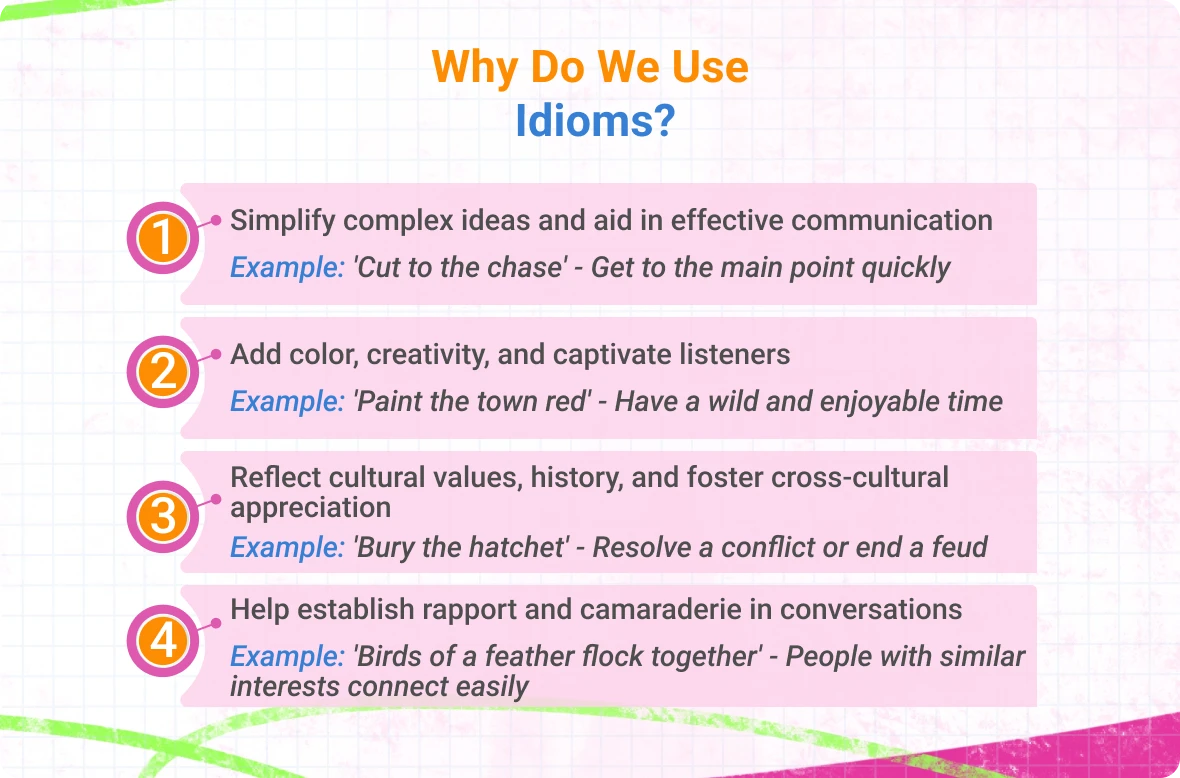
- Expressing Abstract or Complex Ideas
Idioms provide a shortcut to communicate ideas that may be challenging to express directly. In other words, they serve as a linguistic bridge, allowing us to convey nuanced meanings in a succinct and impactful way. Such transition sentences enhance our ability to convey complex thoughts effortlessly.
For example, the expression 'the ball is in your court' is commonly used to indicate that it is someone else's turn to take action or make a decision. While the literal meaning may seem unrelated, this idiomatic expression creates a smooth transition that conveys the idea of responsibility or decision-making being shifted to another person. This idiomatic phrase exemplifies how they contribute to making language richer and more expressive. In essence, they serve as linguistic connectors that enhance our ability to communicate effectively.
- Adding Color and Creativity to Language
They add color and creativity to language, making it more engaging and enjoyable. Through their unusual or imaginative manner, they can captivate listeners or readers. These phrases often have a poetic quality and can evoke emotions or create a sense of imagery.
For instance, the idiom in English, 'barking up the wrong tree,' is used to suggest that someone is pursuing the wrong course of action or directing their efforts toward an unproductive endeavor. The image of a barking dog at the base of the wrong tree creates a memorable and vivid expression of this concept.
- Enhancing Cultural Understanding
Idioms are deeply rooted in culture, and understanding them can provide insights into a community's values, beliefs, and history. Metaphors and analogies embedded in idiomatic expressions often reflect the cultural context in which they originate, including references to historical events, folklore, or specific traditions.
By studying these figures of speech from different cultures, we gain a deeper understanding of the nuances and subtleties of language. This understanding can foster cross-cultural appreciation and encourage communication between people from different backgrounds.
- Establishing Rapport and Camaraderie
Using idioms in conversation can help establish rapport and camaraderie with others. When two people share an understanding of idiomatic expressions, it creates a sense of connection and mutual understanding. When curious about 'what is an idiom?', remember that it can also serve as a conversation starter or icebreaker, sparking curiosity and engagement.
Furthermore, such sayings can be humorous, and sharing a funny idiom or using one in a lighthearted manner can foster a sense of camaraderie and lighten the mood in a conversation.
How Are Idioms Structured: Exploring the Anatomy of Expressive Phrases
Idioms are expressions or phrases that have figurative meanings that are different from the literal meanings of the individual words. They often reflect the cultural and linguistic nuances of a specific region. While their structure can vary, they typically follow certain patterns or formats within a language or region.
For example, in some regions of the United States, the phrase 'raining cats and dogs' is commonly used to describe heavy rain. The structure of this expression follows a pattern of combining two unrelated objects (cats and dogs) to convey a specific meaning (heavy rain).
However, they can also have unique structures that are specific to a particular region, as mentioned in the previous text. Here's another example:
In the Australian Outback, the idiom 'flat out like a lizard drinking' is used to describe someone who is extremely busy or working very hard. The structure of it includes the comparison of being 'flat out' (meaning very busy) to a lizard drinking (depicting a lizard lying flat on the ground while drinking water).
So, while these figures of speech may have some general patterns in their structure within a language or region, they can also have unique and peculiar structures that reflect the specific cultural context in which they are used.
In the meantime, if you find yourself still struggling with writing in AMA citation format , allow us to take care of the challenging aspects while you delve deeper into exploring idioms!
Tips on Using Idioms
Using idioms in writing can add depth and color to your language. Here are some tips to help you effectively incorporate such phrases into your conversations and writing:
Understand Idiomatic Variations
Idioms can vary in their wording and usage across different regions and cultures. So, next time you wonder how to title an essay with an idiom, be aware of these variations to ensure accurate communication. Some idiomatic expressions may have similar meanings but different phrasing. For example, in American English, the phrase 'kick the bucket' means to die, while in British English, 'pop your clogs' is equivalent.
To broaden your understanding of idiomatic variations, you can explore online resources and language forums or consult native English speakers of different dialects. Understanding these variations will help you communicate more effectively and avoid misunderstandings.
Blend Idioms with Context
While these figures of speech can be powerful tools for expression, it's crucial to use them appropriately in the context. Consider the following when using them:
- Familiarity : Make sure the person or audience you are communicating with is familiar with the idiom you are using. If they don't understand the phrase, it may confuse or alienate them.
- Relevance : Ensure that the saying you choose is suitable for the situation or topic at hand. Using it that doesn't fit the context may create confusion or make your language sound forced.
- Tone : Pay attention to the tone of your communication. Some idioms may be more casual or informal, while others may be more formal. Use those that align with the tone you want to convey.
For example, if you're writing an academic essay, it's best to avoid colloquial idioms and instead focus on using precise and formal language appropriate for the context.
Create Your Own Idioms
Idioms are not set in stone. Feel free to get creative and come up with your own idiomatic expressions. By creating your own sayings, you can add a personal touch to your language and enhance your ability to express unique thoughts or emotions. Just make sure that your phrases are clear and understandable to your intended audience.
For example, instead of saying, 'I'm feeling tired,' you could create your own expression by saying, 'I'm running on fumes.' This expression conveys the idea of extreme fatigue in a more vivid and memorable way.
How to Use Idiom in Essay
When curious about how to start an essay with an idiom, it is important to strike a balance between its appropriate usage and the overall clarity and coherence of your writing. Carefully consider the purpose and target audience of your essay to ensure that idioms enhance rather than hinder your message.
Purposes of Using Idioms in an Essay:
- Expressive Language : Idioms can add color, vividness, and expressiveness to your writing. They help you convey complex ideas or emotions in a concise and impactful manner, making your essay more engaging and memorable.
- Cultural Relevance : They are deeply rooted in a specific language and culture. Including them in your essay can demonstrate your understanding of cultural nuances and enrich your writing, especially when discussing topics related to traditions, customs, or local experiences.
- Enhancing Creativity : They can infuse creativity into your writing by using figurative language. They provide an opportunity to think outside the box and craft imaginative descriptions, allowing your essay to stand out and captivate the reader's attention.
- Communicating Familiarity : They are often used in everyday speech, and incorporating them into your essay can create a sense of familiarity and relatability with your audience. This can help establish a connection and make your writing more approachable.
- Adding Depth and Nuance : These sayings carry underlying meanings that extend beyond their literal interpretations. By utilizing idioms, you can add depth and nuance to your arguments or analysis, contributing to a more sophisticated and nuanced essay.
- Engaging and Memorable : They can make your essay more interesting and memorable by providing distinct and colorful language.
- Cultural Understanding : Utilizing them shows your familiarity with the language and culture, highlighting your appreciation for diverse expressions and perspectives.
- Expressive Communication : They express complex ideas succinctly, allowing for more effective communication of your thoughts and arguments.
- Misinterpretation : Many idioms can be ambiguous and subject to misinterpretation, especially if the reader is unfamiliar with them. This may lead to confusion or a loss of clarity in your essay.
- Inappropriate Usage : Some of them may not be suitable for formal writing or academic contexts. Improper usage can undermine the credibility and professionalism of your essay.
- Language Barriers : Idioms tend to rely heavily on the cultural and linguistic context in which they are used. If your essay targets an international audience, these sayings may pose a barrier to understanding and hinder effective communication.
- Overuse and Clutter : Excessive or forced use of them can clutter your writing, making it sound contrived or distracting the reader from the main points you are trying to convey.
Idioms Examples: Exploring Their Symbolic Meaning
Below, you'll find an exciting list of idioms and their meanings. Brace yourself for a linguistic adventure like no other!
- 'The apple of my eye' - Someone or something cherished or loved deeply. Example: In the movie 'The Lion King,' Mufasa tells Simba, 'You are the apple of my eye, Simba.'
- 'When pigs fly' - Something that is highly unlikely or improbable. Example: In the movie 'Shrek,' Donkey says, 'Yeah, right! Like that's ever gonna happen! When pigs fly!'
- 'Bend over backward' - Making a great effort to accommodate or help someone. Example: In the TV show 'Friends,' Joey says, 'I bent over backward to be nice to her, and she didn't even appreciate it!'
- 'Cold feet' - Feeling nervous or having second thoughts about a decision or commitment. Example: In the movie 'Runaway Bride,' Maggie says, 'I'm getting cold feet. I don't think I can go through with the wedding.'
- 'Like a fish out of water' - Feeling uncomfortable or out of place in a particular situation. Example: In the movie 'The Little Mermaid,' Ariel says, 'I feel like a fish out of water in this human world.'
- 'Walking on eggshells' - Being very cautious or careful about what you say or do to avoid upsetting someone. Example: In the TV show 'The Big Bang Theory,' Sheldon tells Leonard, 'Around Penny, we must tread lightly, like walking on eggshells.'
- 'The straw that broke the camel's back' - The final event or problem that causes a situation to become unbearable or unmanageable. Example: In the movie 'Spider-Man 3,' Peter Parker says, 'The fact that you betrayed me... that's the straw that broke the camel's back.'
- 'In the heat of the moment' - Acting impulsively or without thinking due to strong emotions. Example: In the movie 'Dirty Dancing,' Johnny says, 'I didn't spend all this time dancing with Penny in the kitchen just to get in trouble with the likes of you. This isn't the way it's supposed to be. I'm sorry, but I can't do this anymore.'
- 'The early bird catches the worm' - Taking action or being prepared ahead of time leads to success. Example: In the movie 'Wall Street,' Gordon Gekko says, 'The most valuable commodity I know of is information. Wouldn't you agree? The early bird catches the worm, Gordon.'
- 'Kill two birds with one stone' - Accomplishing two things at once. Example: In the movie 'Ocean's Eleven,' Rusty says, 'We can kill two birds with one stone. In exactly one week, we rob it.'
- 'Actions speak louder than words' - What someone does is more significant than what they say. Example: In the movie 'The Dark Knight,' Batman says, 'Sometimes the truth isn't good enough. Sometimes people deserve more. Sometimes people deserve to have their faith rewarded... Batman has no limits!'
- 'All bark and no bite' - Someone who talks tough but doesn't follow through with their threats. Example: In the TV show 'Breaking Bad,' Jesse Pinkman says, 'You want me to handle it? I'll handle it. All bark, no bite, man.'
- 'Don't judge a book by its cover' - Not forming an opinion based solely on appearance. Example: In the movie 'Zootopia,' Judy Hopps says, 'You know, I think life's a little bit messy. We all make mistakes. No matter what type of animal you are, change starts with you. We gotta try.'
- 'When in Rome, do as the Romans do' - Adopting the customs or behavior of the people in a particular place. Example: In the movie 'Eat Pray Love,' Richard from Texas says, 'You want to get to the castle, you've got to swim the moat. You want the prize; you've got to build the bridge. And if that bridge ain't long enough, you build it longer.'
- 'Every cloud has a silver lining' - There is something positive or hopeful in every difficult situation. Example: In the movie 'The Pursuit of Happyness,' Chris Gardner says, 'The world is your oyster. It's up to you to find the pearls.'
- 'Let the cat out of the bag' - Accidentally revealing a secret. Example: In the movie 'The Hangover,' Alan says, 'You probably get this a lot. This isn't the real Caesar's Palace, is it? What do you mean? Did, uh, did Caesar live here? No. I didn't think so.'
- 'Putting all your eggs in one basket' - Relying heavily on a single thing or course of action. Example: In the movie 'Apollo 13,' Gene Kranz says, 'I want you all to forget the flight plan. From this moment on, we are improvising a new mission: How do we get our people home?'
- 'The calm before the storm' - A peaceful period before a difficult or turbulent situation occurs. Example: In the movie 'The Fellowship of the Ring,' Gandalf says, 'There is a fell voice on the air, the enemy is moving. We have to draw his eye away from Frodo and Sam.'
- 'Don't throw the baby out with the bathwater' - Not discarding something valuable while getting rid of the undesirable parts. Example: In the movie 'The Sound of Music,' Maria says, 'Darling, haven't you ever heard of a delightful little thing called boarding school?'
- 'The pot calling the kettle black' - Criticizing someone for a fault that you also possess. Example: In the TV show 'The Office,' Dwight says, 'Michael, you are the master of saying things that you think are harmless but that people find insulting or offensive.'
In conclusion, idioms are an integral part of language that add color, depth, and cultural richness to our communication. Understanding them allows us to navigate the intricacies of figurative language, appreciating the unique expressions that convey meaning beyond the literal. Whether we 'break a leg' or 'let the cat out of the bag,' idiom examples encapsulate the beauty and creativity of human expression, reminding us of the power and versatility of language itself.
Ready to Kick Boring Writing to the Curb?
Then, level up your literary game with our handcrafted idioms!
When Are Idioms Used?
What are the most popular idioms.

Daniel Parker
is a seasoned educational writer focusing on scholarship guidance, research papers, and various forms of academic essays including reflective and narrative essays. His expertise also extends to detailed case studies. A scholar with a background in English Literature and Education, Daniel’s work on EssayPro blog aims to support students in achieving academic excellence and securing scholarships. His hobbies include reading classic literature and participating in academic forums.

is an expert in nursing and healthcare, with a strong background in history, law, and literature. Holding advanced degrees in nursing and public health, his analytical approach and comprehensive knowledge help students navigate complex topics. On EssayPro blog, Adam provides insightful articles on everything from historical analysis to the intricacies of healthcare policies. In his downtime, he enjoys historical documentaries and volunteering at local clinics.
Related Articles
.webp)
100 Idioms: Meanings & Examples
Let’s learn idioms + examples of how they are used!
Here are 100 common English idioms with meanings and example sentences:

Download this lesson
1. A blessing in disguise
- Meaning: Something that seems bad or unlucky at first but turns out to be good.
- Example: Losing that job was a blessing in disguise because it pushed me to start my own business.
2. A dime a dozen
- Meaning: Very common and easy to find.
- Example: Those souvenir keychains are a dime a dozen at the tourist shops.

“Those souvenir keychains are a dime a dozen.” = very common
3. All ears
- Meaning: Fully listening and paying attention.
- Example: Go ahead, I’m all ears. Tell me what’s been on your mind.
4. All in the same boat
- Meaning: In the same situation or predicament.
- Example: Everybody on staff got a pay cut – we’re all in the same boat.
5. Barking up the wrong tree
- Meaning: Accusing or blaming the wrong person.
- Example: If you think I took your book, you’re barking up the wrong tree . I haven’t seen it.
6. Beat around the bush
- Meaning: Avoiding the main topic or being indirect.
- Example: Stop beating around the bush and tell me why you didn’t show up to my birthday party.
7. Bite the bullet
- Meaning: To face a difficult or unpleasant situation bravely.
- Example: I have to bite the bullet and tell him the truth, even though it might hurt him.
8.Bury the hatchet
- Meaning: To reconcile or make peace after a conflict.
- Example: After years of not speaking to each other, they finally decided to bury the hatchet and become friends again.

After years of not speaking, they finally decided to bury the hatchet.
9. By the skin of your teeth
- Meaning: Just barely or narrowly escaping a difficult situation.
- Example: I passed the exam by the skin of my teeth ; I got the minimum required score.
10. Call it a day
- Meaning: To stop working or to end an activity.
- Example: We’ve been painting all afternoon; let’s call it a day and continue tomorrow.
11. Cold feet
- Meaning: Feeling nervous or hesitant about doing something.
- Example: I was going to ask her out, but I got cold feet at the last moment.

“I was going to ask her out, but I got cold feet.” = got nervous and didn’t do it
12. Cost an arm and a leg
- Meaning: To be very expensive.
- Example: That luxury car must have cost him an arm and a leg.
13. Cry over spilled milk
- Meaning: To worry or complain about something that has already happened and cannot be changed.
- Example: Yes, we made a mistake, but there’s no use crying over spilled milk. Let’s focus on finding a solution.
14. Cut corners
- Meaning: To do something quickly or take shortcuts, often sacrificing quality.
- Example: Don’t cut corners on this project; it needs to be excellent to impress the new client.
15. Drive someone up the wall
- Meaning: To irritate or annoy someone greatly.
- Example: Her constant humming drives me up the wall; I can’t concentrate with that noise.
16. Silver lining
- Meaning: something positive in a difficult situation.
- Example: Losing my job was tough, but the silver lining was that I found a new career opportunity.
17. Face the music
- Meaning: To confront the consequences of one’s actions.
- Example: You made a mistake, and now you have to face the music and accept the criticism.
18. Get a taste of your own medicine
- Meaning: Experience the same negative treatment you have given to others.
- Example: After constantly making fun of others, he finally got a taste of his own medicine when they started teasing him.
19. Get the ball rolling
- Meaning: To start a process or activity.
- Example: Let’s get the ball rolling on this project and assign tasks to the team members.

“get the ball rolling” = start a process
20. Give someone the benefit of the doubt
- Meaning: To believe someone’s statement or excuse without being too suspicious.
- Example: I don’t have any evidence, but I’ll give him the benefit of the doubt and trust his explanation.
21. Go the extra mile
- Meaning: To put in extra effort or do more than what is expected.
- Example: If you want to succeed in this competitive industry, you need to go the extra mile.
22. Hit the nail on the head
- Meaning: To identify or describe something accurately.
- Example: She hit the nail on the head when she said that our team needs better communication.

“hit the nail on the head” = say something exactly right
23. In the heat of the moment
- Meaning: In a moment of intense emotion, when we act or speak impulsively without thinking.
- Example: I didn’t mean to say those hurtful words; I said them in the heat of the moment.
24. It’s a piece of cake
- Meaning: Something is very easy or simple to do.
- Example: Don’t worry about the test; it’s a piece of cake . You’ll do fine.
25. Keep your chin up
- Meaning: To remain positive and optimistic during difficult times.
- Example: Even though he faced many rejections, he kept his chin up and continued to pursue his dream.

“keep your chin up” = stay positive even in a difficult situation
26. Kill two birds with one stone
- Meaning: Accomplish two things at the same time with a single action.
- Example: By taking the train instead of driving, she kills two birds with one stone – saves money and helps the environment.
27. Let the cat out of the bag
- Meaning: To reveal a secret or confidential information.
- Example: She accidentally let the cat out of the bag and spoiled the surprise party.
28. Like a fish out of water
- Meaning: Feeling uncomfortable or out of place in a particular situation.
- Example: As a city person, I feel like a fish out of water when I visit rural areas.
29. Make a long story short
- Meaning: To give a brief summary or conclusion.
- Example: He rambled on about his trip, but to make a long story short , he had an amazing time.
30. Miss the boat
- Meaning: To miss an opportunity or chance.
- Example: I didn’t apply for the scholarship on time, so I missed the boat.
31. Not my cup of tea
- Meaning: Something that is not to your liking or preference.
- Example: I tried skiing, but it’s not my cup of tea – I don’t enjoy the cold.

It’s not my cup of tea = I don’t like it
32. On cloud nine
- Meaning: Feeling extremely happy or joyful.
- Example: When she got the job offer, she was on cloud nine; it was her dream job.
33. Once in a blue moon
- Meaning: Happens very rarely.
- Example: We eat at home most of the time; we go to restaurants once in a blue moon – for special occasions.

34. Out of the blue
- Meaning: Unexpectedly or without any warning.
- Example: I hadn’t spoken to her in years, and then out of the blue, she called me yesterday.
35. Over the moon
- Meaning: Delighted or extremely happy.
- Example: She was over the moon when she received her acceptance letter from the university.

Over the moon = extremely happy
36. Pull someone’s leg
- Meaning: To tease or joke with someone.
- Example: He’s just pulling your leg ; he doesn’t really mean what he said.
37. Put the cart before the horse
- Meaning: Doing things in the wrong order.
- Example: You’re putting the cart before the horse by buying furniture before finding a place to live.
38. Raining cats and dogs
- Meaning: Raining heavily.
- Example: We can’t go outside; it’s raining cats and dogs.

Raining cats and dogs = raining very heavily
39. Not ring a bell
- Meaning: Not sound familiar or trigger a vague memory.
- Example: I don’t think I know him – his name doesn’t ring a bell.
40. Rule of thumb
- Meaning: A general principle or guideline.
- Example: As a rule of thumb, it’s better to arrive early for meetings.
41. Shoot yourself in the foot
- Meaning: To do something that harms oneself unintentionally.
- Example: He shot himself in the foot by quitting his job without having another one lined up.
42. On the fence
- Meaning: To remain neutral or undecided in a dispute or issue.
- Example: I can’t decide which car to buy, so I’m on the fence for now.

Sitting on the fence = undecided
43. Skeletons in the closet
- Meaning: Hidden or embarrassing secrets from the past.
- Example: The journalist investigated the famous singer, trying to find some skeletons in the closet.
44. Take a rain check
- Meaning: To postpone or reschedule a plan or invitation.
- Example: I’m sorry, I can’t make it to the concert tonight. Can I take a rain check?
45. The ball is in your court
- Meaning: It’s your turn to take action or make a decision.
- Example: I’ve given you all the information; now the ball is in your court.
46. The best of both worlds
- Meaning: Enjoying the benefits of two different things at the same time.
- Example: Working part-time allows me to have a career and spend time with my family. It’s the best of both worlds.
47. Show someone the ropes
- Meaning: teach someone the details of a task or procedure
- During my first week on the job, my co-workers showed me the ropes.
48. The whole nine yards
- Meaning: Everything, or the full extent of something.
- Example: I’ll make sure you have everything you need—equipment, resources, the whole nine yards.
49. Through thick and thin
- Meaning: Supporting or being loyal to someone during good times and bad times.
- Example: We’ve been friends for over 20 years, through thick and thin.
50. Throw in the towel
- Meaning: To give up or surrender.
- Example: After struggling with the homework for hours, he finally threw in the towel.
51. Turn a blind eye
- Meaning: To ignore or pretend not to notice something.
- Example: The teacher turned a blind eye to the students whispering during the exam.
52. Under the weather
- Meaning: Feeling sick.
- Example: I won’t be able to come to work today; I’m feeling under the weather.

Under the weather = Feeling sick
53. Off The Hook
- Meaning: Freed from an obligation
- Example: I was going to give a class on Saturday, but they found another teacher to do it, so I’m off the hook.
54. Up in the air
- Meaning: Uncertain or not confirmed.
- Example: The date for the meeting is still up in the air; we need to schedule it.
55. When it rains, it pours
- Meaning: Bad things often happen in clusters or all at once.
- Example: First, my car broke down, then I lost my wallet. When it rains, it pours!
56. Wrap your head around something
- Meaning: To understand or comprehend something complex or difficult.
- Example: It took me a while to wrap my head around the new software, but now I understand how to use it.
57. Throw someone for a loop
- Meaning: Distract, confuse, or surprise someone suddenly.
- Example: I think I answered all the questions in the job interview pretty well – except for the random one about my personal life. I wasn’t expecting it, so it threw me for a loop.
58. At the drop of a hat
- Meaning: Immediately or without hesitation.
- Example: He’s always ready to help at the drop of a hat.

At the drop of a hat = immediately
59. At the end of your rope
- Meaning: Completely annoyed, exhausted, or desperate, with no more patience or energy.
- Example: After dealing with two disobedient kids all day, I was at the end of my rope.
60. Pipe down!
- Meaning: Be quiet!
- Example: Hey kids, pipe down! This is a library and people are trying to study.
61. Cross that bridge when you come to it
- Meaning: To deal with a problem or worry about something when it actually happens.
- Example: I’m not sure what to do if I fail the test, but I’ll cross that bridge when I come to it.
62. Drop the ball
- Meaning: To make a mistake or fail to do something properly.
- Example: He dropped the ball by forgetting to send the important email on time.
63. Elephant in the room
- Meaning: An obvious problem or issue that no one wants to address.
- Example: We need to talk about the budget cuts; it’s the elephant in the room.
64. Get off on the wrong foot
- Meaning: To start a relationship or situation poorly or with a misunderstanding.
- Example: We got off on the wrong foot, but we can still work things out and improve our communication.
65. Go down in flames
- Meaning: To fail spectacularly or experience a significant defeat or failure.
- Example: Their new product launch went down in flames, and they lost a lot of money.

Go down in flames = Fail spectacularly
66. Go with the flow
- Meaning: To adapt to a situation or accept things as they come.
- Example: I don’t have a specific plan for the weekend; I’ll just go with the flow and see what happens.
67. Hang in there
- Meaning: To persevere or keep going despite difficulties or challenges.
- Example: I know it’s tough, but hang in there; things will get better.
68. In hot water
- Meaning: In trouble or facing difficulties due to a mistake or wrongdoing.
- Example: He found himself in hot water after missing an important deadline.
69. Jump on the bandwagon
- Meaning: To join or support something that is currently popular or successful.
- Example: Everyone is using that new social media platform, so I decided to jump on the bandwagon.
70. Kick the bucket
- Meaning: Die (very informal)
- Example: I’d love to visit Jamaica someday before I kick the bucket.

Kick the bucket = die (very informal/casual)
71. Swallow something hook, line, and sinker
- Meaning: To believe something completely – usually something that is not true.
- Example: When I got back late from the party, I told my mom I had been studying for a final exam at a friend’s house. She swallowed it hook, line, and sinker.
72. Show your true colors
- Meaning: Reveal the true nature of your character
- Example: When things get stressful, that’s when people start to show their true colors
73. On thin ice
- Meaning: In a dangerous situation.
- Example: He’s on thin ice with his boss after making multiple mistakes.
74. Play it by ear
- Meaning: To decide or act based on the situation as it develops, rather than having a fixed plan.
- Example: We don’t have a specific itinerary; we’ll just play it by ear and see what we feel like doing.
75. Save your breath
- Meaning: To stop wasting your time and effort saying things that won’t have any effect.
- Example: Trying to convince him to change his mind is pointless; save your breath.
76. Steal the show
- Meaning: To attract the most attention or praise.
- Example: Her performance was incredible; she stole the show with her singing and dancing.
77. Take it with a grain of salt
- Meaning: To receive/consider information with skepticism or doubt.
- Example: I heard a rumor, but I took it with a grain of salt until I had more information.

Take it with a grain of salt = Not completely believe it
78. clear as mud
- Meaning: information or communication is NOT clear at all.
- Example: My friend tried to explain how to get to his house, but his directions were as clear as mud and we got lost.
79. jump the gun
- Meaning: Do something too early, before the appropriate time
- Example: She jumped the gun and announced the winner before the final results were officially declared.
80. get your wires crossed
- Meaning: Have a miscommunication
- Example: We must have gotten our wires crossed – I wanted you to come at 7 PM, not 7 AM.

Get your wires crossed = Have a miscommunication or misunderstanding
81. Throw caution to the wind
- Meaning: To take a risk or act without considering the potential consequences.
- Example: Despite her friends’ warnings, she decided to throw caution to the wind and quit her job to pursue her passion.
82. Lose your touch
- Meaning: To lose the skill or ability that one once had.
- Example: After years of not playing the piano, he realized he had lost his touch and struggled to play a simple melody.
83. Off the chain
- Meaning: Refers to something that is exciting, exceptional, or out of control.
- Example: The concert last night was off the chain! The energy in the crowd was unbelievable.
84. Eyeball it
- Meaning: To estimate or measure something by using one’s judgment or visual assessment.
- Example: We didn’t have a ruler, so we had to eyeball the length of the table and hope it would fit in the room.
85. Spice things up
- Meaning: To add excitement or variety to a situation or relationship.
- Example: Let’s try a new restaurant tonight to spice things up.
86. Bring home the bacon
- Meaning: To earn a living or provide financial support for one’s family.
- Example: She works two jobs to bring home the bacon and support her children.

Bring home the bacon = Earn money to support a family
87. Nip something in the bud
- Meaning: To stop or prevent a problem or situation from developing further.
- Example: My 5-year-old started telling lies; we had to discipline her to nip that habit in the bud.
88. The last straw
- Meaning: The final event or action that makes a situation unbearable or prompts a strong reaction.
- Example: When he forgot their anniversary, it was the last straw for her, and she decided to end the relationship.
89. A whole new ballgame
- Meaning: A completely different situation or set of circumstances.
- Example: We had to change our lifestyle after we had kids – it was a whole new ballgame.
90. Burn the midnight oil
- Meaning: To work or study late into the night.
- Example: I’m exhausted because I was burning the midnight oil yesterday.

Burn the midnight oil = Stay up very late, usually working or studying
91. Between a rock and a hard place
- Meaning: Trapped in a difficult or impossible situation, having to choose between two unfavorable options.
- Example: She was between a rock and a hard place when both job offers required her to relocate.
92. Play devil’s advocate
- Meaning: Argue an opposing perspective in order to generate critical thinking or debate.
- Example: I know everyone’s in favor of this plan, but let me play devil’s advocate – what will we do if it all goes wrong?
93. Put your foot in your mouth
- Meaning: To say something embarrassing, inappropriate, or offensive by accident.
- Example: I put my foot in my mouth when I asked her if she was pregnant, but she wasn’t.
94. Get a grip
- Meaning: To regain control over one’s emotions or behavior.
- Example: He needs to get a grip and stop letting his anger affect his relationships.
95. Piece of work
- Meaning: Used to describe someone who is difficult, eccentric, or challenging to deal with.
- Example: I love my cousin, but she’s a real piece of work – she gets offended over the slightest things.
96. Put someone on the spot
- Meaning: To ask someone a difficult question or request an immediate response, often in a public or challenging situation.
- Example: During the meeting, the boss put him on the spot by asking him to present his idea without any preparation.

Put someone on the spot = ask someone a difficult question in front of others
97. a night owl
- Meaning: Someone who likes to stay up late.
- Example: My son’s a night owl – he never goes to bed before 2 AM.
98. has seen better days
- Meaning: Something is old and in not-so-great condition.
- Example: I’ve had this car for over fifteen years… it’s seen better days.
99. get bent out of shape
- Meaning: Become angry, upset or offended, especially about something which in your opinion doesn’t justify such a reaction.
- Example: My roommate is a neat freak, and he gets bent out of shape if I leave a single spoon on the kitchen counter.
100. Play your cards right
- Meaning: Use your resources in a way that leads to success.
- Example: Your supervisor really likes you. If you play your cards right , you could get promoted soon.
Now you know 100 common idiomatic expressions and their meanings. I hope these idioms + examples are helpful!
- Learn more: List of idioms with their definitions
You’ll learn lots more idioms & examples in my 300+ Idioms Course !
This course is an EFFECTIVE way to learn and practice common idiomatic expressions in the English language. It’s not just a list of idioms – instead, each lesson helps you learn the expressions more actively.
The lessons start by showing you examples of idioms in sentences, and you’ll try to guess what they mean from the context. Then, you can watch a video where I teach the idioms’ meanings. Next, try a quiz to see how well you remember the idiomatic expressions. Finally, there are short-answer questions to help you practice using these common idioms yourself – and you can get feedback and correction from an Espresso English teacher!

More Espresso English Lessons:
About the author.
Shayna Oliveira
Shayna Oliveira is the founder of Espresso English, where you can improve your English fast - even if you don’t have much time to study. Millions of students are learning English from her clear, friendly, and practical lessons! Shayna is a CELTA-certified teacher with 10+ years of experience helping English learners become more fluent in her English courses.

How to Use Idioms in Your Essays
Each language has special phrases native speakers use to express themselves. When you speak with English speakers , you will hear idioms in context. This will help you to use them like a native English speaker. You shouldn’t overuse idioms or use them in the wrong context. Learn and use the simple ones first if you want to connect in a more meaningful way. Using idioms in daily situations will make you sound more like a native speaker.
The International English Language Testing System (IELTS) focuses on how well you use idiomatic language . Knowing idioms and phrases for IELTS shows how well you speak English and helps you to improve your score. Learning how to write in English also involves using idioms in the right context.
What is an idiom?
An idiom is a group of words that has a meaning different from the literal meanings of the words that make it up. “ I’m feeling under the weather today ” is an example of an idiom. The phrase doesn’t mention illness , but it tells the listener that you aren’t feeling well . There are many idioms in the English language. If you don’t understand and learn common idioms, it is hard to communicate like a native speaker.
Appropriateness : Ensure that the idiom you choose fits the tone and formality level of your essay. Academic or formal essays may require a more restrained use of idioms compared to creative or narrative pieces.
Clarity : Avoid using obscure or overly complex idioms that might confuse your readers. Opt for idioms that are widely understood and relevant to your topic.
Explanation : If you use a less common idiom or one that might not be familiar to all readers, provide context or a brief explanation to ensure clarity.
Variety : Don’t overuse idioms throughout your essay. Incorporate them strategically where they enhance your message or add emphasis.
Editing : During the editing phase, review your use of idioms to ensure they contribute positively to your writing without overshadowing your main points.
You May Also Like

How Remote Online Notary Texas Handles Ethical Concerns – Guide

Bitcoin Breaks Language Barriers:Digital Currency and Online Language Learning

English Story Books for Beginners (Level 2-3-4)
ha first comment
I am an English teacher 7-9 grade and I always try to introduce my students to idioms as a way to understand both the language and the culture. I always find a song, a movie, or something to show them whatever I´m teaching. For example, I was teaching the word BREW and and show them the song STRANGE BREW, abviously you can teach many other words or expressions from the lyrics.
- Practice Test
- Useful Tips – Tricks
- Full Writing Review
- General Writing Task
- Writing Task 1
- Writing Task 2
- Writing Exercises
- Writing Sample – Topics
- Writing Vocabulary
- Speaking Vocabulary
- Intro Question
- Speaking Part 1
- Speaking Part 2
- Speaking Part 2 – Audio
- Speaking Part 3
- IELTS Books
- Recent Exams
- IELTS Vocabulary
- Essay from Examiners
- IELTS Ideas
IELTS App - For Mobile
Ready for the IELTS exam with our IELTS app. Over 2 million downloads

Popular Last 24h
Writing task 2: television dominates the free-time of too many people. it can make people lazy and prevent them from socializing with others, ielts writing recent actual test 29/09/2018, talk about a beautiful city (chandigarh), ielts speaking part 3: foreign culture, describe a long walk you had, writing task 2: it is impossible to help all people around the world in need so governments should focus on people from their own country., ielts speaking part 1: topic birthdays.
- IELTS Test/Skills FAQs
- IELTS Scoring in Detail
- Forecast Speaking – 2023
- List IELTS Speaking Part 3
- List IELTS Speaking Part 1
- IELTS Writing 2023 – Actual Test
Our Telegram
Join our community for IELTS preparation and share and download materials.
The information on this site is for informational purposes only. IELTS is a registered trademark of the University of Cambridge ESOL, the British Council, and IDP Education Australia. This site and its owners are not affiliated, approved or endorsed by University of Cambridge ESOL, the British Council, or IDP Education Australia.
Latest Articles
Cue card – describe a gift you bought for someone, cue card – describe a place where you like to go shopping, ielts writing task 1 (process wasted glass bottles) – band 9, ielts speaking part 1: rubbish/ plastic garbage, talk about global warming (part 1/3), most popular, describe a film that made you laugh, describe a person whom you met for the first time and made you happy, topic: experience is the best teacher, describe something difficult you would like to succeed in doing, in many countries,today there are many highly qualified graduates without employment..
ieltspracticeonline All Rights Reserved
Essay Idioms: Idioms for Argumentative Essay
Essay Idioms PDF! Below is the list of 50 idioms for argumentative essays, learn a very useful list of idioms for essays with meaning and examples. Download this list of idioms for the essay in an Infographic PDF.
Table of Contents
Essay Idioms in English
List of essay idioms.
Here are some more idioms that can be used in essays:
- A picture is worth a thousand words
- All’s fair in love and war
- Barking up the wrong tree
- Burning the midnight oil
- Cutting corners
- Devil’s advocate
- Don’t judge a book by its cover
- Every cloud has a silver lining
- Fit as a fiddle
- Get the ball rolling
- Hard to swallow
- In a nutshell
- Jump the gun
- Keep your chin up
- Let the cat out of the bag
- Make a long story short
- No pain, no gain
- On the same page
- Practice makes perfect
- Rain on someone’s parade
- Sink or swim
- Time flies when you’re having fun
- Variety is the spice of life
- When in Rome, do as the Romans do
- You can’t judge a fish by its ability to climb a tree.
- Actions speak louder than words
- All bark and no bite
- Beat around the bush
- Better late than never
- Bite the bullet
- Break a leg
- Burn bridges
- By the skin of your teeth
- Cry over spilt milk
- Don’t count your chickens before they hatch
- Elephant in the room
- Face the music
- Give the benefit of the doubt
- Hit the nail on the head
- Ignorance is bliss
- Jump through hoops
- Kill two birds with one stone
- Let sleeping dogs lie
- Misery loves company
- On thin ice
- Penny for your thoughts
- Put all your eggs in one basket
- Rome wasn’t built in a day.
Idioms For Essay Conclusion
Here are some idioms that can be used to conclude an essay:
- All things considered
- At the end of the day
- In conclusion
- To put it simply
- To wrap it up
- On the whole
- By and large
- To cut a long story short
- In the final analysis
- In the grand scheme of things
- In the long run
- Lastly but not least
- To draw a conclusion
Idioms for Argumentative Essay
Here are some idioms that can be used in an argumentative essay:
- To be up in arms about
- To play devil’s advocate
- To fight tooth and nail
- To be a double-edged sword
- To hit the nail on the head
- To be a hot-button issue
- To be a bone of contention
- To stir up a hornet’s nest
- To get to the heart of the matter
- To be in someone’s corner
- To have a dog in the fight
- To hold one’s ground
- To make a case for
- To put one’s foot down
- To stand one’s ground
- To throw down the gauntlet
- To turn the tables
- To weigh the pros and cons
- To see both sides of the coin
- To take a firm stance
Essay Idioms With Meaning and Example Sentences
Below is the list of essay idioms in English:
REST/SIT ON ONE’S LAURELS
Meaning: To be satisfied with one’s achievements
- He retired at the peak of his career and is resting on his laurels.
RISE TO THE OCCASION
Meaning: To be able to do what is required in a crisis
- We should be ready to rise to every occasion.
Meaning: An easy way
- There is no royal road to success.
RUN SHORT OF
Meaning: To be in insufficient supply
- We are running short of fuel.
SAFE AND SOUND
Meaning: Without suffering any loss
- They reached home safe and sound.
SAVE SOMETHING FOR A RAINY DAY
Meaning: Save something for a time of crisis
- Wise persons save something for a rainy day.
Meaning: Free from harm or penalty
- The court let him off scot-free.
SEE EYE TO EYE
Meaning: Agree fully
- Both the husband and the wife see eye to eye in this matter.
SEE HOW THE LAND LIES
Meaning: To find out about a situation
- Let me see how the land lies before we do anything.
SET / PUT IN MOTION
Meaning: To start a process
- Her anger set in motion the events that led to her downfall.
Meaning: To let someone free
- He opened the cage and set the birds free.
SET ONE’S FACE AGAINST
Meaning: To oppose
- Her father set his face Against her becoming an actress.
Meaning: In good order
- well-arranged, neat and clean)
SHOW THE WHITE FEATHER
Meaning: Show cowardice
- The brave never show the white feather in the battlefield.
SIT / BE ON THE FENCE
Meaning: To be neutral
- The judge should always sit on the fence.
Meaning: Polite talk about very unimportant matters
- I do not like to indulge in small talk.
SMELL A RAT
Meaning: To have the feeling that something is bad or wrong
- The thief smells a rat and ran away.
Meaning: A long way
- At is so far to go.
Meaning: As far as
- Try to avoid him, so far as I know him, he is not a good boy.
SOUR GRAPES
Meaning: Fake dislike for something one cannot have
- The poor man said that he did not need money, but that was just sour grapes.
SPEAK ONE’S MIND
Meaning: Express one’s views, feelings, and thoughts
- Everyone should be free to speak his mind
SPEAK VOLUMES
Meaning: To convey a great deal of meaning without using words
- She said nothing but her face spoke volumes.
SPICK AND SPAN
Meaning: Neat and clean, brand new
- She always keeps her house spick and span.
SPLIT HAIRS
Meaning: To make trivial distinctions
- Let us do not split hairs, I will do it as your wish.
SPREAD LIKE WILDFIRE
Meaning: Spread rapidly
- The news of his success spread like wildfire.
STAND ON CEREMONY
Meaning: To behave in a formal way
- Please sit down and make yourself comfortable, do not stand on ceremony here.
STEAL A MARCH ON
Meaning: To gain an advantage
- Do not let him steal a march on you.
STORM IN A TEACUP
Meaning: A big clash on a small matter
- Do not worry about the two ladies quarreling, it is just a storm in a teacup.
STRIKE WHILE THE IRON IS HOT
Meaning: To do something at a proper moment
- Wise people always strike while the iron is hot.
SUIT SOMEBODY’S BOOK
Meaning: To fit well into someone’s plans
- We need a male teacher, he suits our book.
TAKE A FANCY TO
Meaning: Begin to love
- He has taken a fancy to that beautiful girl.
TAKE A LEAF FROM/OUT OF SOMEBODY’S BOOK
Meaning: To imitate, to follow someone’s example
- Our country should take a leaf from Japan’s book.
TAKE A LEAP IN THE DARK
Meaning: To do something without worrying about the results
- To start such a big business without experience is like to take leap in the dark.
TAKE ADVANTAGE OF SOMETHING/SOMEBODY
Meaning: To make use of something well
- We took full advantage of the hotel facilities.
TAKE CARE OF
Meaning: To look after
- I take good care of my car.
TAKE FRENCH LEAVE
Meaning: To take time away from your job without asking for permission
- Her boss was angry at her for taking French leave.
Meaning: Gather courage
- Do not get discouraged, just take heart to face the music.
TAKE IT ILL
Meaning: Get offended
- She will take it ill if you refuse to lend her problem.
TAKE ONE’S TIME
Meaning: To use as much time as you need without hurrying
- The judge took his time to decide the case.
TAKE PAINS TO DO SOMETHING/TAKE PAINS WITH/OVER SOMETHING
Meaning: Make a special effort to do something
- Elina takes great pains to do his work.
TAKE SOMETHING/SOMEBODY BY STORM
Meaning: To be very successful in a particular place or with a group of people
- This book has taken the students by storm.
TAKE SOMETHING INTO ACCOUNT/TAKE ACCOUNT OF SOMETHING
Meaning: To consider particular facts while making a decision about something
- The government should take into account the pitiable condition of the poor.
TAKE THE BULL ‘BY THE HORNS
Meaning: To tackle the difficulties boldly
- Brave people always take the bull by the horns.
TAKE TO HEART
Meaning: Feel sad
- He took the death of his mother to heart.
TAKE TO ONE’S HEELS / SHOW A CLEAN PAIR OF HEELS
Meaning: Run away
- Brave warriors never take to their heels from the battlefield.
TAKE TO TASK
Meaning: Rebuke
- The principal took the peon to task for his laziness.
TAKE WITH A GRAIN/PINCH OF SALT
Meaning: To receive with a little doubt
- Take his story with a grain of salt as he is a liar through and through.
Meaning: To talk about your work
- His habit of talking shop is boring for others.
THE MAN IN THE STREET
Meaning: An ordinary man
- The man in the street takes no interest in politics.
THE RED CARPET TREATMENT/WELCOME
Meaning: Great respect and honor given to the guests
- The minister was given a red-carpet welcome when he visited the city.
Must Learn: List of Interesting Idioms & Phrases
Idioms Used in Essays – Infographic
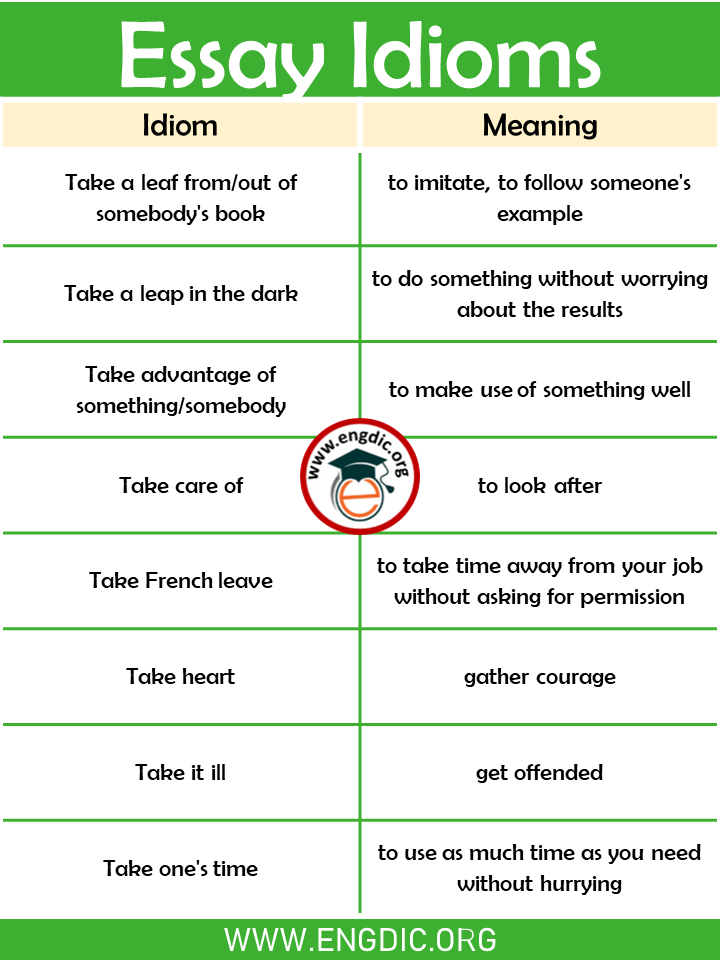
Download the PDF of this list of Idioms for Essays below:
Download PDF
Last updated on April 20th, 2023 at 11:24 am
Related Posts
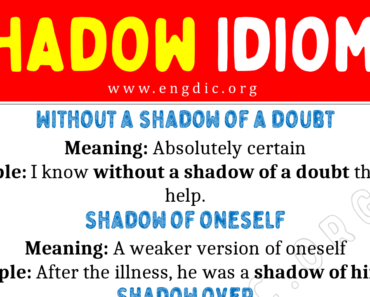
Shadow Idioms (With Meaning and Examples)
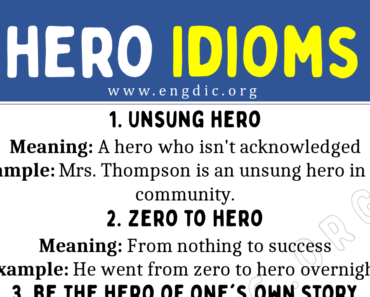
Hero Idioms (With Meaning and Examples)
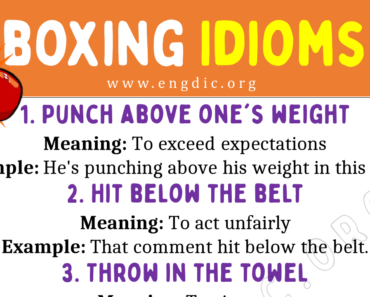
Boxing Idioms (With Meaning and Examples)
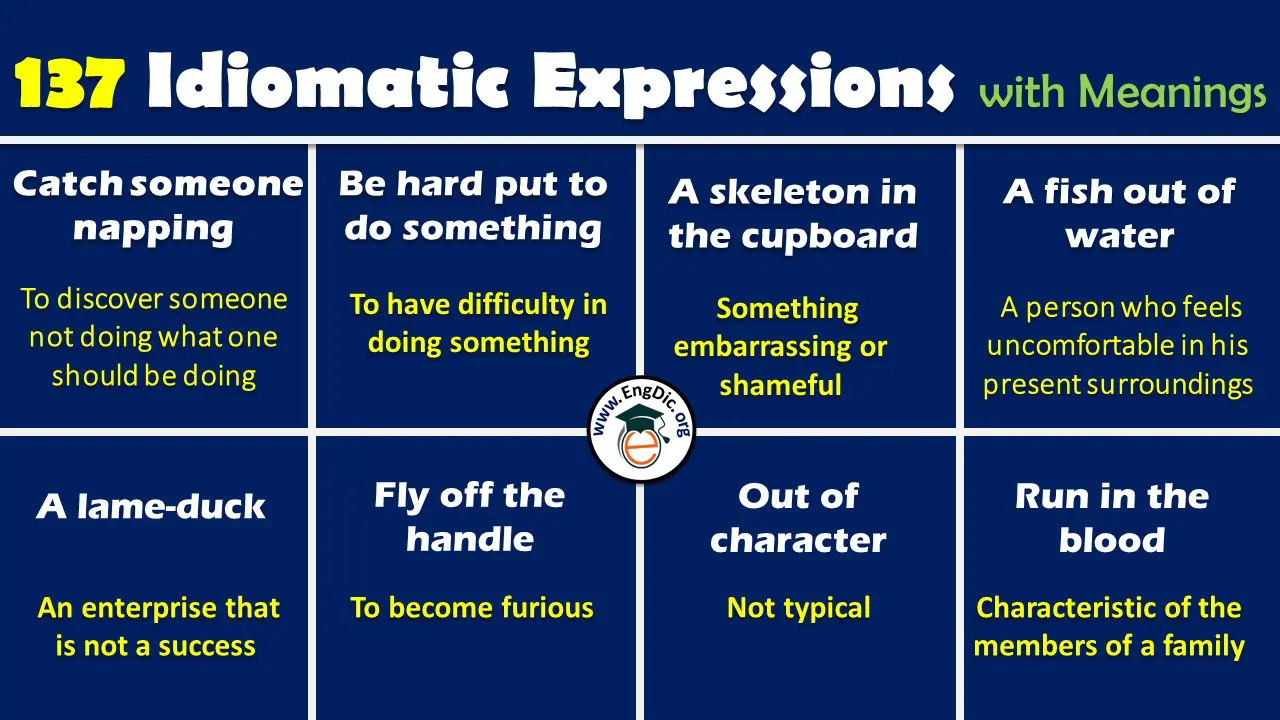
200+ Idiomatic Expressions List and Meaning PDF
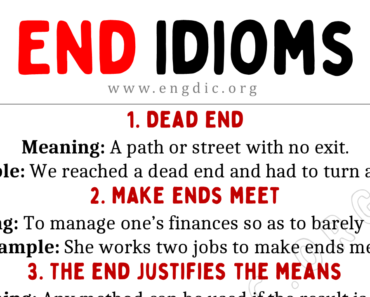
End Idioms (With Meaning and Examples)
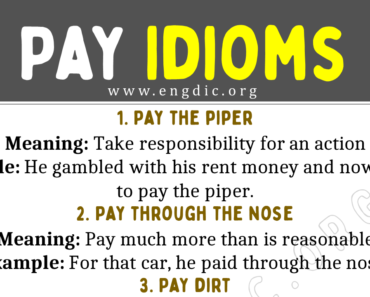
Pay Idioms (With Meaning and Examples)
About the author.
Hi, I'm USMI, engdic.org's Author & Lifestyle Linguist. My decade-long journey in language and lifestyle curation fuels my passion for weaving words into everyday life. Join me in exploring the dynamic interplay between English and our diverse lifestyles. Dive into my latest insights, where language enriches every aspect of living.
40 Common English Idioms
ThoughtCo / Hilary Allison
- Pronunciation & Conversation
- Writing Skills
- Reading Comprehension
- Business English
- Resources for Teachers
:max_bytes(150000):strip_icc():format(webp)/kr01-56a946be5f9b58b7d0f9d8d0.jpg)
- B.A., English, University of Michigan
Learning English isn’t as easy as some might think. First, grammar muddies the waters, making things complicated with a vast array of rules, and idiomatic expressions only add fuel to the fire, making things worse.
An idiom is a set expression that means something other than the literal meanings of its individual words. In other words, it's almost designed to trip you up, especially if you're not familiar with the language already.
If you’re taking the TOEFL or the TOEIC , or just want to know more common idioms, study this list of 40 common idiomatic expressions before you take the test. They may just help your English language acquisition soar (get much better).
Common English Idioms
- 24/7: Twenty-four hours a day; seven days a week; all the time; constantly. My little sister irritates me 24/7!
- A short fuse: A quick temper. Jamie is known for his short fuse; just a few days ago he screamed at his coach for not letting him play.
- A taste of your own medicine: Bad treatment deservedly received for treating other people badly. After constantly being prank-called, Julian decided to give Juan a taste of his own medicine and ordered twenty-seven pizzas to be delivered to Juan’s house.
- Butterflies in my stomach: To be nervous. Liam had butterflies in his stomach before he went on stage to play the violin.
- By the skin of your teeth: To just barely get by or make it. Lester made the dance team by the skin of his teeth; you can tell he hasn't been dancing jazz for very long.
- Cat got your tongue?: Can’t you speak? (Usually said to embarrass the other person). I just saw you kissing my boyfriend. What’s the matter? Cat got your tongue?
- Crying wolf: To ask for help when you don't need it. You have cried wolf so many times that no one believes you when you're really hurt.
- Cut someone some slack: To not judge someone too harshly. Hey. Cut me some slack. I was really busy with my frog-hunting business last week and forgot to call. I'm sorry!
- Down for the count: Tired; giving up; unable or unwilling to participate any longer. No, you can’t take my dog for a walk—she’s down for the count after chasing cats all day.
- Draw the line: To stop; to know the point where something goes from okay to not okay. Now I draw the line at speaking in front of 34,000 people.
- Easier said than done: Not as easy as it appears to be. You want me to come to work at 6:00 AM? Easier said than done!
- Every cloud has a silver lining: You can find good in every bad situation. E ven though you just got fired, remember that every cloud has a silver lining—at least you don’t have to work for that grouchy boss anymore!
- Finding a needle in a haystack: Virtually impossible to find. Trying to get a new job these days is like trying to find a needle in a haystack.
- Fish out of water: To be out of place. Tom felt like a fish out of water at the Star Trek convention his new girlfriend begged him to attend.
- Get something off your chest: To talk about something that has been bothering you for a long time; to admit something you have done wrong. I have to get this off my chest—I copied your answers on the SAT . Thanks for the 15th percentile score , by the way.
- Give it a whirl: To try something. I’ve never gone kite-boarding, but I’m prepared to give it a whirl!
- Go down in flames: To fail suddenly and spectacularly. The football player's career went down in flames after the media learned he'd been losing on purpose to settle gambling debts.
- Go the extra mile: To make an extra effort. My dentist always goes the extra mile, offering free back massages at the end of a stressful tooth extraction.
- Hang in there: Be patient. Wait it out. I know you're struggling right now in school but just hang in there. It'll get easier. I promise.
- In the fast lane: A life filled with excitement. When Curtis turned 40, he decided he needed to live life in the fast lane, so he quit his job as a dentist and decided to tour Europe by motorcycle.
- In the nick of time: Almost too late. You gave me that main idea help in the nick of time—my teacher just gave us a quiz on that reading skill and I passed it!
- Let the cat out of the bag: Tell a secret. Brady’s surprise party is going to be great if you don’t let the cat out of the bag.
- Let the chips fall where they may: To let something happen, no matter if it's good or bad. Look. I'm going to just try out for the cheerleading squad and let the chips fall where they may.
- Lose your marbles: To go crazy; insane. Mom has really lost her marbles; she's making me practice writing the ACT essay seven times this week!
- Once in a blue moon: Rarely. In Florida, the temperature drops below freezing only once in a blue moon.
- Plain as day: Obvious; clear. It’s plain as day that you’re in love with her, so just admit it.
- Play second fiddle: To be less important. I hate playing second fiddle to my sister; she always does things better than I do!
- Put your foot in your mouth: Saying something you shouldn’t have. Jessica really put her foot in her mouth when she asked about John’s job right after he lost it.
- Pull yourself together: Calm down and behave normally. Pull yourself together, man! Sure, your girlfriend just dumped you and then you got hit by a car, but you can't let those things get you down.
- Sick and tired: To be bothered or annoyed by. She is sick and tired of her dog chewing up her shoes every day.
- Sleep on it: To think about something for a while before making a decision. Don’t tell me whether you’ll move to Texas with me or not today. Sleep on it, and get back to me tomorrow.
- Snug as a bug in a rug: Warm and cozy; content. That baby looks as snug as a bug in a rug cuddled up next to his mother.
- Step up your game: To start performing better. Listen, Jen. You'd better step up your game if you want to get all A's in Miss Finch's Physics class. She isn't easy!
- Stick your nose into something: To interfere. Sharon always sticks her nose into everyone else’s business.
- Straight from the horse’s mouth: Directly from the person involved. Listen to the news straight from the horse’s mouth; we’re all getting bonuses this week!
- Take it easy: Relax. I know you’re not feeling well, so try to take it easy today.
- Tip of the iceberg: The small easily visible part of a larger problem. The fact that Carrie is dating a member of the mafia is just the tip of the iceberg; she’s also smuggling contraband into the country.
- To not see the wood for the trees: To be so involved with the details that you don’t get the most important facts. She always argues about the silliest things; it’s like she can’t see the wood for the trees.
- Up a creek without a paddle: In an unlucky/bad situation. If you don’t have any money to pay for the repairs we just made to your car, I guess you’re up a creek without a paddle because you can’t have your car back.
- You rock! : You are great. Dude. You rock. Thanks for offering to watch my pet iguana all week.
Additional Examples of Idioms
These are just a few of the thousands of idioms in the English language . Get your feet wet (start) with these, and then move on to more idioms that will knock your socks off (astound you).
- How to Say Good Night, Rest Well, and Good Morning in English
- American English to British English Vocabulary
- "Out" Idioms and Expressions
- Idioms and Expressions - 'As ... As'
- 'Like' Used in Idioms and Expressions
- Popular Cliches Explained for ESL Students
- How to Express Sadness in English
- Reuniting, Catching Up, and Updating in English
- English Idioms and Expressions
- English Sports Idioms
- Idioms and Expressions With Money
- Idioms and Expressions With the Word Make
- How to Learn Idioms and Expressions in Context
- Idioms and Expressions That Use "Work"
- Idioms in a Business Context Outline Keys to Success
- Idioms and Expressions Starting With "Put"
50 Most Common English Idioms and Phrases (With Examples)

You are looking to take your English skills to another level?
English idioms and phrases are the way to do it.
By combining words that have completely different individual meanings, we get idioms.
English idioms are extremely common in everyday conversation and, therefore, essential for language progression.
"An idiom (also called idiomatic expression) is an expression, word, or phrase that has a figurative meaning..."
Learning new words is not sufficient to become a fluent English speaker but idioms and proverbs can truly boost your knowledge.
In the following lines, you will find some of the most common English idioms with their meanings and sentences:
1. A hard nut to crack
Explanation: usually a person who is very difficult to deal with
Example: I gave my best to be friendly with her, but she is simply a hard nut to crack.
2. All ears
Explanation: very concentrated or keen to listen to the other person who has your full attention.
Example: Children are all ears when the teacher tells them fairytales.
3. A picture is worth a thousand words
Explanation: It’s better to show than to tell; illustration conveys a stronger message than words.
Example: Such a beautiful portrait of a little girl represents how a picture is worth a thousand words.
4. A piece of cake
Explanation: something easily done, simple task, or work.
Example: Anne said the test would be difficult, but it was a piece of cake. I’ll pass with no problem at all.
5. Better late than never
Explanation: It’s better to arrive late than not to come at all.
Example: We’ve been waiting for you for three hours, but better late than never.
6. Born with a silver spoon in mouth
Explanation: Someone who is born in a very wealthy family.
Example: He does not need this job as much as I do; he is born with a silver spoon in his mouth.
7. Bread and butter
Explanation: earnings of a person; indicate when a person earns for a living.
Example: You have to earn your own bread and butter.
8. Break the ice
Explanation: to try to become friends with someone; to make a start of something.
Example: It’s always easiest to break the ice after I’ve had a few drinks.
9. Break a leg
Explanation: Good luck, best wishes.
Example: You have a test tomorrow? Break a leg!
10. Can judge a book by its cover
Explanation: you can’t judge something just by its appearance.
Example: The candidate doesn’t look very promising, but you can't judge a book by its cover.
11. Chasing rainbows
Explanation: to follow your dreams, trying to do something that can’t be achieved.
Example: I understand you want to be a famous singer, but don’t chase rainbows. You are not a good singer!
12. Cool as a cucumber
Explanation: to be very calm and relaxed
13. Costs an arm and a leg
Explanation: when something costs too much money, it’s way too expensive.
Example: The show is excellent, but the tickets cost an arm and a leg.
14. Cry over spilled milk
Explanation: to be upset about something that is already done or a mistake that can’t be changed.
Example: It’s no use crying over spilled milk. It was a bad investment.
15. Draw a longbow
Explanation: to exaggerate, to lie.
Example: Anne is drawing a longbow. Do you believe her at all?
16. Easier said than done
Explanation: not as easy to do as it seems harder than you think.
Example: It's a lot tougher than that. It's one of those things that are easier said than done.
17. Eat like a bird
Explanation: to eat very little.
Example: Look at you! You have to eat more. You are eating like a bird.
18. Feeling under the weather
Explanation: to feel ill, sick, having a hangover.
Example: I have my final test, but I’m feeling under the weather. I think I have a fever.
19. Find your feet
Explanation: become confident in what you are doing, or familiar with some new situation or experience.
Example: I'm new to this city, so I'm still finding my feet.
20. Food for thought
Explanation: an idea to think about; think about things that can arise from an event or situation.
Example: My daughter has given me some food for thought about how she organizes her toys.
21. Forty winks
Explanation: sleep a while mainly during the day; take a nap.
Example: My dad always likes to catch forty winks after lunch.
22. Give a shot
Explanation: to try something you are not quite familiar with.
Example: I’m not prepared for my exam today. I will give it a shot.
23. Go cold turkey
Explanation: to suddenly stop or quit some bad or addictive behavior, like stop smoking.
Example: He had been trying to quit smoking for a year but couldn't, so he decided to go cold turkey.
24. Hit the hay/sack
Explanation: when someone is really tired and wants to go to sleep.
Example: Sorry guys, I have to hit the hay now!
25. Hold one’s peace.
Explanation: be silent.
Example: Just hold your peace if you don’t have anything smart to say.
26. It’s not rocket science
Explanation: It’s not difficult; it’s not complicated.
Example: Driving a car isn’t rocket science. I don’t understand why people don’t drive better.
27. Keep your chin up
Explanation: be brave and courageous in a tough situation.
Example: Don't let the difficulties intimidate you; keep your chin up.
28. Kill two birds with one stone.
Explanation: accomplish two different things, jobs, or actions; solve problems at the same time.
Example: Cycling to work kills two birds with one stone. It saves money and gives you some exercise.
29. Lose your marbles
Explanation: to go crazy, insane.
Example: I’ve been so bad lately that I thought I’m losing my marbles.
30. Make ends meet.
Explanation: make enough money to survive, to manage expenses.
Example: We need to start saving money in order to make ends meet.
31. Make a long story short
Explanation: Tell something briefly.
Example: To make a long story short, I had a wonderful time during my vacation.
32. Never in a million years
Explanation: Absolutely never.
Example: Never in a million years would I think to fall in love with him.
33. On cloud nine
Explanation: to be extremely happy or cheerful.
Example: Susan is on cloud nine since she got married.
34. Once in a blue moon
Explanation: something happens very rarely, once after a very long time.
Example: I don’t know why she bought that music system. She uses it once in a blue moon.
35. Out of the woods
Explanation: the hardest part of something is over, but the situation isn’t still good.
Example: The surgery went well, but he’s not out of the woods yet.
36. Penny for your thoughts
Explanation: a way of asking someone else’s thoughts.
Example: You seem so serious. A penny for your thoughts.
Don't forget to work on learning new English words every day, not just idioms.
37. Pull someone’s leg
Explanation: To joke with someone, to trick someone in a humorous way
Example: I think he was just pulling your leg when he said you’ve fallen in the exam.
38. Rain cats and dogs
Explanation: rain heavily, tremendously.
Example: It’s raining cats and dogs when the Monsoon comes.
39. Speak of the devil
Explanation: The person we were talking about showed up.
Example: Did you hear what happened to Anne yesterday? Oh, speak of the devil, there she is.
40. Square peg in a round hole
Explanation: When a person doesn’t fit into society when you find in a surrounding that doesn’t suit you.
Example: That lifestyle really doesn't suit Sally at all; she's like a square peg in a round hole.
41. Takes two to tango.
Explanation: Specific actions can’t be performed alone; it takes two persons to participate; both persons are responsible for an action.
Example: If you want to play that game, you need a partner who plays with you. It takes two to tango.
42. That’s the last straw
Explanation: Someone’s patience has run out, to be the latest in a sequence of unpleasant things that can’t be accepted.
Example: I’m not going to wait for the last straw. I’ll do something about the problem much sooner than you.
43. To cut corners
Explanation: to do something in an easy and very cheap way; to reduce time, money, expenses.
Example: My mom often had to cut corners when we were kids to feed all of us.
44. To go Dutch
Explanation: When everyone pays his bill.
Example: Last night we had a date, but we went Dutch because I’ve paid for my coffee and he paid his.
45. To have sticky fingers
Explanation: to be a thief.
Example: The manager fired his employee because he had sticky fingers. He stole 100$.
46. To sit tight
Explanation: wait patiently and take no action; stay where you are.
Example: Just relax and sit tight; we'll solve the problem for you.
47. Up in the air
Explanation: unresolved, undecided about something; full of doubt.
Example: I am not sure what the plans are. Everything was up in the air when I last spoke to him about it.
48. What goes around, comes around.
Explanation: how you treat and behave to others will eventually come to you, too.
Example: All of his life, he treated his family with no respect, and now his son is doing the same to him. What goes around, comes around.
49. When pigs fly
Explanation: something that will never happen or highly unlikely to happen.
Example: He plans to clean his house every week, but he will probably do it only when pigs fly.
50. Zip your lip
Explanation: To remain a secret or silent.
Example: I’ll tell you a secret about Marry, but zip your lip about it!
Practice makes perfect
To learn English idioms better, we’ve prepared some exercises that will help you test your knowledge.
Don’t be shy. Try and find out.
Please note that you will not need all listed idioms in the following exercises, so focus and pay attention.
I can’t wait to see you on premiere tomorrow night! __________________ !
I can’t believe that was our test. I think it was easier than some of our homework! It was a ______.
They were discussing the girl who was his new crush when she walked in. ____________________.
The earthquakes hits _________________ in this part of the earth, we never felt it.
He showed up for the wedding when they were already cutting the cake. __________________, I suppose.
To_______________________________, he still stays in the apartment but now it is owned by someone else.
You can't be serious about that! Stop ___________________.
Such a beautiful portrait of a little girl - represents how ________________________.
I am really tired after all that exercise. I am going to_______________.
John asked Sarah whether she would go to the movies with him. Sarah replied that would happen __________________.
It is sad to see that people always wait until ________________before they start to take any action in this country.
It’s not right to blame only the other woman for his adulterous affair -__________________.
I have never eaten Mexican food, but I will ______________ .
She has just returned from her vacation, but is feeling _______________and has a sore throat and running nose.
I have to go to the bank, and on the way back, I'll pick up the groceries also, ____________________.
He really wants to go to that event. He's willing to pay __________________ for it.
When drug addicts go ___________________ they experience a period of extreme suffering.
He has never worked hard for anything because he was________________________. His parents brought everything to him instead.
Shall we _____________? No, not this time I’m paying the bill.
Peter is still new in his job; give him some time to ______________.
9, B. 4, C. 39, D. 34, E. 5, F. 31. G. 37, H. 3, I. 49, J. 42, K. 41, L. 22, M. 18, N. 28, O. 13, P. 23, Q. 6, R. 6, S. 44, T. 19.
Yes, you did it! Do you want to practice more and even better, use the phrases you just learnt in real life? With Babbel Live you have the opportunity to do so with real life teachers!
Is it necessary to use idioms while speaking English?
Idioms make your vocabulary wider and show that you have a deep knowledge of the language.
Is it possible to understand the meaning of the idiom without a dictionary?
If you have a context, you may grasp the meaning, but most of the idioms should be checked in the dictionary.
Do native speakers frequently use idioms?
There are many idioms that are well known and frequently used among the native speakers, but some of them become old and rarely used.
Releated Articles
.jpg)
What are the Basic Tenses in English?
.jpg)
What is the Longest Word in English?
.jpg)
Learn Basic Japanese Grammar
Daily learning tips directly in your inbox.
Get amazing tips and tricks to help you succeed on your language learning adventure. No spam, just valuable learning.
- I nfographics
- Show AWL words
- Subscribe to newsletter
- Incidental learning
- Incidental learning tool
- Pronunciation
- Part of speech
- Word family
- Common/uncommon
- General/Academic
- Collocation
- About vocabulary building
- AWL highlighter/gapfill
- AWL tag cloud/gapfill
- ACL highlighter/gapfill
- AFL highlighter/gapfill
- Multi highlighter
- NAWL highlighter
- AVL highlighter
- DCL highlighter
- EAWL highlighter
- MAWL highlighter
- MAVL highlighter
- MAWL/MAVL highlighter
- CAWL highlighter
- CSAVL highlighter
- SWL highlighter
- SPL highlighter
- SVL/MSVL profiler
- GSL highlighter
- NGSL highlighter
- New-GSL highlighter
- About the AWL
- AWL word finder
- AWL highlighter & gapfill
- AWL tag cloud & gapfill
- AWL word cloud
- AWL word cloud (sublist)
- About the ACL
- ACL by headword
- ACL by type
- ACL by frequency
- ACL highlighter & gapfill
- ACL mind map
- About the GSL
- GSL by frequency
- GSL alphabetical
- GSL limiter
- About technical vocab
- Secondary Vocab Lists
- Middle Sch Vocab Lists
- Science Word List
- Secondary Phrase Lists
- Nursing Collocation List
- Other specific lists
- Text profiler
- Word & phrase profiler
- Academic concordancer
- Guide to the concordancer
- Academic corpora
- Concordancers review
- Environment
- Physical Health
Show AWL words on this page.
Levels 1-5: grey Levels 6-10: orange
Show sorted lists of these words.
Any words you don't know? Look them up in the website's built-in dictionary .
Choose a dictionary . Wordnet OPTED both
- Academic vocab
Academic Idioms In the long run bear in mind a fair share
Although it is often assumed that idioms are too informal for use in academic English, two studies have identified idioms which occur fairly frequently in spoken and written academic English.
This page describes idioms in academic English, giving information on what an idiom is , why academic idioms should be studied , as well as a list of academic idioms for spoken and written English from a recent study of idioms (Miller, 2019), giving first background to the creation of the list and finally the list itself .
There are also some exercises to help you practise using academic idioms.

What is an idiom?
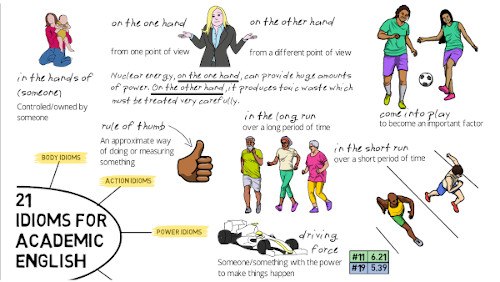
For another look at the same content, check out the video on YouTube (also available on Youku ). There is a worksheet (with answers and teacher's notes) for this video.
An idiom is a fixed, well-established, multi-word expression, the meaning of which is not deducible from the individual words. The following are some examples of idioms in everyday (not academic) English.
- Raining cats and dogs - raining very hard
- Break a leg - said before a performance, meaning 'good luck'
- Behind one's back - secretly
The following are some examples of idioms for academic English use (a complete list is given below).
- On the other hand - from another point of view (showing contrast)
- Bear in mind - think of something, especially as a warning
- The bottom line - the main or essential point
- Take on board - accept or deal with (a problem or idea)
Why study academic idioms?
Idioms are common in everyday spoken and written English. Although it is often assumed that idioms are too informal for use in academic English, two studies ( Simpson and Mendis, 2003 , and Miller, 2019 ) have identified idioms which are used in academic contexts, more commonly in spoken academic contexts though also in academic writing. In Miller's study, idioms in spoken academic texts, including repetitions, occurred with a frequency of 835 per million words, or close to 0.1%. While this figure is not as high as, say, words in the Academic Word List (10%) or the Academic Collocation List (1.4%), productive knowledge of idioms will assist students in becoming part of the academic discourse community, while receptive knowledge will aid them in understanding spoken or written texts.
Miller reports that idioms may sometimes be signposted by lecturers (e.g. via the phrase as it were ) or writers (e.g. via the phrase as they say or by use of quotation marks). However, these methods do not always signal idiom use, do not help students to understand the meaning of idioms, and in fact add a layer of complexity to academic English study (in terms of what as it were and as they say mean and why quotation marks are used in that way).
Academic Idioms List: background to the list
The list of academic idioms (below) comes from the study by Julia Miller (2019), which used two academic English corpuses: the British Academic Spoken English (BASE) corpus for spoken texts (lectures and seminars), and the Oxford Corpus of Academic English (OCAE) for written texts. Only idioms with a frequency of more than 1.2 per million words (pmw) in the BASE were included.
The range of idiom use is shown by the number of texts in which each idiom occurs, as well as the number of faculties (i.e. disciplinary groups) it occurs in. Miller's study used four such faculties, namely Social Sciences (which had the highest idiom use with 234 pmw), Arts and Humanities (which had 191 idioms pmw), Life and Medical Sciences (183 pmw), and Physical Sciences (which had the least frequent use, 76 pmw).
Most idioms in the list occur in more than one faculty, meaning they are suitable for study by all students of academic English. The most frequent idiom used in only one faculty, gold standard (24th most frequent idiom in spoken academic English and 10th most frequent in written academic English), was used only in the Life Sciences (medical articles).
Miller, J. (2019) 'The bottom line: Are idioms used in English academic speech and writing?', Journal of English for Academic Purposes , 43 (2020) 100810. Available online at: https://doi.org/10.1016/j.jeap.2019.100810 .
Simpson, R., and Mendis, D. (2003) 'A corpus-based study of idioms in academic speech', Tesol Quarterly , 37(3), 419e441. Available online at: https://deepblue.lib.umich.edu/bitstream/handle/2027.42/90255/3588398.pdf?sequence=1 .
» Click to show exercises «
« Click to hide exercises »
You need to log in to view the exercises. If you do not already have an account, you can register for free.
Academic Idioms List: Spoken
The list below gives spoken academic idioms from the BASE (British Academic Spoken English) corpus, listed in order of frequency. There are 170 idioms in total. There is a separate version of 38 idioms for written academic English (use the button below to switch lists). Definitions are included for all idioms. [Note: Sp freq pmw means spoken frequency per million words while Wr freq pmw refers to written frequency per million words .]
Some definitions take from WordNet 3.0 Copyright 2006 by Princeton University. All rights reserved. THIS SOFTWARE AND DATABASE IS PROVIDED "AS IS" AND PRINCETON UNIVERSITY MAKES NO REPRESENTATIONS OR WARRANTIES, EXPRESS OR IMPLIED. BY WAY OF EXAMPLE, BUT NOT LIMITATION, PRINCETON UNIVERSITY MAKES NO REPRESENTATIONS OR WARRANTIES OF MERCHANT- ABILITY OR FITNESS FOR ANY PARTICULAR PURPOSE OR THAT THE USE OF THE LICENSED SOFTWARE, DATABASE OR DOCUMENTATION WILL NOT INFRINGE ANY THIRD PARTY PATENTS, COPYRIGHTS, TRADEMARKS OR OTHER RIGHTS.

GET FREE EBOOK
Like the website? Try the books. This extract from Unlock the Academic Wordlist: Sublists 1-3 contains all sublist 1 words, plus exercises, answers and more!

Author: Sheldon Smith ‖ Last modified: 16 November 2022.
Sheldon Smith is the founder and editor of EAPFoundation.com. He has been teaching English for Academic Purposes since 2004. Find out more about him in the about section and connect with him on Twitter , Facebook and LinkedIn .
The AWL highlighter allows you to highlight words from the AWL (Academic Word List) in any text you choose.
The Academic Word List (AWL) contains 570 word families which frequently appear in academic texts.
The Academic Collocation List (ACL) is a list containing 2,469 of the most frequent and useful collocations which occur in written academic English.
Academic vocabulary consists of general words, non-general academic words, and technical words.
Resources for vocabulary contains additional activities and information (requires users to be logged in).
Learning vocabulary depends on knowing how much to learn, the type of vocabulary to study, and how to study it properly.
- English Grammar
- Idioms In English
Idioms in English - Examples of 100+ Commonly Used Idioms and Their Meanings
If you are a person who loves to watch English movies and series, or if you have the habit of reading books and newspapers, you would have surely come across a number of idioms. There might have been situations where you felt you did not really understand what the characters were saying. Learn what idioms mean and how they are used. Once you do that, try rewatching or re-reading the parts you did not understand initially. You will surely have a good laugh.

Language learning need not always be a compulsive task. What if you can have fun with language? Would you try learning the language? Well, if your answer is yes, then the English language is one such language that lets you have a lot of fun while learning it. In this article, you will get to learn the meaning of idioms, their definition, how to use them, the most common idioms and their meanings. You can also take a look at the examples of idioms taken from movies, TV series and literature for a better understanding.
Table of Contents
What is an idiom – meaning and definition, why use idioms in sentences, list of 100+ common idioms, their meanings and examples of their usage in sentences, idiom examples from movies, idiom examples from tv series.
- Idiom Examples from Literature
Frequently Asked Questions on Idioms in English
An idiom is a group of words, or in other words, a phrase that has a meaning different from the literal meaning of the words in it. According to the Oxford Learner’s Dictionary, an idiom is defined as “a group of words whose meaning is different from the meanings of the individual words”, and according to the Cambridge Dictionary, an idiom is defined as “a group of words in a fixed order that has a particular meaning that is different from the meanings of each word on its own”.
The Collins Dictionary defines an idiom as “a group of words which have a different meaning when used together from the one they would have if you took the meaning of each word separately.” The Merriam-Webster Dictionary provides a more elaborate definition. According to them, an idiom is “an expression in the usage of a language that is peculiar to itself either in having a meaning that cannot be derived from the conjoined meanings of its elements (such as up in the air for “undecided”) or in its grammatically atypical use of words (such as give way).”
Idioms can be a powerful linguistic tool only when they are used in the right way in the right places. The only thing that makes learning idioms a time-consuming process is the fact that one cannot depend merely on the meaning of individual words to understand what the entire phrase means.
Idioms are not meant to be used in academic or professional writing. In a lighter context, the use of idioms can make your piece of writing or speech unique. Idioms can also be used to indicate pun or even sarcasm. Like any other components of a language, you have to be careful with the use of idioms as well. The only problem is that it would make no sense or effect to a group of people who do not know the meaning of the idiom you are using. So, always make sure you are using idioms with an audience who would be able to comprehend the meaning.
To make your learning process a lot easier, here is a table with the most common idioms in the English language along with their meanings for your reference.
Examples of Idioms
Now, take a look at some of the most common and funniest examples from various movies, TV series and books.
- I could dance with you until the cows come home . – Duck Soup
- Speak of the devil – Fast and Furious
- This is the man with no name. Danger fits him like a glove. – A Fistful of Dollars
- Look at this place! It looks wonderful. All spick-and-span. – Mrs. Doubtfire
- I’ve got three items in the docket: First, we need to acknowledge the elephant in the room. – Zootopia
- Um, well, break a leg tonight. – This is Us
- Not to burst your bubble but it’s not rocket science . – Manifest
- Oh, perhaps I am a little under the weather. – The Big Bang Theory
- The wedding is about to start when Monica gets cold feet . – F.R.I.E.N.D.S.
- Stalin. Do I know that name? That sounds familiar. Well, it does not ring a bell with me. – F.R.I.E.N.D.S.
Idiom Examples from Books
- “Nay, if our wits run the wild-goose chase , I am done, for thou hast more of the wild-goose in one of thy wits than, I am sure, I have in my whole five.” – Romeo and Juliet by William Shakespeare
- Scrooge signed it. And Scrooge’s name was good upon ‘Change, for anything he chose to put his hand to. Old Marley was as dead as a doornail .” – A Christmas Carol by Charles Dickens
- “But I will wear my heart upon my sleeve for daws to peck at. I am not what I am.” – Othello by William Shakespeare
- “I’ve got my hands full,” I said. “I’m much obliged but I couldn’t take on any more work.” – The Great Gatsby by F. Scott Fitzgerald
- “Though this be madness, yet there is method in’t .” – Hamlet by William Shakespeare
What is an idiom?
An idiom is a group of words, or in other words, a phrase that has a meaning other than its literal meaning of the words in it.
What is the definition of an idiom?
According to the Oxford Learner’s Dictionary, an idiom is defined as “a group of words whose meaning is different from the meanings of the individual words”, and according to the Cambridge Dictionary, an idiom is defined as “a group of words in a fixed order that has a particular meaning that is different from the meanings of each word on its own”.
Give 5 examples of idioms.
- My brother and I are always at loggerheads.
- Aaron was on cloud nine when I gave him cashew cookies.
- We decided to put the case on ice until we had some clue of what had happened.
- My father told me not to worry about the competition as there would be other fish in the sea.
- The communication trainer conducted an activity to break the ice.
- Share Share
Register with BYJU'S & Download Free PDFs
Register with byju's & watch live videos.
Idioms and Phrases - Learn Eng
About this app
Data safety.
Ratings and reviews
- Flag inappropriate
What's new
App support, more by vocabulary builder - word of the day - aurora.
Similar apps
- Share full article

Can You Lose Your Native Tongue?
After moving abroad, I found my English slowly eroding. It turns out our first languages aren’t as embedded as we think.
Credit... Artwork by PABLO DELCÁN
Supported by
By Madeleine Schwartz
Madeleine Schwartz is a writer and editor who grew up speaking English and French. She has been living in Paris since 2020.
- May 14, 2024
It happened the first time over dinner. I was saying something to my husband, who grew up in Paris where we live, and suddenly couldn’t get the word out. The culprit was the “r.” For the previous few months, I had been trying to perfect the French “r.” My failure to do so was the last marker of my Americanness, and I could only do it if I concentrated, moving the sound backward in my mouth and exhaling at the same time. Now I was saying something in English — “reheat” or “rehash” — and the “r” was refusing to come forward. The word felt like a piece of dough stuck in my throat.
Listen to this article, read by Soneela Nankani
Other changes began to push into my speech. I realized that when my husband spoke to me in English, I would answer him in French. My mother called, and I heard myself speaking with a French accent. Drafts of my articles were returned with an unusual number of comments from editors. Then I told a friend about a spill at the grocery store, which — the words “conveyor belt” vanishing midsentence — took place on a “supermarket treadmill.” Even back home in New York, I found my mouth puckered into the fish lips that allow for the particularly French sounds of “u,” rather than broadened into the long “ay” sounds that punctuate English.
My mother is American, and my father is French; they split up when I was about 3 months old. I grew up speaking one language exclusively with one half of my family in New York and the other language with the other in France. It’s a standard of academic literature on bilingual people that different languages bring out different aspects of the self. But these were not two different personalities but two separate lives. In one version, I was living with my mom on the Upper West Side and walking up Columbus Avenue to get to school. In the other, I was foraging for mushrooms in Alsatian forests or writing plays with my cousins and later three half-siblings, who at the time didn’t understand a word of English. The experience of either language was entirely distinct, as if I had been given two scripts with mirroring supportive casts. In each a parent, grandparents, aunts and uncles; in each, a language, a home, a Madeleine.
I moved to Paris in October 2020, on the heels of my 30th birthday. This was both a rational decision and something of a Covid-spurred dare. I had been working as a journalist and editor for several years, specializing in European politics, and had reported across Germany and Spain in those languages. I had never professionally used French, in which I was technically fluent. It seemed like a good idea to try.
When I arrived in France, however, I realized my fluency had its limitations: I hadn’t spoken French with adults who didn’t share my DNA. The cultural historian Thomas Laqueur, who grew up speaking German at home in West Virginia, had a similar experience, as the linguist Julie Sedivy notes in “Memory Speaks,” her book about language loss and relearning her childhood Czech. Sedivy cites an essay of Laqueur’s in which he describes the first time he learned that German was not, in fact, a secret family language. He and his brother had been arguing over a Popsicle in front of the grocery store near his house:
A lady came up to us and said, in German, that she would give us a nickel so that we could each have a treat of our own. I don’t remember buying a second Popsicle, but I do remember being very excited at finding someone else of our linguistic species. I rushed home with the big news.
My own introduction to speaking French as an adult was less joyous. After reaching out to sources for a different article for this magazine with little success, I showed the unanswered emails to a friend. She gently informed me that I had been yelling at everyone I hoped to interview.
Compared with English, French is slower, more formal, less direct. The language requires a kind of politeness that, translated literally, sounds subservient, even passive-aggressive. I started collecting the stock phrases that I needed to indicate polite interaction. “I would entreat you, dear Madam ...” “Please accept, dear sir, the assurances of my highest esteem.” It had always seemed that French made my face more drawn and serious, as if all my energy were concentrated into the precision of certain vowels. English forced my lips to widen into a smile.
But going back to English wasn’t so easy, either. I worried about the French I learned somehow infecting my English. I edit a magazine, The Dial, which I founded in part to bring more local journalists and writers to an English-speaking audience. But as I worked on texts by Ukrainians or Argentines or Turks, smoothing over syntax and unusual idioms into more fluid English prose, I began to doubt that I even knew what the right English was.
Back in New York on a trip, I thanked the cashier at Duane Reade by calling him “dear sir.” My thoughts themselves seemed twisted in a series of interlocking clauses, as though I was afraid that being direct might make me seem rude. It wasn’t just that my French was getting better: My English was getting worse.
For a long time, a central question in linguistics was how people learn language. But in the past few decades, a new field of study called “language attrition” has emerged. It concerns not learning but forgetting: What causes language to be lost?
People who move to new countries often find themselves forgetting words in their first language, using odd turns of phrase or speaking with a newly foreign accent. This impermanence has led linguists to reconsider much of what was once assumed about language learning. Rather than seeing the process of becoming multilingual as cumulative, with each language complementing the next, some linguists see languages as siblings vying for attention. Add a new one to the mix, and competition emerges. “There is no age at which a language, even a native tongue, is so firmly cemented into the brain that it can’t be dislodged or altered by a new one,” Sedivy writes. “Like a household that welcomes a new child, a single mind can’t admit a new language without some impact on other languages already residing there.”
As my time in France hit the year mark and then the two-year mark, I began to worry about how much French was changing my English — that I might even be losing some basic ability to use the language I considered closest to my core. It wasn’t an idle concern. A few years earlier, when living in Berlin, I found the English of decades-long expats mannered and strange; they spoke more slowly and peppered in bits of German that sounded forced and odd. As an editor, I could see it in translators too: The more time people spent in their new language, the more their English prose took on a kind of Germanic overtone. Would the same thing happen to me?

Even languages that seem firmly rooted in the mind can be subject to attrition. “When you have two languages that live in your brain,” says Monika S. Schmid, a leader in the field of language attrition at the University of York, “every time you say something, every time you take a word, every time you put together a sentence, you have to make a choice. Sometimes one language wins out. And sometimes the other wins.” People who are bilingual, she says, “tend to get very, very good at managing these kinds of things and using the language that they want and not having too much interference between the two.” But even so, there’s often a toll: the accent, the grammar or a word that doesn’t sound quite right.
What determines whether a language sticks or not? Age, Schmid says, is an important factor. “If you look at a child that is 8, 9 or 10 years old, and see what that child could do with the language and how much they know — they’re basically fully fledged native speakers.” But just as they are good language learners, children are good language forgetters. Linguists generally agree that a language acquired in early childhood tends to have greater emotional resonance for its speaker. But a child who stops speaking a language before age 12 can completely lose it. For those who stop speaking a language in childhood, that language can erode — so much so that when they try to relearn it, they seem to have few, if any, advantages, Schmid says, compared with people learning that language from scratch. Even a language with very primal, deep connections can fade into the recesses of memory.
In her book, Sedivy cites a study conducted in France that tested a group of adults who were adopted from Korea between the ages of 3 and 8 . Taken into French homes, they quickly learned French and forgot their first language. The researchers compared these adults with a group of monolingual French speakers. The participants born in Korea could not identify Korean sentences significantly better than the French control group. Intimate moments of childhood can be lost, along with the language in which they took place.
Researchers have stressed that a first language used through later years can be remarkably resilient and often comes back when speakers return home. But even adults who move to a new country can find themselves losing fluency in their first language. Merel Keijzer, a linguist at the University of Groningen who studies bilingualism, surveyed a group of Dutch speakers who emigrated as adults to Australia. A classic theory of linguistic development, she told me, argues that new language skills are superimposed on older ones like layers of an onion. She thus expected that she would find a simple language reversion: The layers that were acquired later would be most likely to go first.
The reality was more complicated. In a paper Keijzer wrote with Schmid, she found that the Dutch speakers in Australia did not regress in the way that she predicted. “You saw more Dutch coming into their English, but you also saw more English coming into their Dutch,” she says. The pattern wasn’t simple reversion so much as commingling. They “tended to just be less able to separate their languages.” As they aged, the immigrants didn’t go back to their original language; they just had difficulty keeping the two vocabularies apart.
In “Alfabet/Alphabet: A Memoir of a First Language,” the poet Sadiqa de Meijer, who was born in Amsterdam, discusses her own experiences speaking Dutch in Canada. She worries that her language has become “amusingly formal” now that she doesn’t speak it regularly. A friend tells her that she now sounds “like a book.” Unless she is in the Netherlands, she writes: “Dutch is primarily a reading language to me now. The skill of casual exchanges is in gradual atrophy.” Her young daughter does not want to speak Dutch. “Stop Dutching me!” she says. For De Meijer, “people who speak a language they learned after early childhood live in chronic abstraction.”
This state of abstraction was one that I feared. On some level, the worry felt trivial: In a world where languages are constantly being lost to English, who would complain about a lack of contact with the language responsible for devouring so many others? The Europeans that I interviewed for work deplored the imperial nature of English; the only way to have their ideas heard was to express them in a language imposed by globalization. But what I missed was not the universal English of academics nor the language of peppy LinkedIn posts but the particular sounds that I grew up with: the near-rudeness of the English spoken in New York and its rushed cadence, the way that the bottoms of words sometimes were swallowed and cut off, as if everyone already knew what was being suggested and didn’t need to actually finish the thought. I missed the variegated vocabulary of New York, where English felt like an international, rather than a globalized language, enriched with the particular words of decades of immigrants. I began to listen to “The Brian Lehrer Show” on WNYC, a public-radio station in New York, with strange fervor, finding myself excited whenever someone called in from Staten Island.
The idea that my facility with English might be weakening brought up complicated feelings, some more flattering than others. When a journalism student wrote to ask if I would be a subject in his dissertation about “the experiences of nonnative English-speaking journalists” in media, I took the email as a personal slight. Were others noticing how much I struggled to find the right word?
A change in language use, whether deliberate or unconscious, often affects our sense of self. Language is inextricably tied up with our emotions; it’s how we express ourselves — our pain, our love, our fear. And that means, as Schmid, the language-attrition expert at the University of York, has pointed out, that the loss of a language can be tied up with emotion too. In her dissertation, Schmid looked at German-speaking Jews who emigrated to England and the United States shortly before World War II and their relationship with their first language. She sent questionnaires asking them how difficult it was for them to speak German now and how they used the language — “in writing in a diary, for example, or while dreaming.”
One woman wrote: “I was physically unable to speak German. ... When I visited Germany for 3 or 4 days in 1949 — I found myself unable to utter one word of German although the frontier guard was a dear old man. I had to speak French in order to answer his questions.”
Her husband concurred: “My wife in her reply to you will have told you that she could and did not want to speak German because they killed her parents. So we never spoke German to each other, not even intimately.”
Another wrote: “I feel that my family did a lot for Germany and for Düsseldorf, and therefore I feel that Germany betrayed me. America is my country, and English is my language.”
Schmid divided the émigrés into three groups, tying each of them to a point in Germany’s history. The first group left before September 1935, that is, before the Nuremberg race laws. The second group left between the enactment of those laws and Kristallnacht, in November 1938. The last group comprised those who left between Kristallnacht and August 1939, just before Germany invaded Poland.
What Schmid found was that of all the possible factors that might affect language attrition, the one that had a clear impact was how much of the Nazi regime they experienced. Emigration date, she wrote, outweighed every other factor; those who left last were the ones who were the least likely to be perceived as “native” speakers by other Germans, and they often had a weaker relationship to that language:
It appears that what is at the heart of language attrition is not so much the opportunity to use the language, nor the age at the time of emigration. What matters is the speaker’s identity and self-perception. ... Someone who wants to belong to a speech community and wants to be recognized as a member is capable of behaving accordingly over an extremely long stretch of time. On the other hand, someone who rejects that language community — or has been rejected and persecuted by it — may adapt his or her linguistic behavior so as not to appear to be a member any longer.
In other words, the closeness we have with a language is not just a product of our ability to use it but of other emotional valences as well. If language is a form of identity, it is one that may be changed by circumstance or even by force of will.
Stories of language loss often mask other, larger losses. Lily Wong Fillmore, a linguist who formerly taught at the University of California, Berkeley, once wrote about a family who emigrated to California several years after leaving China’s Canton province in 1989. One child, Kai-fong, was 5 when he arrived in the United States. At this point in his life, he could speak and understand only Cantonese. While his younger sister learned English almost immediately and made friends easily, Kai-fong, who was shy, did not have the same experience in school. His classmates called him “Chi, chi, chia pet” because his hair stuck out. Boys mocked the polyester pants his grandmother sewed for him. Pretty soon, he and his classmates were throwing rocks at one another.
Once Kai-fong started learning English, he stopped speaking Cantonese, even to members of his own family. As Wong Fillmore writes: “When Grandmother spoke to him, he either ignored her or would mutter a response in English that she did not understand. ... The more the adults scolded, the more sullen and angry Kai-fong became.” By 10, he was known as Ken and no longer understood Cantonese well. The family began to split along linguistic lines. Two children born in the United States never learned Cantonese at all. It is a story, Wong Fillmore writes, “that many immigrant families have experienced firsthand.”
The recognition in linguistics of the ease with which mastery of a language can erode comes as certain fundamentals of the field are being re-examined — in particular, the idea that a single, so-called native language shapes your innermost self. That notion is inextricable from 19th-century nationalism, as Jean-Marc Dewaele, a professor at the University of London, has argued. In a paper written with the linguists Thomas H. Bak and Lourdes Ortega, Dewaele notes that many cultures link the first words you speak to motherhood: In French, your native language is a langue maternelle, in Spanish, lengua materna, in German, Muttersprache. Turkish, which calls your first language ana dili, follows the same practice, as do most of the languages of India. Polish is unusual in linking language to a paternal line. The term for native language is język ojczysty, which is related to ojciec, the Polish word for father.

Regarding a first language as having special value is itself the product of a worldview that places national belonging at the heart of individual life. The phrase “native speaker” was first used by the politician and philologist George Perkins Marsh, who spoke of the importance of “home-born English.” It came with more than a light prejudicial overtone. Among Marsh’s recommendations was the need for “special precautions” to protect English from “becoming debased and vulgarized ... by association with depraved beings and unworthy themes.”
The idea of a single, native language took hold in linguistics in the mid-20th century, a uniquely monolingual time in human history. American culture, with its emphasis on assimilation, was especially hostile to the notion that a single person might inhabit multiple languages. Parents were discouraged from teaching their children languages other than English, even if they expressed themselves best in that other language. The simultaneous acquisition of multiple tongues was thought to cause delays in language development and learning. As Aneta Pavlenko, a linguist at Drexel University and the University of York, has noted, families who spoke more than one language were looked down on by politicians and ignored by linguists through the 1970s. “Early bilinguals,” those who learned two languages in childhood, “were excluded from research as ‘unusual’ or ‘messy’ subjects,” she writes. By contrast, late bilinguals, those who learned a second language in school or adulthood, were treated as “representative speakers of their first language.” The fact that they spoke a second language was disregarded. This focus on the importance of a single language may have obscured the historical record, giving the impression that humans are more monolingual and more rigid in their speech than they are.
Pavlenko has sought to show that far from being the historical standard, speaking just one language may be the exception. Her most recent book, a collection of essays by different scholars, takes on the historical “amnesia” that researchers have about the prevalence of multilingualism across the globe. The book looks at examples where multiple languages were the norm: medieval Sicily, where the administrative state processed paperwork in Latin, Greek and Arabic, or the early Pennsylvania court system, where in the 18th and 19th centuries, it was not unusual to hold hearings in German. Even today, Pavlenko sees a split: American academics working in English, often their only language, regard it as the standard for research. Europeans, obliged to work in English as a second language, are more likely to consider that fluency in only one language may be far rarer than conflict among multiple tongues.
According to Dewaele and his colleagues, “the notion of a single native language, determined entirely by the earliest experiences, is also not supported by neurology and neuroscience.” While there are many stories about patients who find themselves speaking their first language after a stroke or dementia, it’s also common for the recovered patients to use the language they spoke right before the accident occurred.
All of this has led some linguists to push against the idea of the “native” speaker, which, as Dewaele says, “has a dark side.” It can be restrictive, stigmatizing accents seen as impure, or making people feel unwelcome in a new home. Speakers who have studied a language, Dewaele says, often know its grammar better than those who picked it up with their family. He himself prefers the term “first-language user” — a slightly clunky solution that definitively decouples the language you speak from the person you are.
Around the time I realized that I had most likely become the No. 1 WNYC listener outside the tristate area, I started to seek out writers who purposefully looked away from their “native” language. Despite the once commonly held belief that a writer could produce original works only in a “mother tongue,” wonderful books have been written in acquired, rather than maternal, languages. Vladimir Nabokov began to write in English shortly before he moved to the United States. French was a vehicle for Samuel Beckett to push his most innovative ideas. “It’s only in Italian that I feel I’m at the center of myself,” Jhumpa Lahiri, who started writing in Italian in her 40s, said in a recent Paris Review interview. “It’s only when I’m writing in Italian that I manage to turn off all those other, judgmental voices, except perhaps my own.”
Could I begin to think about different languages not as two personas I had to choose between but as different moods that might shift depending on circumstance? Aspects of French that I used to find cold began to reveal advantages. The stiff way of addressing strangers offered its own benefits, new ways in which I could conserve personal privacy in a world that constantly demanded oversharing. My conversations in French changed, too: I was finally talking to others not as a child but as an adult.
The author Yoko Tawada, who moved to Germany from Japan in her early 20s, works on books in both Japanese and German; she writes fluidly in both languages. Tawada’s most recent novel to be translated into English, “Scattered All Over the Earth,” explores a future in which Japan is sunken underwater, lost to climate change. A Japanese speaker, possibly the last on earth, looks for a man who she hopes shares her language, only to find that he has been pretending to be Japanese while working at a sushi restaurant.
Using new languages, or even staying within the state of multilingualism, can provide distinct creative advantages. Tawada plays with homonyms and the awkwardness that comes from literal translation. What emerges in her work is not a single language but a betweenness, a tool for the author to invent as she is using it, the scholar Yasemin Yildiz has noted. Yildiz quotes an essay by Tawada called “From the Mother Language to the Language Mother,” in which a narrator describes the ways that learning German taught her to see language differently: Writing in the second language was not a constraint, but a new form of invention. Tawada calls her typewriter a Sprachmutter, or “language mother” — an inversion of the German word for mother tongue. In a first language, we can rarely experience “playful joy,” she writes. “Thoughts cling so closely to words that neither the former nor the latter can fly freely.” But a new language is like a staple remover, which gets rid of everything that sticks and clings.
If the scholarly linguistic consensus once pushed people toward monolingualism, current research suggesting that language acquisition may shift with our circumstances may allow speakers of multiple languages to reclaim self-understanding. In Mirene Arsanios’s chapbook “Notes on Mother Tongues: Colonialism, Class and Giving What You Don’t Have,” Arsanios describes being unsure which language to speak with her son. Her mother, from Venezuela, spoke Spanish, her father, from Lebanon, spoke French; neither feels appropriate to pass on. “Like other languages originating in histories of colonization, my language always had a language problem, something akin to the evacuation of a ‘first’ or ‘native’ tongue — a syntax endemic to the brain and to the heart.”
Is the answer a multitude of languages or a renunciation of one? “Having many languages is my language’s dominant language,” she writes. She must become comfortable with the idea that what she is transmitting to her son is not a single language but questions and identities that are never quite resolved. At the end of the text, she describes speaking with her son “in a tongue reciprocal, abundant and motherless.”
The scholars I talked to stressed that each bilingual speaker is unique: Behind the general categories is a human life, with all its complications. Language acquisition and use may be messier than was envisioned by rigid distinctions of native and nonnative and, at the same time, more individual.
My own grandmother, my mother’s mother, grew up speaking German in Vienna in what was itself a multilingual household. Her mother was Austrian and her father, born in what is now Serbia, spoke German with a thick Hungarian accent. She and her family moved throughout Europe during World War II; to Budapest, Trieste, Lille and eventually escaped through Portugal on a boat carrying cork to New York.
When they arrived in the United States, her mother did not want her to speak German in public. “She felt the animosity to it,” my grandmother recently told me. But my grandmother still wished to. German was also the language of Schiller, she would say. She didn’t go out of her way to speak German, but she didn’t forget it either. She loved German poetry, much of which she still recites, often unprompted, at 95.
When I mentioned Schmid’s research to her, she was slightly dismissive of the idea that her own language use might be shaped by trauma. She said that she found the notion of not speaking German after World War II somewhat absurd, mostly because, to her ear, Hitler spoke very bad German. She berated me instead for not asking about her emotional relationship to French, which she spoke as a schoolgirl in Lille, or Italian, which she spoke in Trieste. Each was the source of memories that might wax and wane as she recalled the foreign words.
Recently, she reconnected with an old classmate from her childhood in Vienna, who also fled Europe during the war, after she recognized her friend’s picture in The New York Post. They speak together in English. Her friend Ruth, she notes, speaks English with a German accent, but does not speak German anymore.
Madeleine Schwartz lives in Paris, where she is founder and editor in chief of The Dial, a magazine of international reporting and writing. She was a finalist for the Orwell Prize for Journalism in 2023 and teaches journalism at Sciences Po Paris.
Read by Soneela Nankani
Narration produced by Tanya Pérez
Engineered by Brian St. Pierre
Explore The New York Times Magazine
How Israeli Extremists Took Over : After 50 years of failure to stop violence and terrorism against Palestinians by Jewish ultranationalists, lawlessness has become the law .
The Interview : Dr. Ayana Elizabeth Johnson talks about how to overcome the “soft” climate denial that keeps us buying junk.
The Dynamite Club : In early 20th-century America, political bombings by anarchists became a constant menace — but then they helped give rise to law enforcement as we know it.
Losing Your Native Tongue : After moving abroad, a writer found her English slowly eroding. It turns out our first languages aren’t as embedded as we think .
7 Americans’ Last Day : American culture has no set ritual to mark retirement. These new retirees created their own .
Advertisement

IMAGES
VIDEO
COMMENTS
Idiom 5: Cross (your/my) fingers . Meaning: A wish for good luck or that something happens the way you want it to. Sentence: My students have studied tirelessly for their exams.I can only cross my fingers and hope for the best for them! Idiom 6: Cut corners . Meaning: To do something most easily or least expensively; a shortcut . Sentence: When the bookshelf came tumbling down, it was obvious ...
Below is a list of the most common English idioms with simple explanations: Add fuel to the flames. Adding fuel to the flames simply means doing or saying something that makes the current situation worse. All ears.
144 English Idioms. We use idioms in our native language all the time, without even realizing it. Idioms are phrases that have a meaning beyond their individual words. They tell a story, or paint a picture, rather than just saying what they mean. For example, if someone says, "time to hit the hay!" they're actually saying it's time to ...
Put pen to paper. This idiom about writing could be losing relevance, since most writing nowadays is done electronically. Still, to instruct someone to put pen to paper is to tell them it's time to start writing. "Ok boys and girls, the exam has started to it's time to put pen to paper. Good luck.".
What Is an Idiom? 24 Idiom Examples. Written by MasterClass. Last updated: Sep 27, 2022 • 7 min read. Every language has its unique collection of sayings and phrases. These expressions, known as idioms, often contain meanings that may not be obvious by simply looking at the individual words.
35 popular idioms and their meaning. Ready to use idioms? Use this list: Beef up: To strengthen or increase something. Turn turtle: Turn turtle means to turn upside down or flip the side. Eager beaver: Someone who is all charged up or enthusiastic about a job is an eager beaver. Spill the beans: To tell something that was supposed to stay hidden or under wraps (yep, another idiom).
Write in English with fluency. Grammarly can help your English writing shine. Write with Grammarly. Below are thirty common American English idioms that you've likely heard—and maybe a few that are new! Idioms are a fun way to get familiar with a language—try using them in conversation next time you're speaking English with a friend.
Definition and Examples. An idiom is a phrase that, when taken as a whole, has a meaning you wouldn't be able to deduce from the meanings of the individual words. It's essentially the verbal equivalent of using the wrong math formula but still getting the correct answer. The phrase "kill two birds with one stone" is an example of an idiom.
Pin Common Idioms with Meaning and Examples. In this section, we will discuss some of the most commonly used idioms in English, along with their meanings and examples. Idioms are figurative expressions or phrases that are used to convey a different meaning than their literal interpretation. 1. "Raining Cats and Dogs" Heavy rain.
Common English Idioms 50 Examples (Continued) 40) To shoot the breeze: Shooting the breeze is chatting, making small talk, conversing aimlessly without a serious subject. The two old friends sat on the porch and shot the breeze. 41) To spill the beans: If you've spilled the beans, you've revealed a secret.
Familiarity with idioms is crucial for understanding the nuances of English and communicating effectively. Some common English idioms and their figurative meanings include: "Break a leg": Good luck. "Bite the bullet": Face a difficult situation bravely. "Hit the nail on the head": To be exactly right.
Learning to use common idioms and expressions will make your English sound more native, so it's a good idea to master some of these expressions with daily practice, so bookmark this page or share it with your friends; now let us learn about idioms for Essay Writing together. Idioms for Essay Writing with Meanings, Definitions & Example ...
The word 'idiom' originates from the Greek word 'idios,' which denotes 'one's own' or 'private.'. It is like a hidden treasure chest of language, filled with colorful expressions that add spice and creativity to our everyday conversations. It's a phrase or a group of words that doesn't have a literal meaning but is instead used to convey a ...
Here are 100 common English idioms with meanings and example sentences: Download this lesson. 1. A blessing in disguise. 00:00. 00:00. Meaning: Something that seems bad or unlucky at first but turns out to be good. Example: Losing that job was a blessing in disguise because it pushed me to start my own business. 2.
Appropriateness: Ensure that the idiom you choose fits the tone and formality level of your essay. Academic or formal essays may require a more restrained use of idioms compared to creative or narrative pieces. Clarity: Avoid using obscure or overly complex idioms that might confuse your readers. Opt for idioms that are widely understood and ...
Below are some of the most common idioms that can be used in academic essays for your reference. "Students across the board do not think that the new policy will benefit everyone.". "The children's future is what matters at the end of the day.". "Bear in mind that the time you are given to accomplish the task is not that much.".
Here are some idioms that can be used in an argumentative essay: To be up in arms about. To play devil's advocate. To fight tooth and nail. To be a double-edged sword. To hit the nail on the head. To be a hot-button issue. To be a bone of contention. To stir up a hornet's nest.
Common English Idioms. 24/7: Twenty-four hours a day; seven days a week; all the time; constantly. My little sister irritates me 24/7! A short fuse: A quick temper. Jamie is known for his short fuse; just a few days ago he screamed at his coach for not letting him play. A taste of your own medicine: Bad treatment deservedly received for ...
36. Penny for your thoughts. Explanation: a way of asking someone else's thoughts. Example: You seem so serious. A penny for your thoughts. Don't forget to work on learning new English words every day, not just idioms. 37. Pull someone's leg. Explanation: To joke with someone, to trick someone in a humorous way.
An idiom is a fixed, well-established, multi-word expression, the meaning of which is not deducible from the individual words. The following are some examples of idioms in everyday (not academic) English.. Raining cats and dogs - raining very hard Break a leg - said before a performance, meaning 'good luck' Behind one's back - secretly The following are some examples of idioms for academic ...
An idiom is a common word or phrase with a figurative, non-literal meaning that is understood culturally and differs from what its composite words' denotations would suggest; i.e. the words together have a meaning that is different from the dictionary definitions of the individual words (although some idioms do retain their literal meanings - see the example "kick the bucket" below).
Feeling ill / Getting a cold. My mom was feeling a bit under the weather. Cold feet. Becoming nervous. It was her chance to speak and she was getting cold feet. Apple of my eye. Used to refer to someone whom you are very fond of or like. My younger brother is the apple of my eye. Set the record straight.
Improve your English by learning new "idioms and phrases" every day. The app has more than 500 unique idioms & phrases to learn from. Prepare for exams or learn for fun. Explore new challenging idioms and phrases every day. Learn them and express yourself better. All the idioms and phrases are chosen carefully and from top sources.
Sedivy cites an essay of Laqueur's in which he describes the first time he learned that German was not, in fact, a secret family language. ... smoothing over syntax and unusual idioms into more ...